BICYCLE TRIP TURNS 50 / VEGAS’ SECRET CANYON / EARN YOUR BEER / EVENTS CALENDAR

2023
MUSIC FESTIVAL GUIDE
FREE THE KLAMATH
BIG WATER SAFETY
Sierra Splendor
MEXICAN MINE TRAIL PROJECT
Santa Cruz Mountains Challenge
APRIL/MAY 2023 ISSUE #128



BICYCLE TRIP TURNS 50 / VEGAS’ SECRET CANYON / EARN YOUR BEER / EVENTS CALENDAR

2023
FREE THE KLAMATH
BIG WATER SAFETY
Sierra Splendor
MEXICAN MINE TRAIL PROJECT
Santa Cruz Mountains Challenge
APRIL/MAY 2023 ISSUE #128








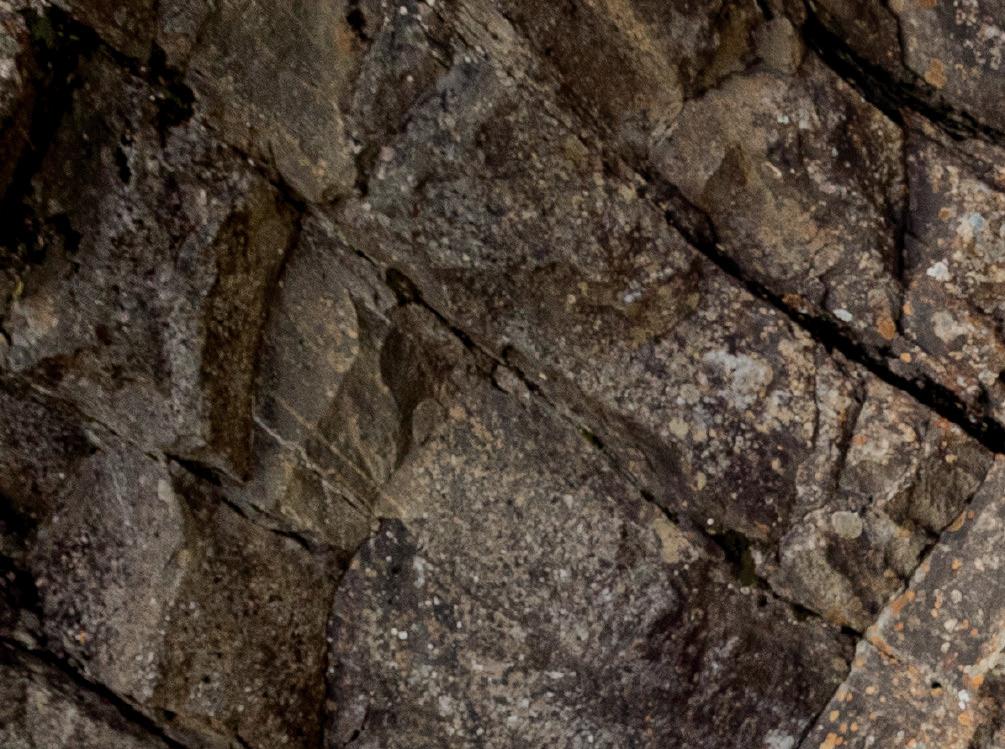
This isn’t hiking as you know it. It’s fl ying via heli into a bucket list location to amble among ancient glaciers and scale the Zillmer Canyon Via Ferrata. Free from crowds, roads and limitations, CMH Cariboos delivers an unforgettable adventure that inspires a new point of view.
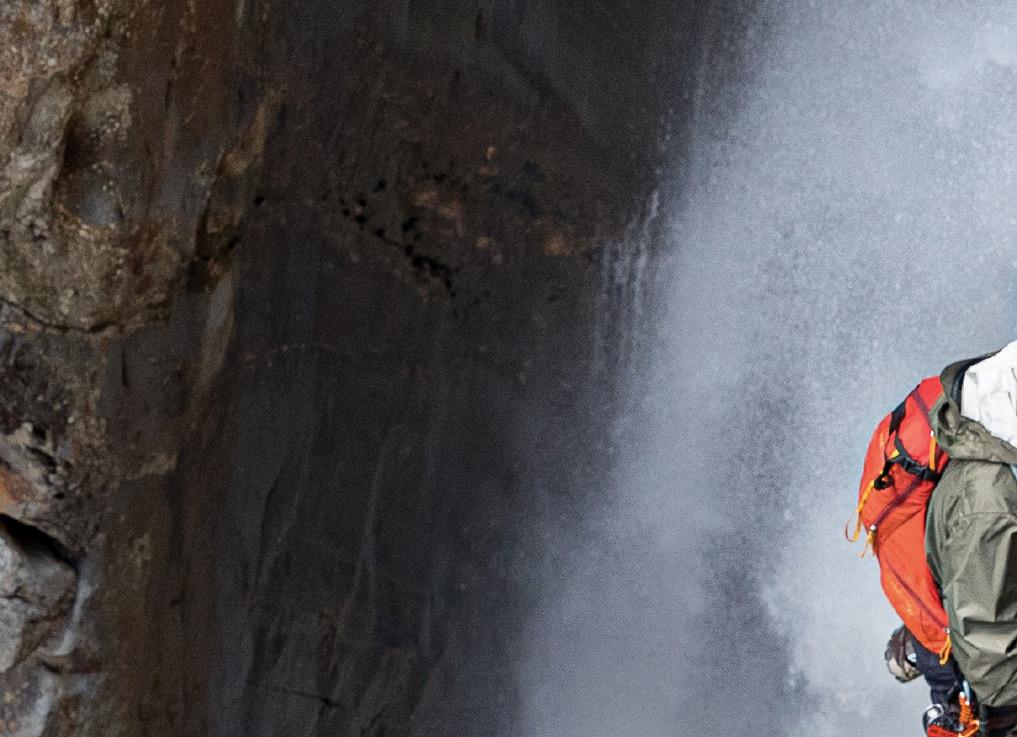
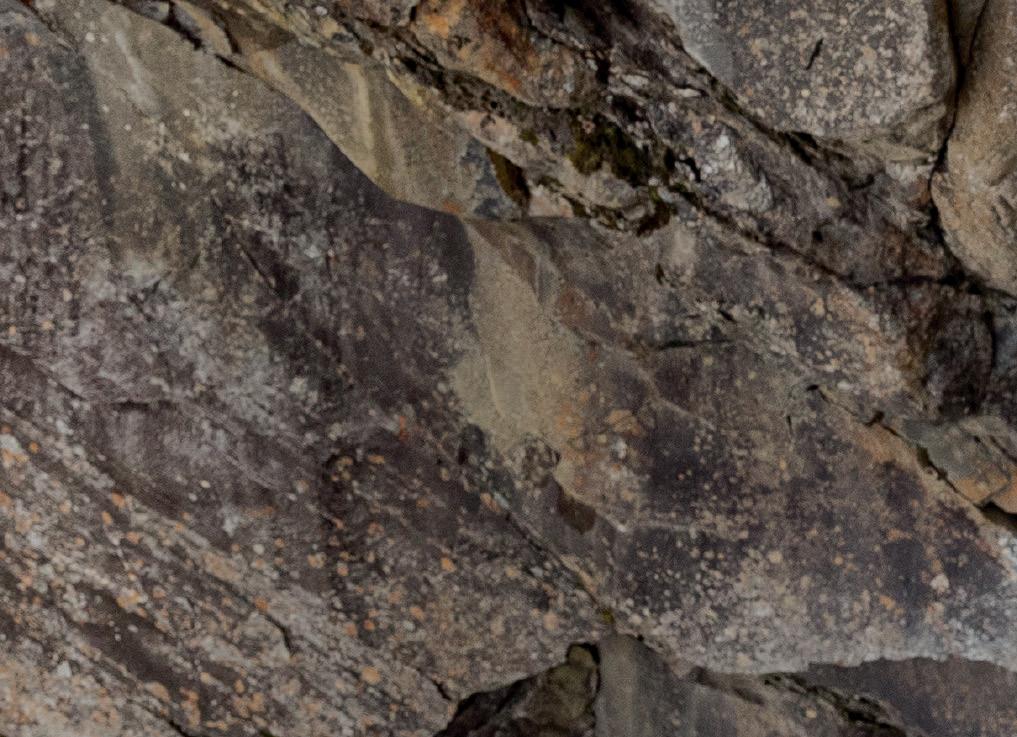

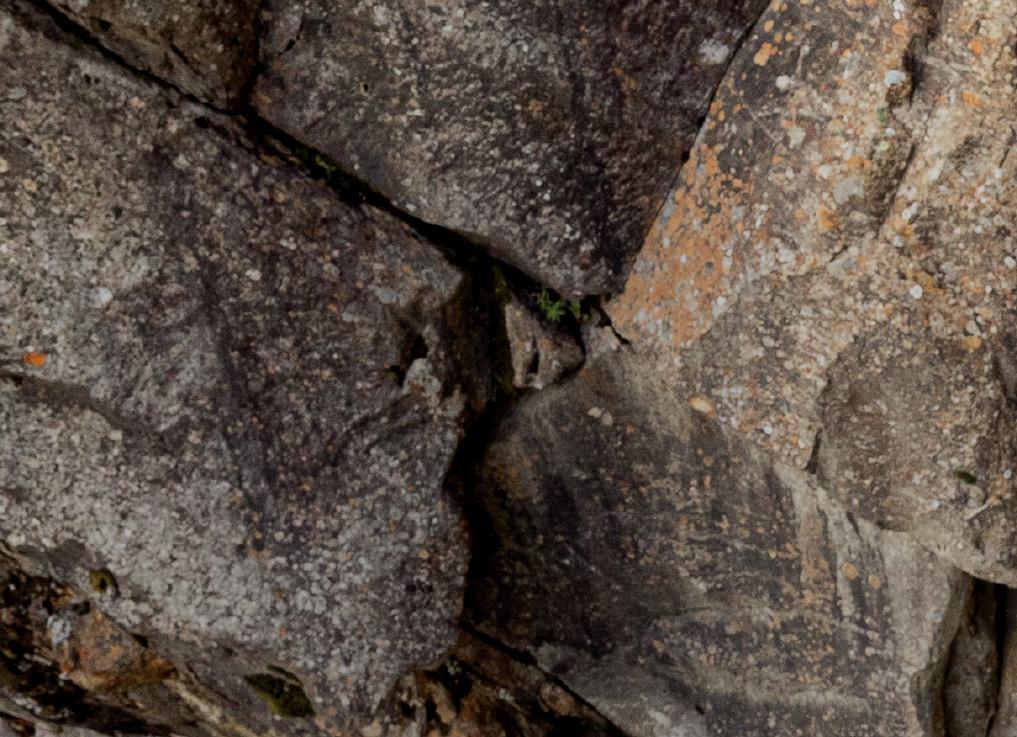
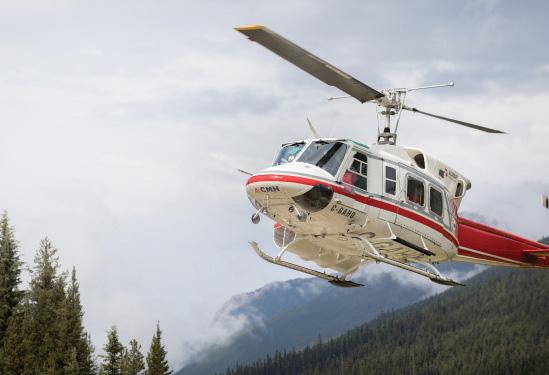
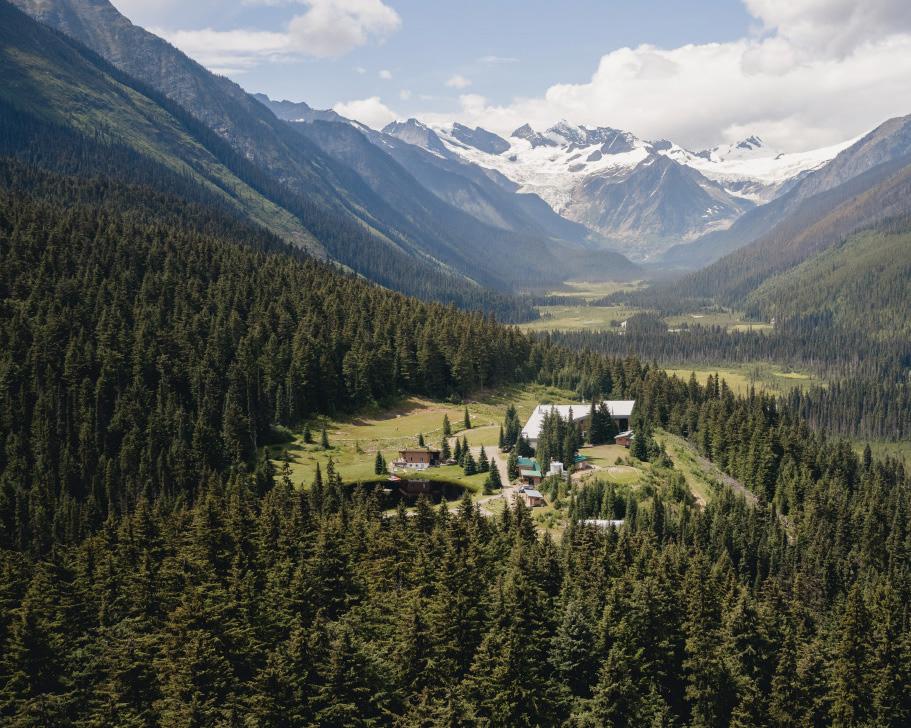

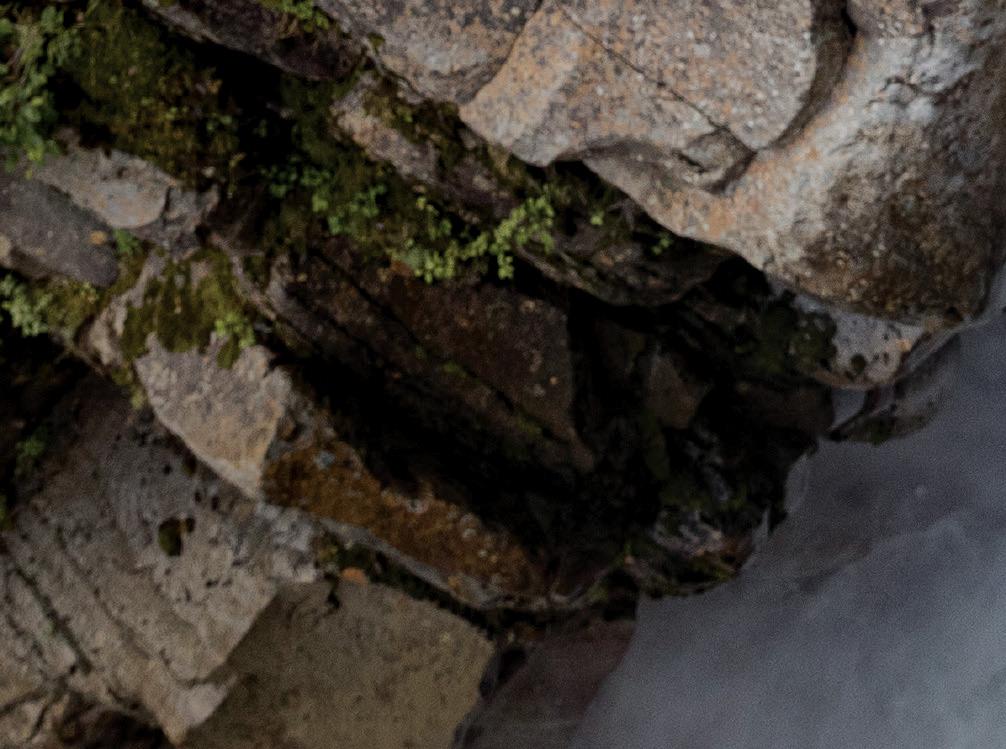
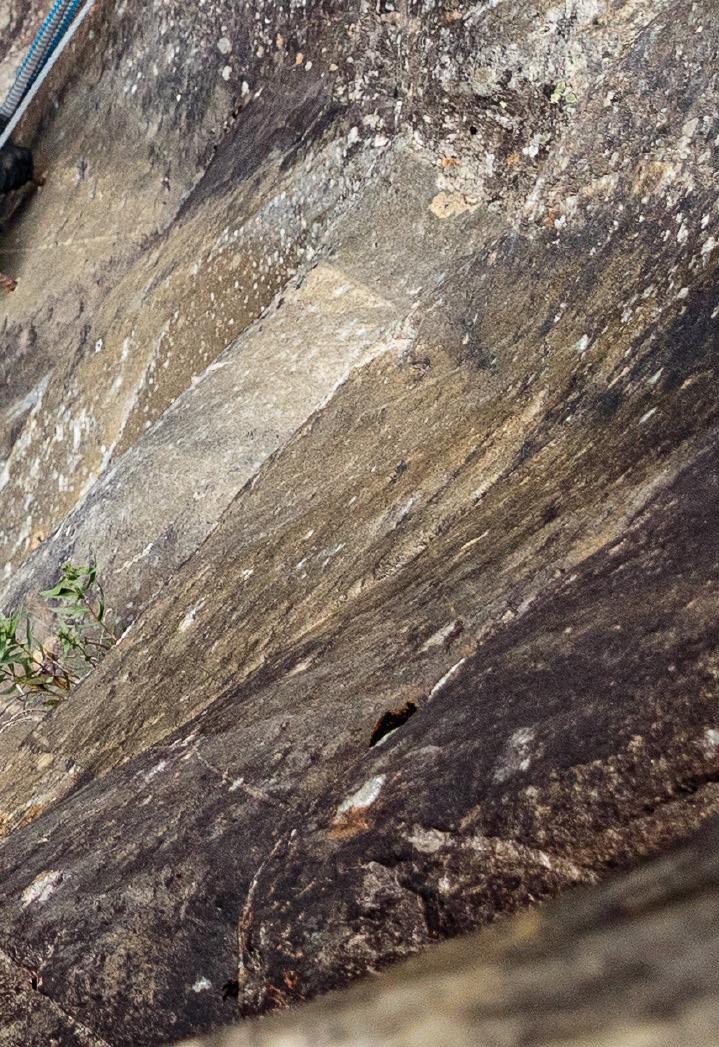
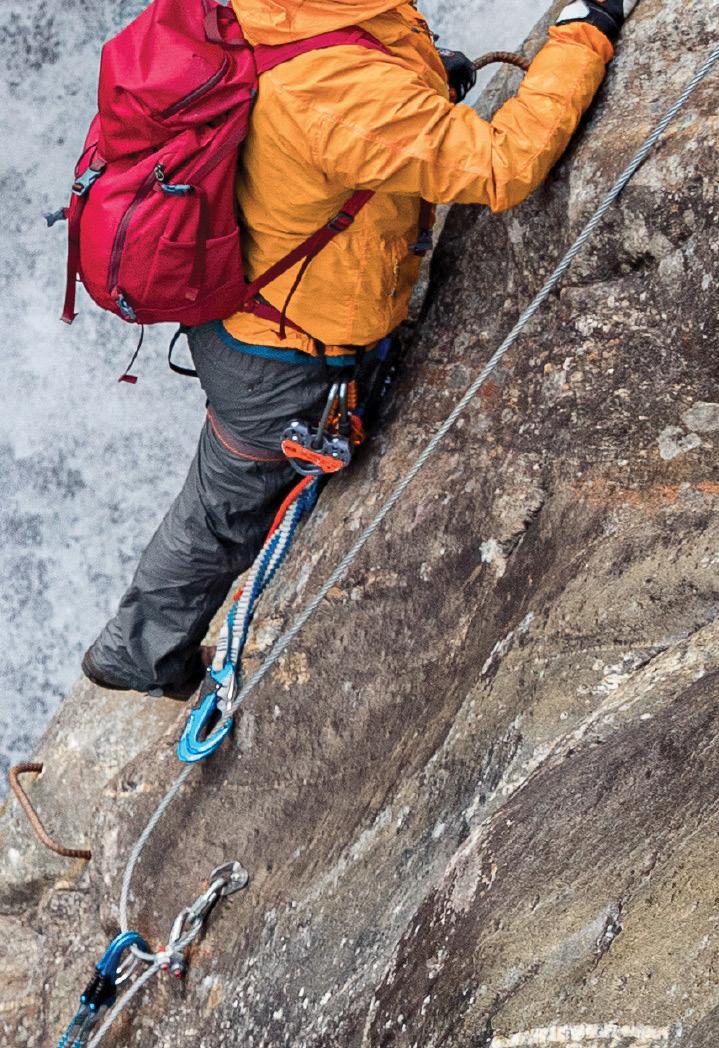
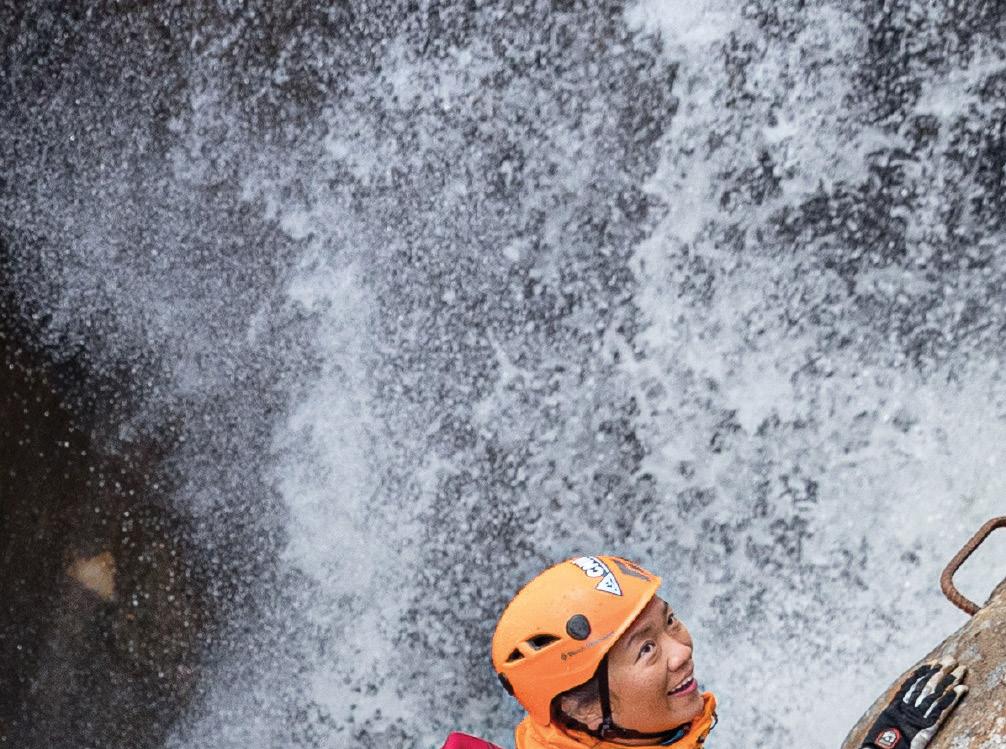
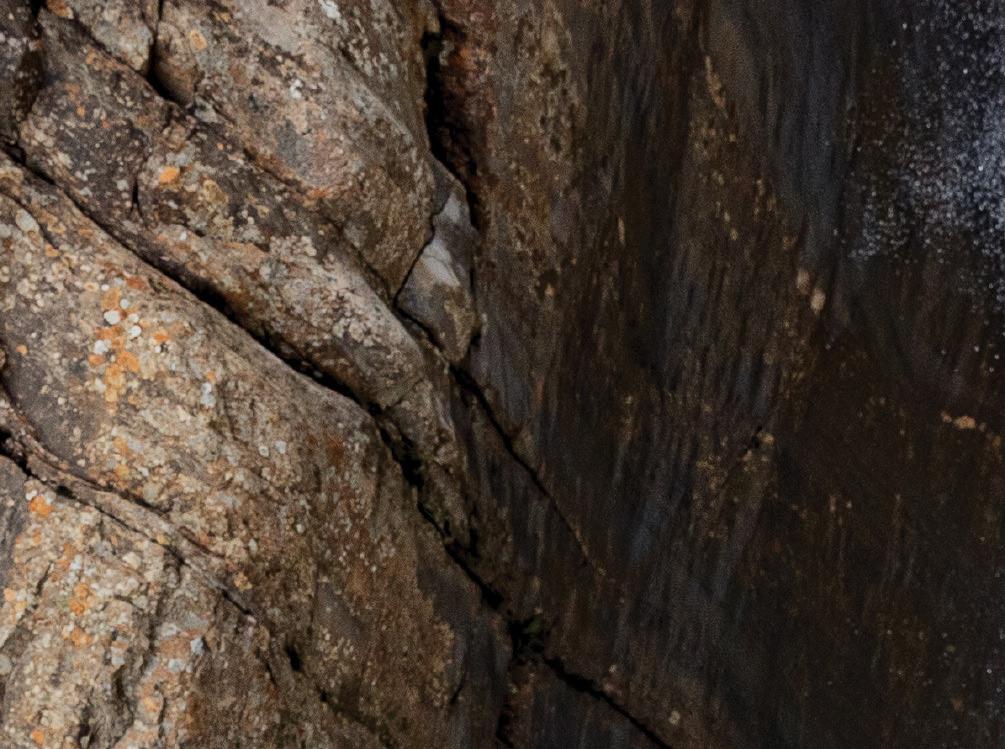

6 Editor’s Note Spring Thaw // 7 Inbox Letters, opinions & poetry // 7 Ear to the Ground News & notes from the outdoor industry // 21 Earn Your Beer Singlespeeding in San Diego // 24 EPiC Santa Cruz Mountains Challenge // 28 Events Calendar Upcoming races and events
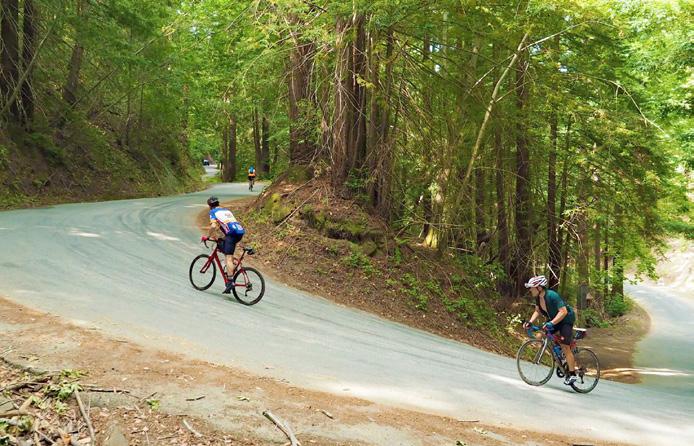
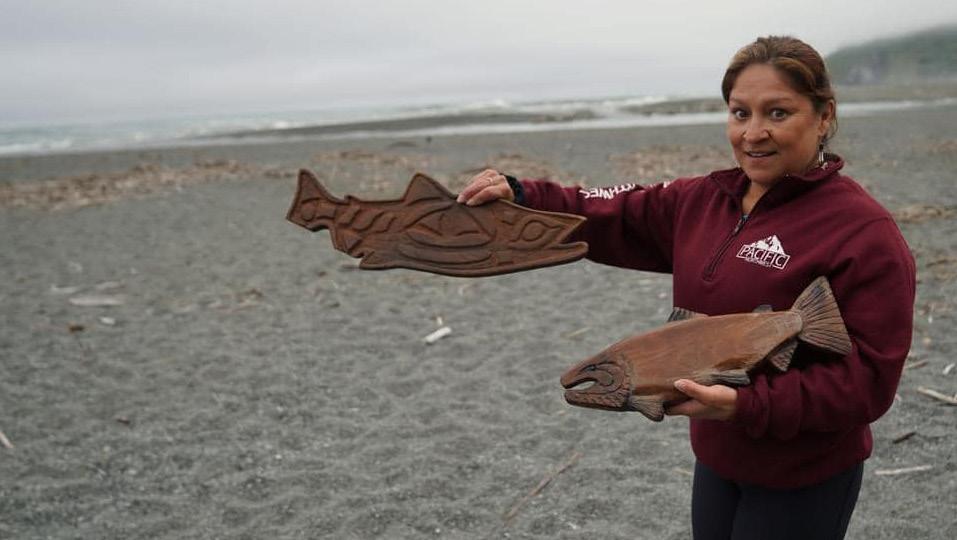
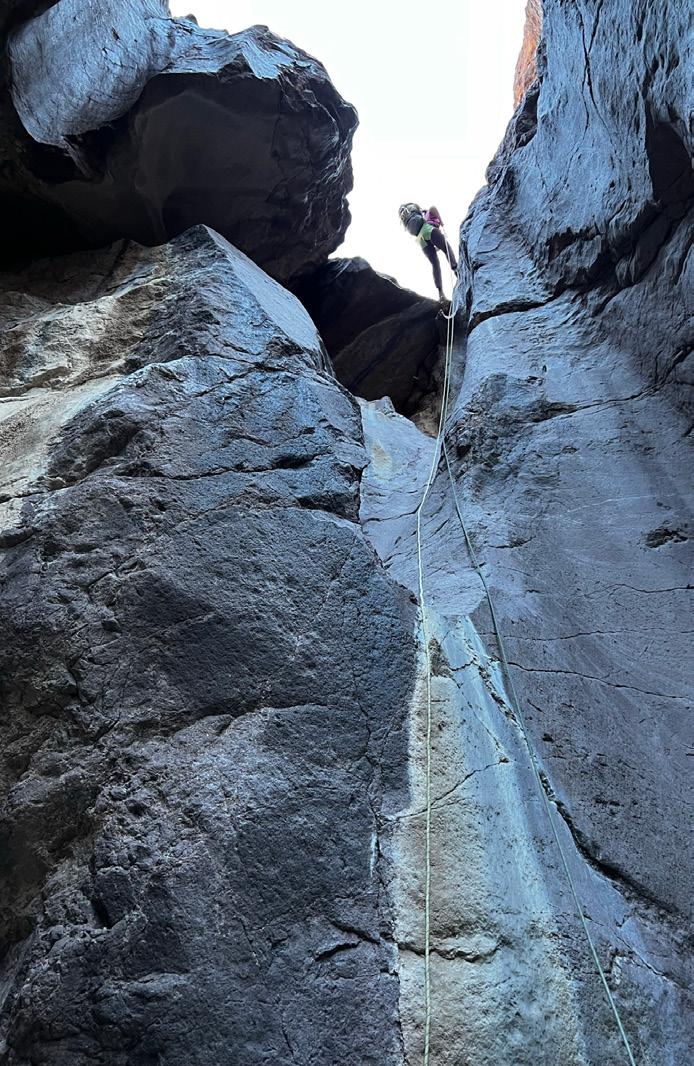


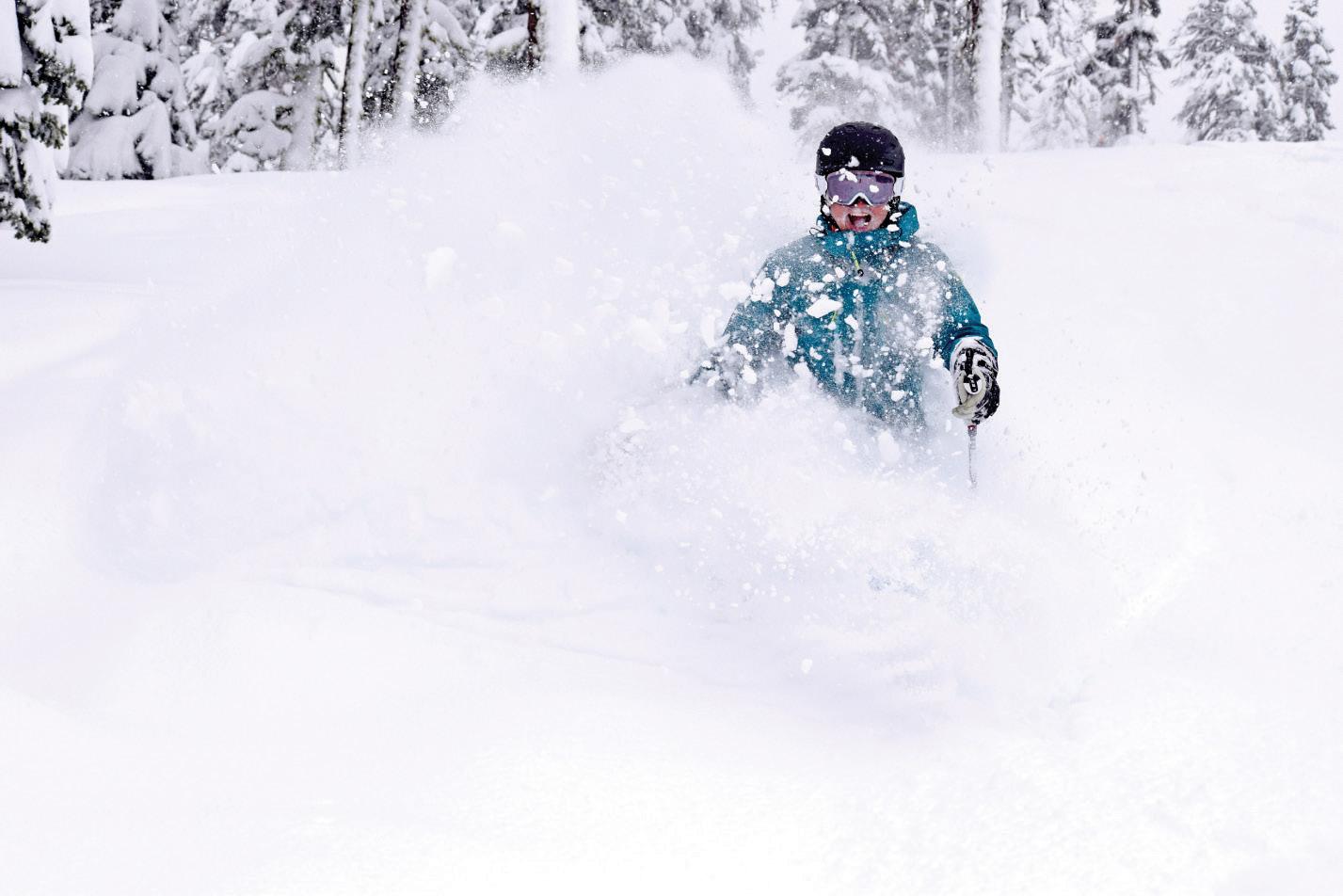
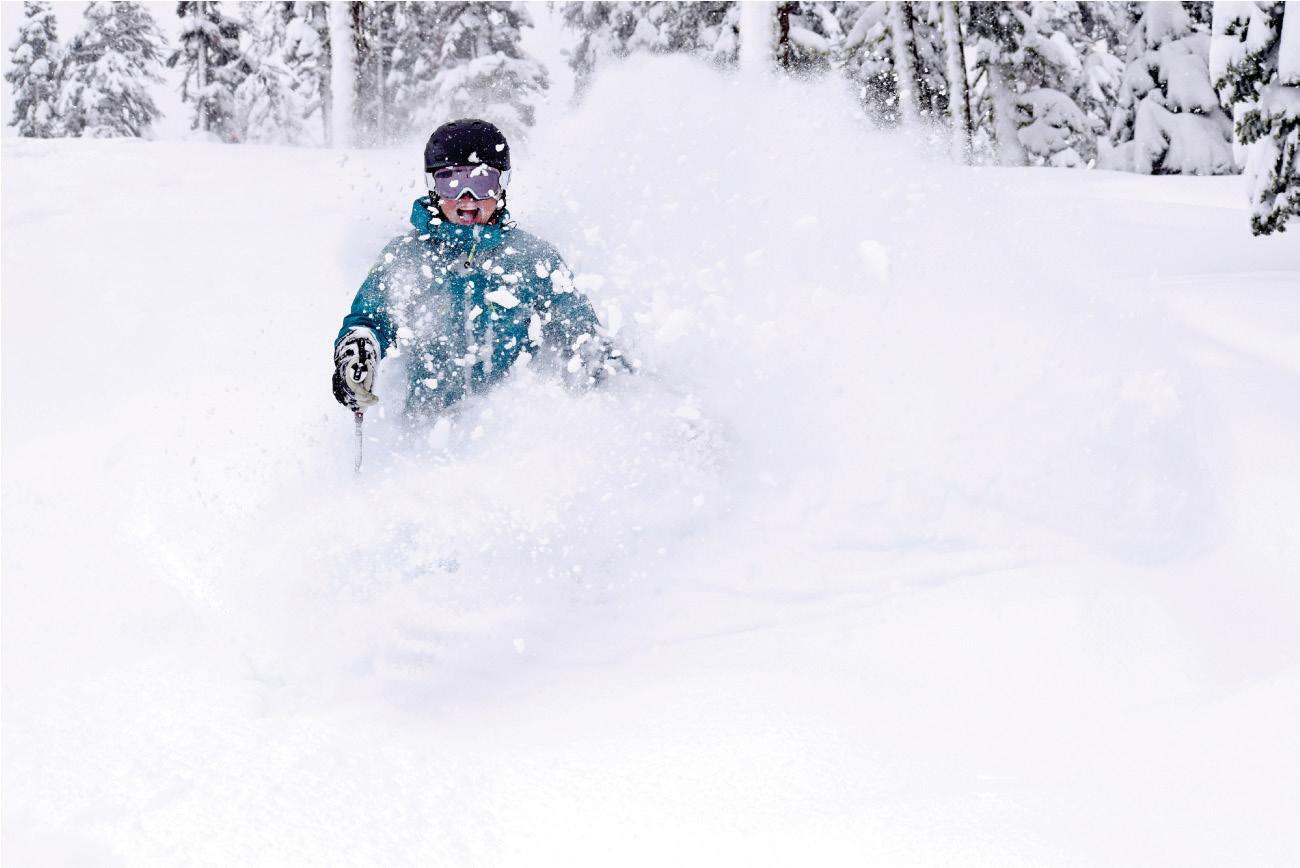
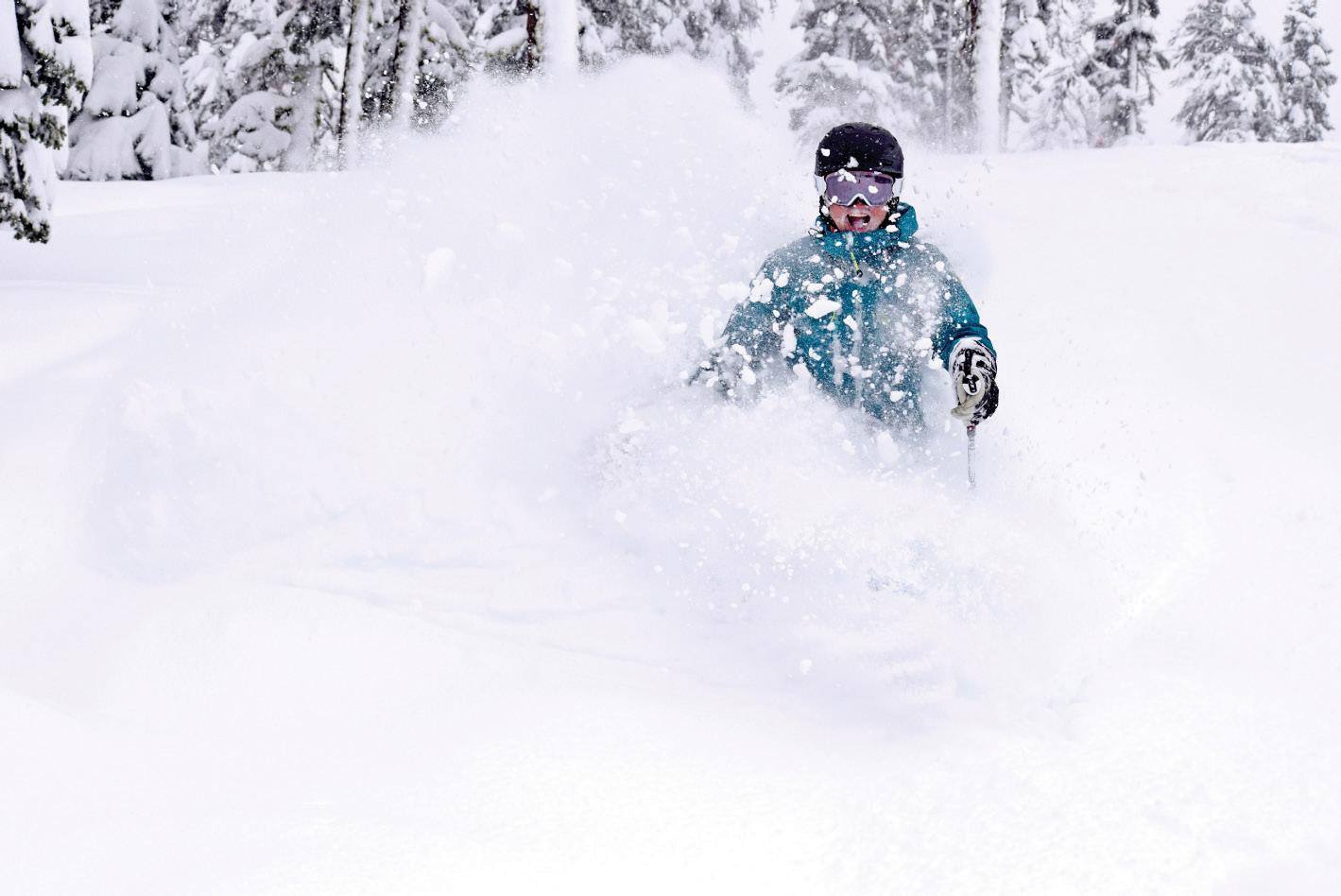
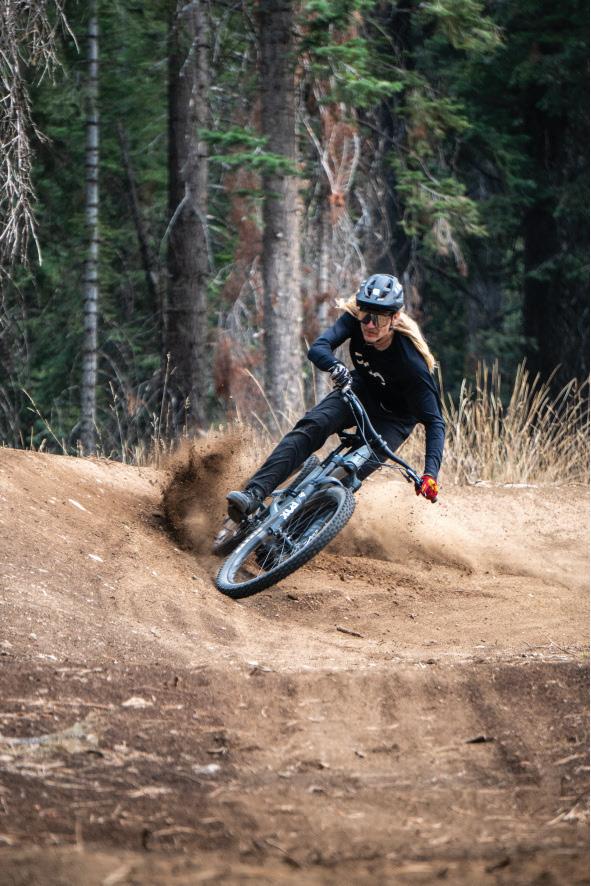


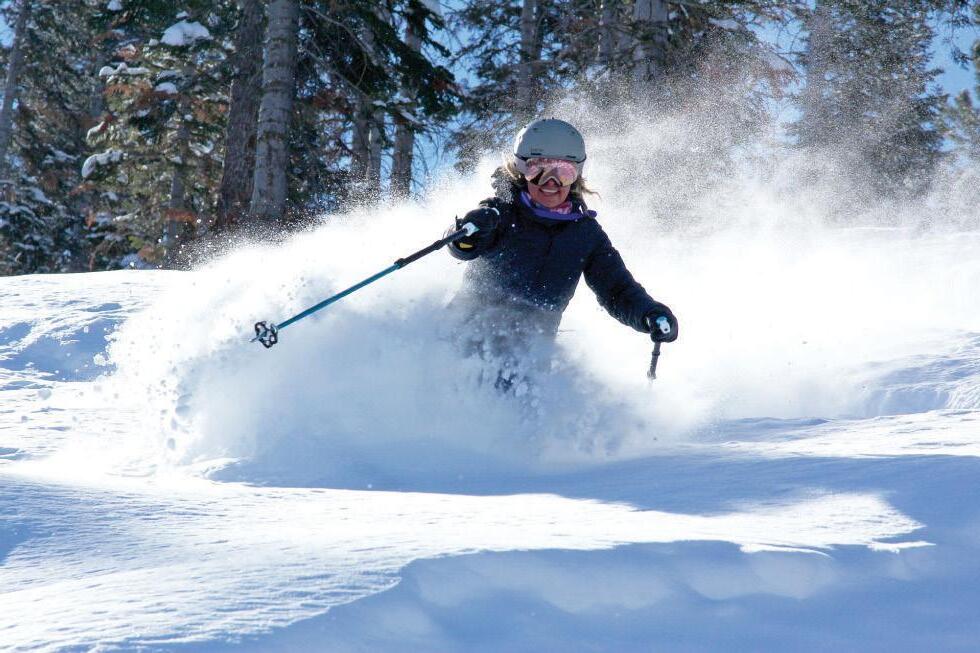
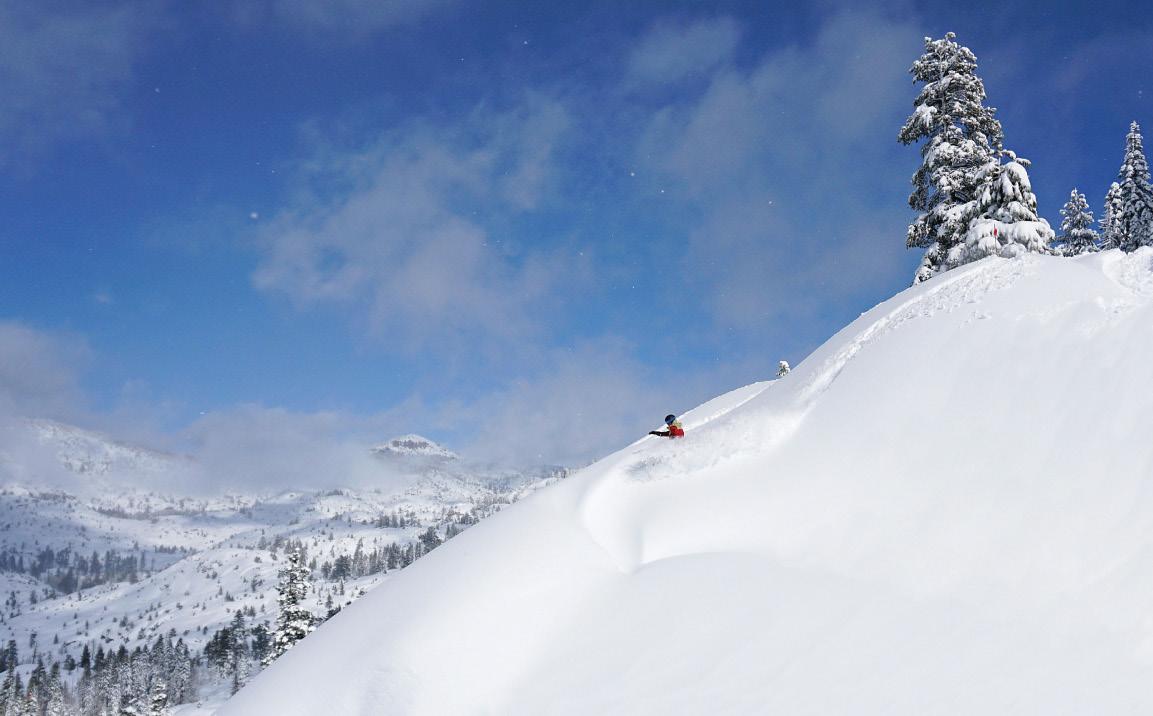
features
8 Music Festival Guide Upcoming music festivals in California and Nevada // 12 Secret Canyon Packrafting and canyoneering near Las Vegas // 14 Sierra Splendor A journey on the PCT // 16 Water Wise Expert advice for big water // 18 Klamath River Salmon Run Free the salmon // 22 Mexican Mine Trail Connecting communities via singletrack // 27 Bicycle Trip Celebrating 50 years
Photography/ Joshua Tree Music Festival;

Abby Wines; (18) Normajean Cummings; (24) Santa Cruz Mountains Challenge
ON THE COVER: Digital artist “Ricket Smash” @robot_panda, captures the essence of Spring outdoor festival season in this original cover art.
PUBLISHING + EDITORIAL
PUBLISHER
Cathy Claesson cathy@adventuresportsjournal.com
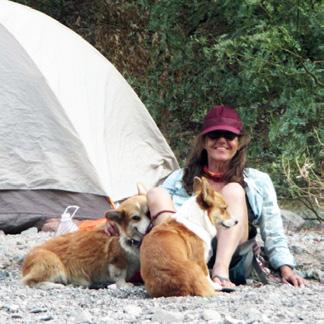
EDITOR-IN-CHIEF
Matt Niswonger matt@adventuresportsjournal.com
EDITOR
Michele Lamelin & Krista Houghton
COPY EDITOR
Jennifer Stein
CONTRIBUTING PHOTOGRAPHERS
Kris Miller, Abby Wines, Leonie Sherman, Matt Johanson, Dylan Silver/OARS, Kurt Gensheimer, Charles Wickman Mid Klamath Watershed Council, Normajean Cummings, Annelia Hillman, Karuk Tribe, Michael Wier/ CalTrout, Taylor Tupper, Mo Hollis
COVER DESIGN
Lauren Worth
EVENTS MARKETING & DISTRIBUTION

Krista Houghton krista@adventuresportsjournal.com

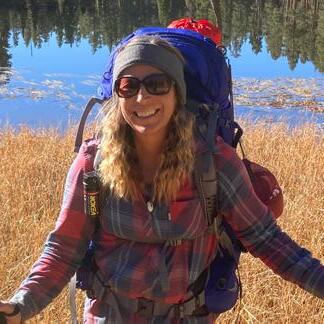
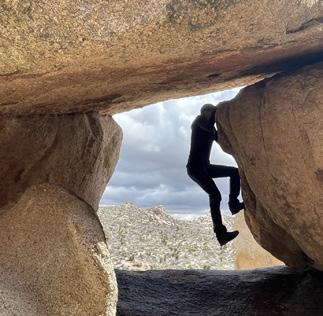
Lee Houghton lee@adventuresportsjournal.com
ADVERTISING

ACCOUNT EXECUTIVE
Cathy Claesson I 831.234.0351 cathy@adventuresportsjournal.com
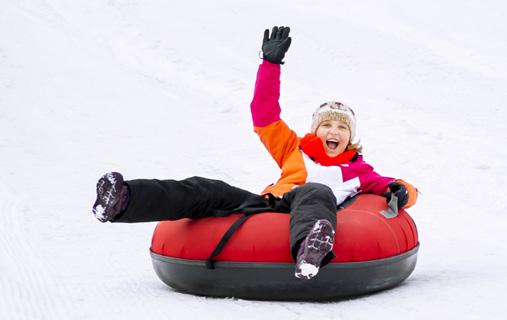
DESTINATION MARKETING MANAGER



Pamela Coffey I 619.887.9937 pamela@adventuresportsjournal.com


LAND ACKNOWLEDGEMENT
Our office resides in Aulinta (‘place of the Red Abalone’) in the larger region called Popeloutchom (‘paradise’) by the Amah Mutsun Tribe.

ADVENTURE SPORTS JOURNAL PO BOX 35, Santa Cruz, CA 95063 Phone 831.457.9453 staff@adventuresportsjournal.com
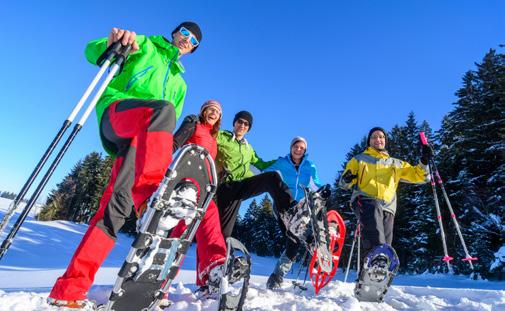
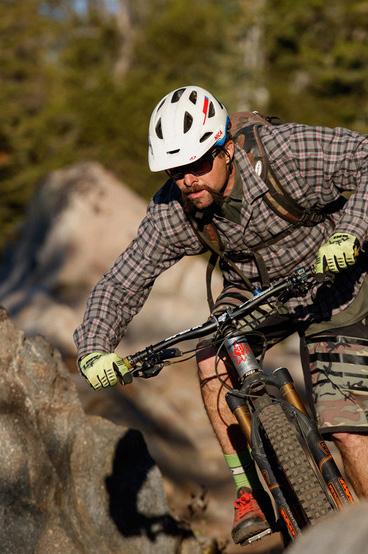
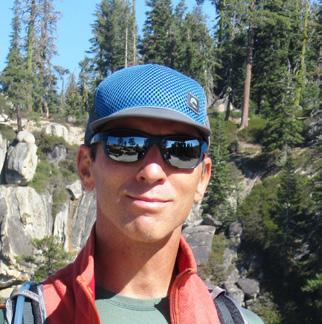

Opinions expressed are those of the authors and not necessarily those of Adventure Sports Journal or our advertisers. We usually agree with our articles, but sometimes we don’t. We welcome all contributions.
All content © Adventure Sports Journal 2023. No part of this publication may be reproduced without permission of the editors
Have these historic winter storms changed your adventure plans for spring?
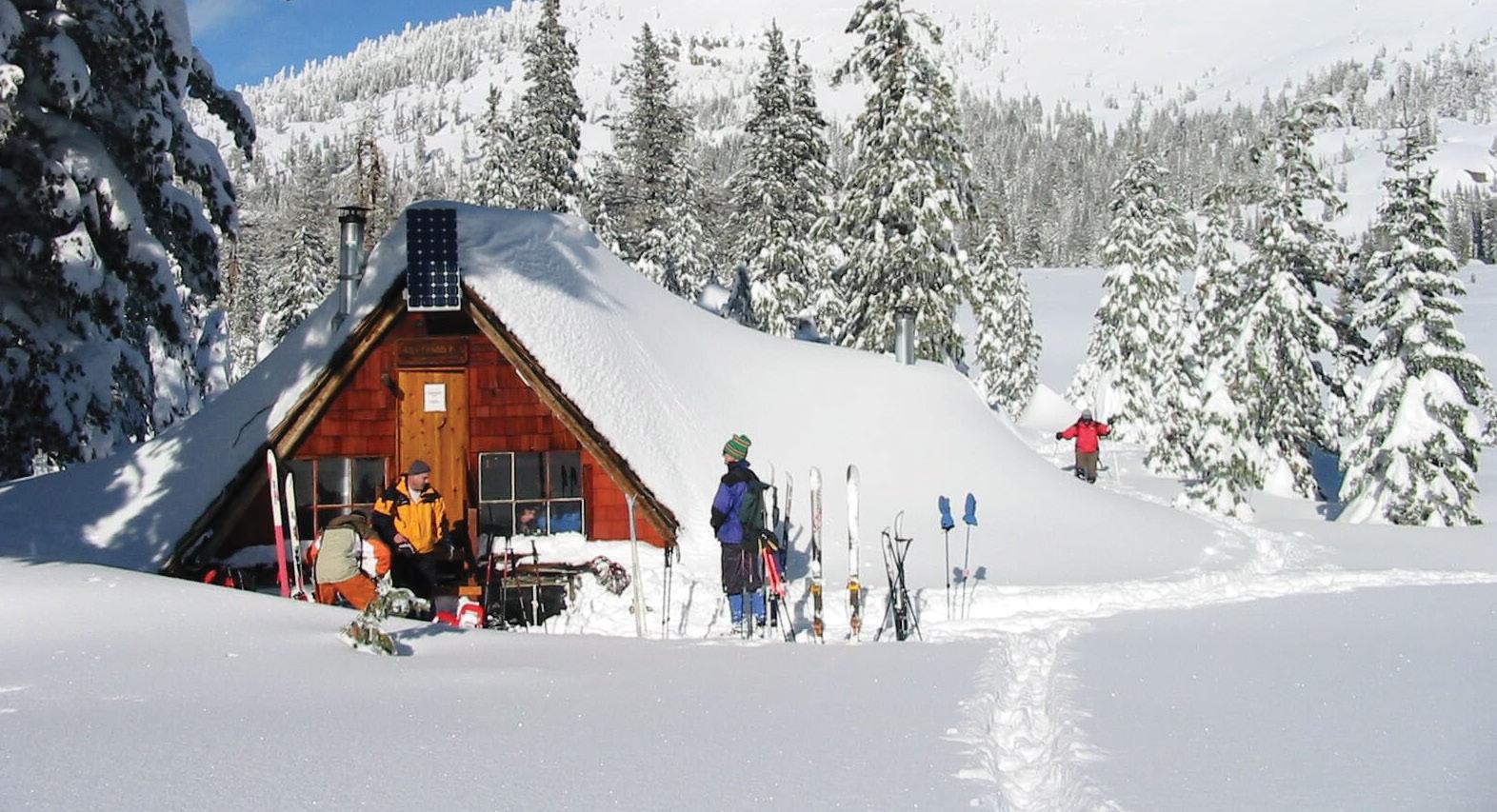
The historic storms changed everything about our lives in Santa Cruz. But this spring I’m headed to Costa Rica to teach yoga and surf for five weeks, and then Utah to canyoneer. Those plans haven’t changed.
Our big winter has complicated mountain travel, but makes water more plentiful and hiking more attractive in the desert.
I planned to introduce some beginners to whitewater in May. Due to snowpack, that’s in October now, but looking forward to warm weather multi-day trips — the Eel, maybe even the Forks of the Kern — instead.
Spring has always been one of my favorite times of year. I am excited to get out and make meaningful connections with the land and water and experience my first spring in the beautiful landscapes of the Pacific Northwest.
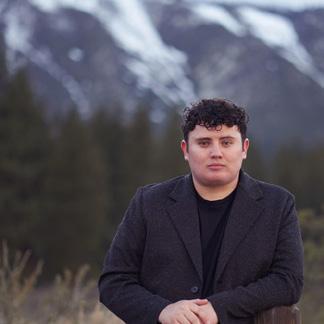
My adventure plans are always dynamic, adapting to the conditions Mother Nature provides. Having said that, there’s going to be a lot of big Eastern Sierra ski missions this spring!
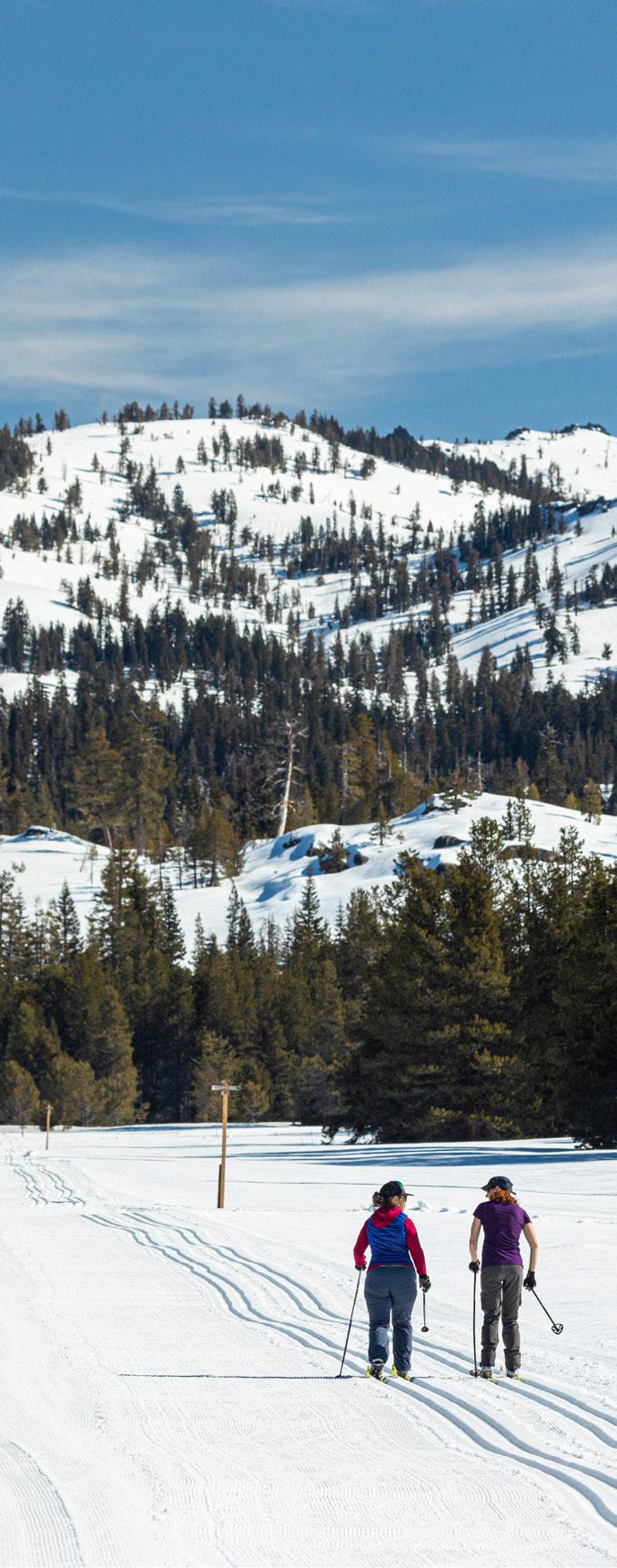
My mountain biking plans have been altered a bit. Snowshoeing in May or June could be a new experience. The desert will be greener (already is) than I’ve ever seen, which motivates me to get out and see more of it

Not yet … but depending on the snow loads we may not be able to access some trails for dig days and mountain bike races in April and May. So plan B is an overland adventure into Arizona!
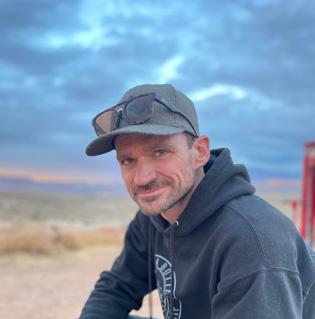
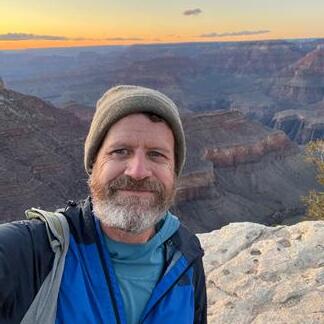
This crazy winter weather already messed with my spring plans, as yet another storm pushed me off a PCT section hike in SoCal after just 50 miles. Luckily, warm and sunny Borrego Springs was nearby, saving my spring break!
when we were struggling to make progress on a big climb in Yosemite. When things got hard and scary he always stayed positive. That’s why his passing came as such a shock. Learning about his death was the hardest part of my winter but he wouldn’t want me to dwell on it. He would want me to embrace a happier season.
Recently, I found out a close friend and former climbing partner committed suicide. We had lost touch over the years, but he was still a big part of my history. We climbed El Capitan in Yosemite together in 2000. We worked well as a team. He was one of the most caring people I’ve ever known. His name was Scott Fey.
When we launched Adventure Sports Journal back in 2001, he was at our launch party. Scott gave a toast to mark the occasion. He got teary eyed as he shared how inspired he was by ASJ. He really believed in what we were doing.
I met Scott in 1999. We were taking a big wall class together at Pacific Edge Climbing Gym. We set up a bad hauling system together and made vague plans to climb El Cap. We were both ambitious and lighthearted at the same time. When our instructor told us our hauling system was terrible, we both laughed.

When I learned of his passing, I was climbing at Pacific Edge but it was almost 25 years later. A mutual friend asked if I “heard about Scott.” A sense of dread came over me. I knew she was going to say Scott was dead. I could see the pain in her eyes.
That was a couple weeks ago. I’m still struggling to come to grips with it. I feel guilty because I let my friend slip away. Clearly I wasn’t there for him in his time of need.
I have a bunch of unresolved feelings about Scott. Learning about him was my “winter moment.” It was like I was in denial about how hard this winter has been. Then I heard about Scott and I saw the whole thing in context. This has a been a hard fucking winter. For a few days after I learned about Scott I felt numb.
An old saying in Buddhism goes, “You can’t step in the same river twice.” The point of this teaching is impermanence.
We are all in a state of transition. Every season gives way to the next season. At the end of it all lies the mystery of death. Life is a journey that comes to an end for all of us. That’s what makes it so precious.
I’m not saying this winter has been all bad. In between the storms, my friends in the Tahoe area are enjoying the most snow in decades. I’m just saying it’s been particularly long, dark, wet, and heavy.
But now change is in the air. Spring is coming and I’ve got a sneaking suspicion it’s going to be outrageously green, buoyant, and beautiful. Fun is on the horizon. A hard winter is giving way to a wonderful spring. It’s almost time to dust off the mountain bike and hiking shoes.
I know Scott would want me to embrace spring. When it came to climbing he was always my greatest cheerleader. He was at his best when
I survived this winter by meditating and going to the climbing gym. Now the sun is shining. I can dwell on winter or I can embrace spring. I’ve already made my choice. How about you?
Welcome to spring 2023. In this issue we embrace a new season and mark the passing of a long hard winter. We can’t pretend it’s been easy but we can say we are ready for whatever comes next. Whatever fun lies ahead is well deserved.
RIP Scott Maurice Fey. 1968-2022 — Matt Niswonger matt@adventuresportsjournal.comIf you or someone you know is considering suicide, call The National Suicide Prevention Lifeline at 9-8-8. The Lifeline is free, confidential, and always available.
Please consider helping us continue our work by becoming a member today.

With your support we can continue to inspire adventure, event participation, exploration and environmental stewardship.
— Matt Niswonger & Cathy ClaessonFrom record snowfall and collapsing roofs to coastal flooding and broken levees, this winter has pushed us to the brink. Long winters take a toll on the emotions. This can lead to exhaustion, and the inability to function well. Pretty soon your productivity grinds to zero. Nothing gets done and life feels overwhelming.
After almost ten years, we would like to bring back our Switchback section, where we get to hear the opinions of our readers. This issue’s question is: Should California residents be given priority for reservations within California State and National Parks?
So far — 92% say YES and 8% NO
Go to adventuresportsjournal.com/ switchback-camp-reservations and let us know what you think. Some answers will be shared in the the next print edition.
The Ultralight Hiker Reconsideers for David
I packed with care, considered every ounce of food and drink.
I honed my needs so sharp I cut straps from my pack and tags from my clothes.
I was eager to move with ease. I was eager to walk less burdened.
So when a man strode up-meadow in full sweat mid-storm, I judged what he had packed: the loaf of bread, the full bottle of bourbon, the unknown quantity of grief. Strong men, I’ve noticed, carry far more than they need.
But a small, sweet fire bloomed at that first pull of liquor, mixed with my hot-chocolate rations. We warmed. We wedged words into hail, we stuffed the thunder full of laughter.
The next morning we learned the strength in each other’s strides. How to trust: I can carry my weight. You can carry your weight.
Our best steps moved us first over one mountain, then another.
Now I ask: what love would choose to carry only its own burdens?
I have honed my needs sharp and I know them. Here’s what I brought—
and here’s what we, together, walked into being.
— Talley Kaser, Reno, NVCongratulations to Talley Kaser. You have won $100 and a bottle of wine of your choice from Mantra Wines. mantrawines.com
ASJ poets, submit your poetry for a chance to get published and win money and wine.
Email poems@ adventuresportsjournal .com
Nevada Senate Bill 391 seeks to amend previous SB 88 and greatly curtail the use of the Minden siren to holidays and emergencies only. SB 391 is expected to pass given the widespread support to stop the Minden siren. As we go to press, a passionate crowd gathered in Carson City, Nevada to support SB 391 to stop the Minden siren.
From 1917 to 1974, Minden Nevada was a “Sundown Town” meaning only white people were allowed to stay in town after dark. The Minden siren was used to warn Native Americans to leave town by sunset. After the repeal of the sundown ordinance in 1974, the same siren used to enforce the law was still used in a ceremonial manner.
All are welcome to a gathering on May 28 at Minden Park at 10:30 am in Minden, Nevada. People will hear from speakers and make their voices heard in opposing the continued use of the Minden “Sundown” siren. After listening to the noon siren we will bow our heads and remember the generations of Washoe Tribal members who were forced to suffer through the era of sundown ordinances in the Carson Valley. Afterwards, a group of walkers will gather in Genoa at the Sierra Canyon trailhead. This walk will be a fundraiser for Washoe youth outdoor participation. For more information email matt@adventuresportsjournal.com.
The Lower Klamath Hydropower Project, which comprises four dams, is finally being removed after years of campaigning by local tribes and conservation organizations. The project aims to restore the Klamath River to a natural free-flowing condition and support the recovery of Pacific salmon. The Klamath River Renewal Corporation (KRRC), which is overseeing the project, has started the preliminary work, including upgrading bridges and constructing new roads to access the dam sites easily. The project has received funding from PacifiCorp and a California Water Bond, and the removal of all four dams is expected to be completed by the end of 2024. Learn more about the dam removals in our story on the Klamath River Salmon Run on page 18.
Ski resorts across California have extended their season, with some resorts staying open late into the summer months due to historic winter snowfall. Many locations in the Sierra Nevada range have now accumulated record snowfall this season, with Mammoth Mountain having its snowiest season ever,
receiving 704 inches. The resort plans to keep its slopes open until the end of July, having extended the skiing season for an additional two months. Other resorts are also extending their seasons, such as Palisades Tahoe ski area, which will stay open through July 4. While the wild winter has delighted skiers and stretched the season, it has come with a cost, with staff members required to work long hours to remove excessive amounts of snow daily. Resorts also had many days with limited to no operations due to record snow conditions.
Due to the extraordinary amount of snowfall this winter events like Groveland Grind and China Peak Enduro have announced new dates for their events. For events like Groveland Grind, this is an opportunity to get more riders to participate in this year’s event. The Groveland Grind is a fundraiser to develop a mountain bike specific singletrack trail system just outside of Yosemite. The new date for the Groveland Grind is June 24. See their ad on page 31 for more information. The China Peak Enduro, on the other hand, sold out right away and is typically one of the first events in the California Enduro Series (CES). Their new event date is set for September 2 and will be the second to last of their six race series. See the CES ad on page 32, and keep an eye out for other event date changes this spring and summer season.
The US Department of Commerce has announced its plan to initiate the process of designating all US waters around the Pacific Remote Islands as a national marine sanctuary, following President Biden’s call to action at the White House Conservation in Action Summit this past March.
The Pacific Remote Islands Coalition nominated an area totaling around 770,000 square miles for sanctuary designation. The sanctuary would provide additional protection for the region’s important marine ecosystems, maritime heritage resources, and support the cultural heritage and values of Native Hawaiian and Pacific Islander communities. The proposed sanctuary would recognize the importance of Indigenous knowledge and cultural connections between lands and people, and celebrate distinct cultures.
The Yosemite Climbing Museum in Mariposa is excited to celebrate its one year anniversary this April, with a
Yosemite Facelift clean-up of Mariposa on April 22. The clean-up will be followed by a party and raffle at the museum. The Yosemite Climbing Museum has become a popular destination for those interested in learning about the rich history of climbing in Yosemite National Park.
Since opening its doors last year, the museum has welcomed thousands of visitors. The exhibits include artifacts and memorabilia from some of the most legendary climbers to have climbed in Yosemite, including Yvon Chouinard, Royal Robbins, Lynn Hill, and Alex Honnold. The museum has also become a hub for the climbing community, providing a space for climbers to connect with one another, share stories and experiences, and learn from each other. For more information about the museum and its one year anniversary events, visit their website at yosemiteclimbingmuseum.org.
The state of California has announced the temporary closure of crucial Dungeness crab fishing zones during an already shortened season due to the expected arrival of humpback whales in feeding areas off the California coast. The restrictions will be in place from north of San Francisco to the US-Mexico border. The closure, effective from noon on April 15, is to minimize entanglement risk for humpback whales as they return to forage in the area, and is a response to several entanglements that occurred during March and April 2022. Fishing zones 1 through 6 are under a fleet advisory for both commercial and recreational Dungeness crab fishing. The recreational fishery remains open to crab traps north of Point Arguello, Santa Barbara County, but may be subject to a future trap restriction when humpback whales return to forage during the spring and summer.
As winter comes to an end in the Lake Tahoe region, black bears that have been hibernating will soon emerge in search of food. However, this year, they may face challenges as heavy snowfall may force them to search for easier routes, such as roads and trails, bringing them into urban areas. To prevent bears from accessing human food and garbage, residents and visitors are advised to clean up bear attractants, take down bird feeders, dispose of garbage properly, and keep doors and windows locked. Bears play a vital role in the ecosystem by spreading seeds, transporting pollen, and cleaning up dead animals. If you see a bear that looks unhealthy, sick, or orphaned, call state agency wildlife experts. Good habits will help keep Tahoe bears wild and ensure a healthy ecosystem.
Immerse yourself in California and Nevada’s diverse music scene with our guide to our region’s top music festivals. From indie to rock, hip-hop to electronic, and everything in between, there's a festival for every music lover. Not only that, these festivals will take you to stunning locations – from the rugged coastline to sweeping deserts and towering mountains. So whether you’re looking for a weekend of camping under the stars or a luxurious stay in a five-star hotel, our guide will help you discover the perfect festival and destination for you.
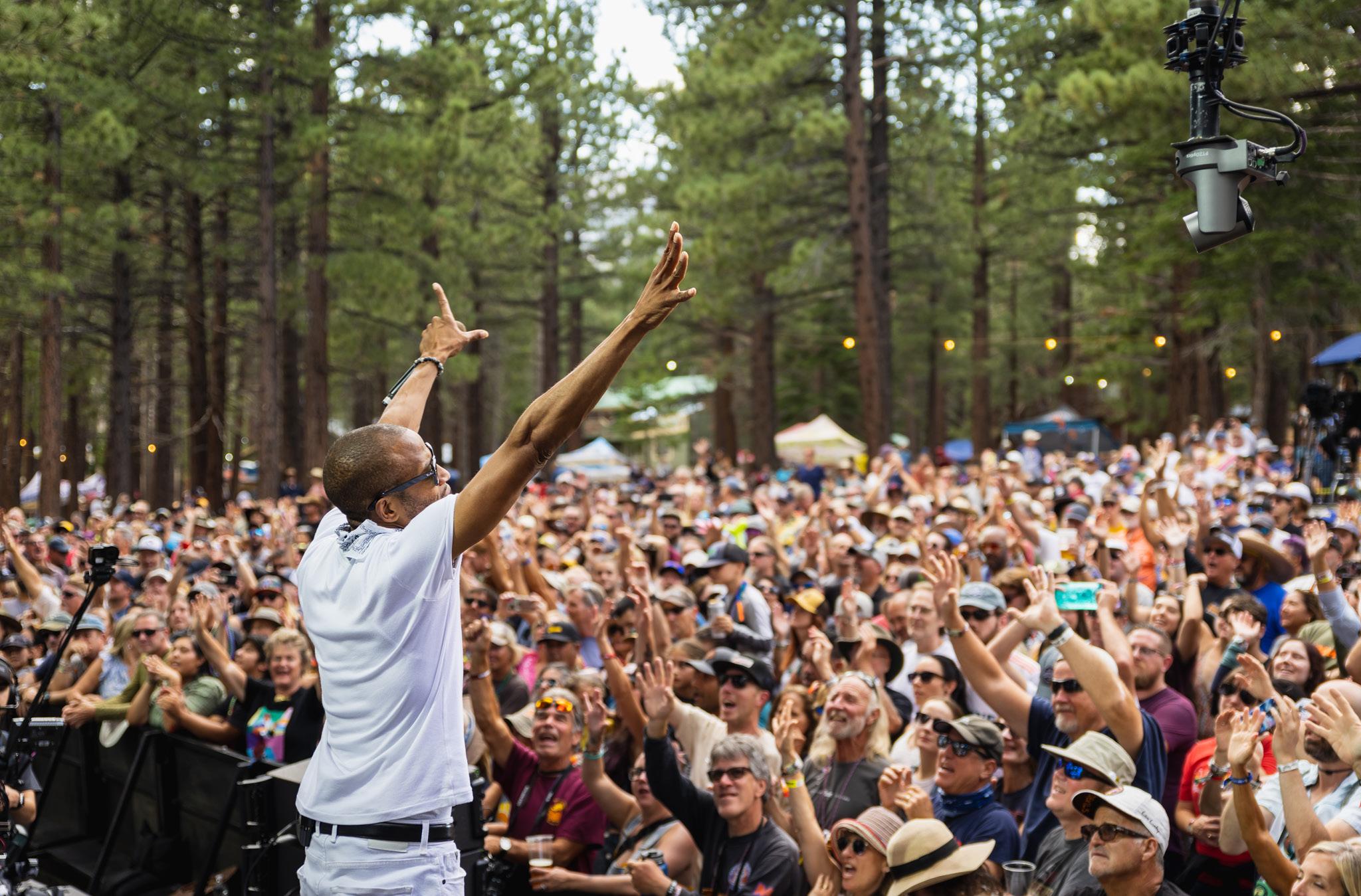
Lucidity Festival
Santa Barbara
April 7-9
J 10th anniversary! Multi-generational, all genres of music, family friendly, art, food, and community vibes. lucidityfestival.com
Coachella
Indio
April 14-16 & 21-23
J One of the largest music and art festivals in the US. Held over two weekends, with the same line up both weekends. coachella.com
Day Club Palm Springs
Palm Springs
April 15-16 & 22-23
J Poolside musical madness offering a chance to catch some of dance music’s top talents up close and personal. dayclub.ps
Skull & Roses
Ventura
April 19-23
J Exploring unique interpretations of Grateful Dead music. skullandroses.com
420 Hippie Hill
San Francisco
April 20
J The biggest FREE cannabis event in California! 420hippiehill.com
Stagecoach Country Music Festival
Indio
April 28-30
J Bringing some country to California. Kids 10 & under are free. stagecoachfestival.com
Sol Blume
Sacramento
April 29-30
J A celebration of R&B, soul, and hip-hop together with an underlying emphasis on art, love, and good vibes. solblume.com
BeachLife Festival
Redondo Beach
May 5-7
J Fifty+ bands, four stages, all ages, on the sands of beautiful Redondo Beach. thebeachlifefestival.com
Desert Hearts
Lake Perris
May 5-8
J A DIY party crew that fosters a community of house, techno and love. festival.deserthearts.us
Lovers and Friends Festival
Las Vegas, NV
May 6
J A nostalgic delight for fans of R&B and hip hop from the ‘90s and beyond. loversandfriendsfest.com
Holo Holo Music Festival
Las Vegas, NV
May 6-7
J Celebrating the music, food, and culture of Hawaii, this is a fun event for everyone. holoholofestival.com
The All Day I Dream Festival
Oakdale
May 11-14
J A boutique feel-good festival in nature with electronic, house and techno music that helps create a magical experience. thealldayidreamfestival.com
The Golden Road Gathering
Placerville
May 12-14
J A multi-day outdoor music gathering focused on bringing live funk and soul music to the El Dorado County Fair and Event Center. goldenroadgathering.com
The Untz Festival
Browns Valley
May 12-14
J Dedicated to spotlighting underground artists who are changing the electronic music landscape. theuntzfestival.com
Just Like Heaven
Pasadena
May 13
J Ascend to the heights of indie rock nirvana. justlikeheavenfest.com
Palm Tree Music Festival
Dana Point
May 13
J An intimate festival experience, bringing the dream of the tropics to lush locations around the world. palmtreemusicfestival.com
Sick New World Festival
Las Vegas, NV
May 13
J Featuring over 50 hard rock, nu metal, and multi-genre artists. sicknewworldfest.com

Mill Valley Music Festival

Mill Valley

May 13-14
J Outdoor arts and culture event featuring a multi-genre mix of diverse acts, coupled with food, drink and art. millvalleymusicfest.com
Joshua Tree Music Festival (Spring)

Joshua Tree
May 18-21
J Phenomenal live music, community, family friendly, yoga, art, workshops and more. joshuatreemusicfestival.com
EDC
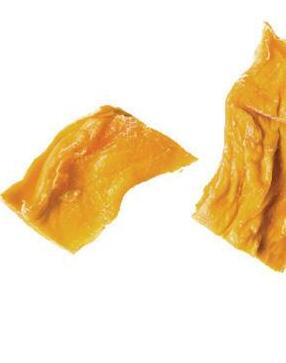
Las Vegas, NV
May 19-21
J The world’s largest dance music festival returns to welcome 500,000 attendees. lasvegas.electricdaisycarnival.com
Cruel World Pasadena
May 20


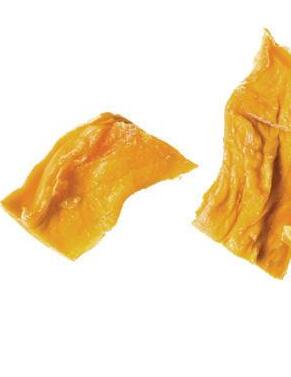



J New wave and punk legends like Siouxsie and Iggy Pop are on the bill. cruelworldfest.com
Lightning in a Bottle
Buena Vista Lake
May 24-29
Artists showcase their unique crafts within creative stages built for immersion and wonder. lightninginabottle.org
California Roots Festival
Monterey
May 25-28
J One of the largest reggae festivals in the country. Good vibes, happiness, family, peace, & love. californiarootsfestival.com
Strawberry Music Festival






Grass Valley
May 24-29
J Adding one more night this year, making it a five night festival of eclectic Americana music and family friendly festivities. strawberrymusic.com
Bottlerock Napa Valley

Napa

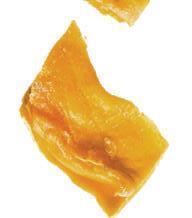
May 26-28
J Celebrating its 10th anniversary. Pairing today’s biggest names in music with wine, food and craft brews. bottlerocknapavalley.com
Punk Rock Bowling

Las Vegas, NV
May 26-29
J Combining mankind’s three greatest creations – punk rock, bowling, and Las Vegas! punkrockbowling.com
I Love RNB Festival
Long Beach
May 27
J The biggest and best lineup of your favorite RnB performing artists, from classics to new hits. ilovernb.com
Schellraiser Music Festival
McGill, NV

June 1-3
J An outdoor micro-festival with an eclectic, 35-band lineup in a spectacular high desert setting. schellraiser.com



Newport Beach Jazz Festival
Newport Beach
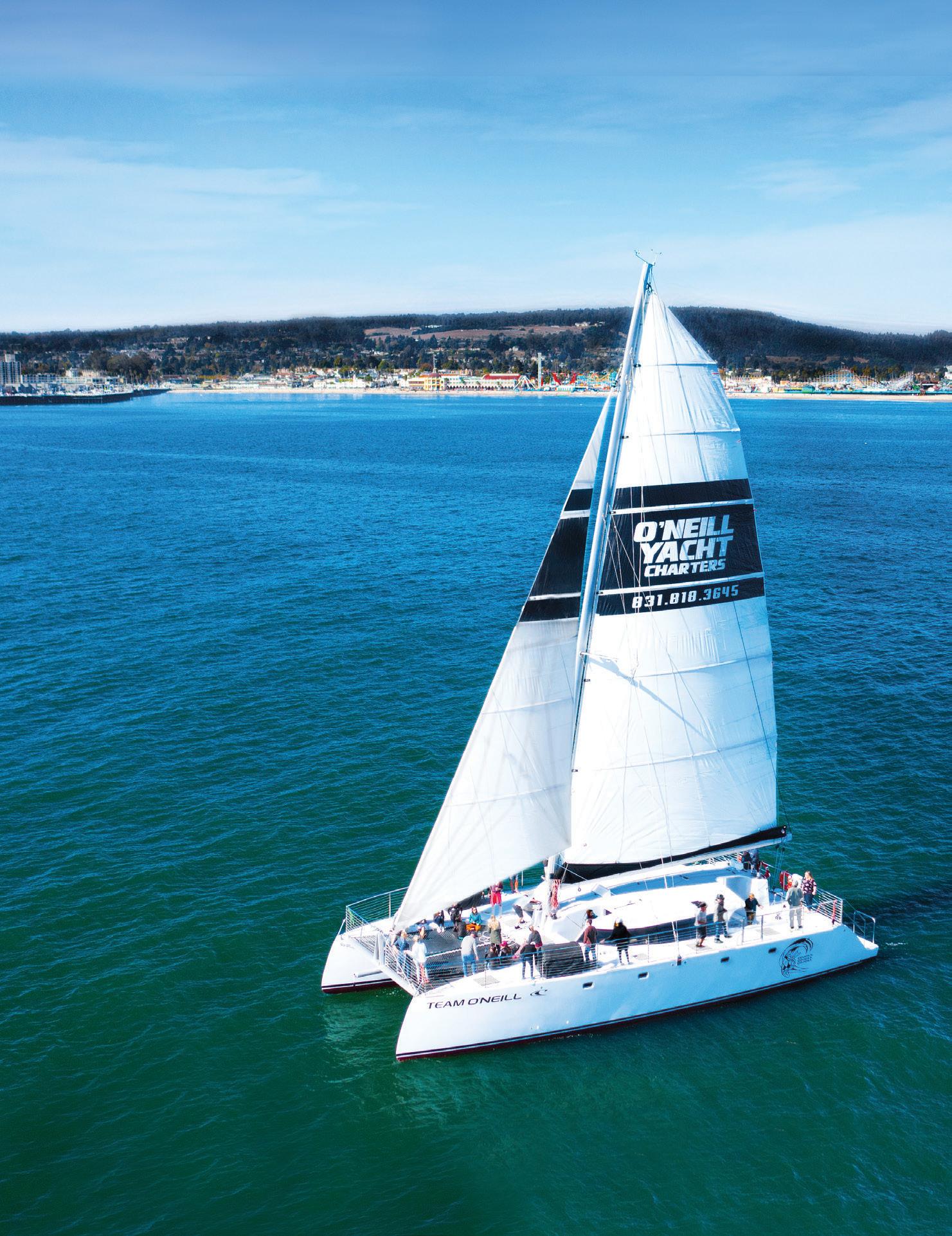
June 2-4
J In the heart of Newport Beach, located on hotel grounds, with jazz, R&B, and soul. festivalshyattconcerts.com
Ojai Music Festival
Ojai
June 8-11
J Adventurous, open-minded audiences join with musical thinkers who approach their craft with creativity. ojaifestival.org
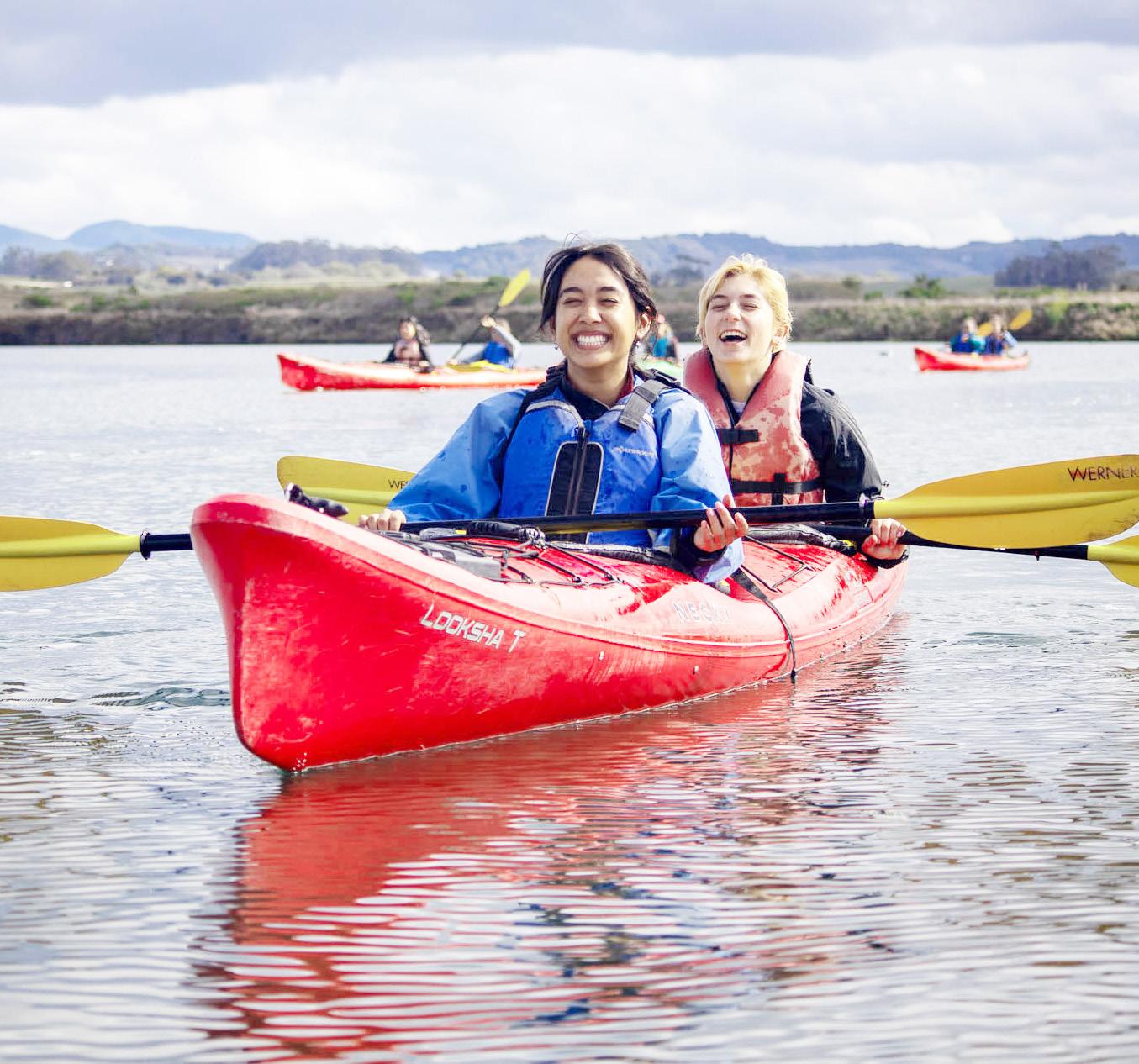
Stilldream Festival
Blue Mountain
June 8-12
J An earthy festival that focuses on music, community, nature, culture & consciousness. stilldreamfestival.com
Hog Farm HideAway Music Festival
Laytonville
June 9-11
J Three stages of music, camping, interactive art installations, performance artists, and more hogfarmhideaway.com
Splash House Festival Series
Palm Springs
June 9-11, August 11-13 & 18-20

J Sound waves and pool splashes are where house and disco dreams are made. splashhouse.com
Country Summer Music Festival
Santa Rosa
June 16-18
J Three-day destination country music event. countrysummer.com
Long Beach
June 24-25
J A house music festival, set amidst a waterfront backdrop of the landmark Queen Mary. daytripfest.com
Summer Arts & Music Festival
Cooks Valley
June 24-25
J A family-friendly gathering with local, regional and national live music and performing artists. mateel.org
High Sierra Music Festival
Quincy
June 29-July 2
J A family-friendly, community oriented music festival with an eclectic mix of genres, playshops, and crafts. highsierramusic.com
Mosswood Meltdown


Oakland
July 1-2
J The perfect gathering of young and old music rebels who hate everybody except each other. mosswoodmeltdown.com
California WorldFest
Grass Valley
July 13-16
J Experience new cultures through seven stages of music, while honoring Native Peoples. worldfest.net
Piercy
July 14-16
J An eclectic mix of music, together with industry-leading cannabis programming, and natural landscapes. northernnights.org
Bear Valley Music Festival

Bear Valley
July 21-Aug 6
J Enjoy a variety of music including classical, rock, country and jazz. bearvalleymusicfestival.org
Ascension Music Festival
McCloud
July 28-30
J Experience the best of funk, reggae, folk, and bluegrass at the base of Mount Shasta. ascensionmusicfestival.com
Sad Summer Festival
Irvine
July 29
J Touring the country and partnering with both local and national non-profits all summer long. sadsummerfest.com
Mammoth Festival of Beers & Bluesapalooza
Mammoth Lakes
August 3-6
J Outdoors among the pines, enjoy legendary Blues music and craft brews. mammothbluesbrewsfest.com
HARD Summer Music Festival
Los Angeles
August 5-6
J A new venue combination with various stages spread out across Los Angeles. hardsummer.com
Long Beach Jazz Festival
Long Beach
August 11-13
J Featuring some of the top artists of the year in an outdoor setting with food, art and more. longbeachjazzfestival.com
San Jose Jazz Summer Fest
San Jose
August 11-13
J Discover new genres of music, and fast-rising artists. summerfest.sanjosejazz. org
Outside Lands
San Francisco
August 11-13

J A three-day festival that delivers an elevated experience of music and culinary for attendees. sfoutsidelands.com
Burning Man
Black Rock City
August 27-September 4
J Tens of thousands of Burners gather to build a participative temporary metropolis in the Nevada desert. burningman.org
Big Blues Bender
Las Vegas, NV
September 7-10
J Four themed days and nights of exceptional music and bucket-list events for all. bigbluesbender.com
Holo Holo Music Festival
Sacramento
September 9-10
J Celebrating the music, food, and culture of Hawaii, this is a fun event for everyone. holoholofestival.com
Nocturnal Wonderland
San Bernardino
September 16-17
J Music. Camping. Art. nocturnalwonderland.com
Life ls Beautiful
Las Vegas, NV
September 22-24
J Celebrating a decade of singing your favorite songs, unleashing your inner foodie, laughing with comedians. lifeisbeautiful.com
Monterey Jazz Festival
Monterey
September 22-24
J Celebrating 66 years – the longest continuously-running jazz festival in the world! montereyjazzfestival.org
Same Same But Different
Lake Perris
September 28-October 1
J Four-day beachside campout where music, art, and wellness meet. ssbdfest.com
Hardly Strictly Bluegrass
San Francisco
September 29-October 1
J Three days of free music with an eclectic lineup of country, soul, folk and more. hardlystrictlybluegrass.com

Ohana Festival
Dana Point
September 29-October 1
J Pairing good music with good vibes. The best of indie, surfer rock, and alternative music. ohanafest.com
Aftershock
Sacramento
October 5-8
J California’s biggest rock festival with a powerful lineup of rock and metal favorites. aftershockfestival.com
Joshua Tree Music Festival (Fall)
Joshua Tree
October 5-8
J See JTMF Spring (May 18-21) for more information. joshuatreemusicfestival.com
Rebels & Renegades Music Festival
Monterey
October 6-8
J Inspired by the spirit and culture of Americana, Outlaw Country, Bluegrass, and Folk. rebelsandrenegadesfest.com

Reggae Rise Up Music Festival

Las Vegas, NV
October 6-8
J Reggae Rise Up is heading to downtown Las Vegas for three days full of positive vibes and great music. reggaeriseup.com
Desert Daze
Lake Perris
October 12-15
J Epic yet intimate, esoteric yet accessible, catering to weirdos, but embracing to all. desertdaze.org
Breakaway Music Festival Bay Area
San Francisco
October 13-14

J Bringing music, art, creativity, and community to your hometown. breakawayfestival.com


GoldenSky Country Music Festival
Sacramento
October 14-15
J Sacramento’s biggest country music event plus beer festival. goldenskyfestival.com
When We Were Young Festival
Las Vegas, NV
October 22
J It’s the pop-punk emo throwback fest you have been waiting for. whenwewereyoungfestival.com
Escape Halloween
San Bernardino




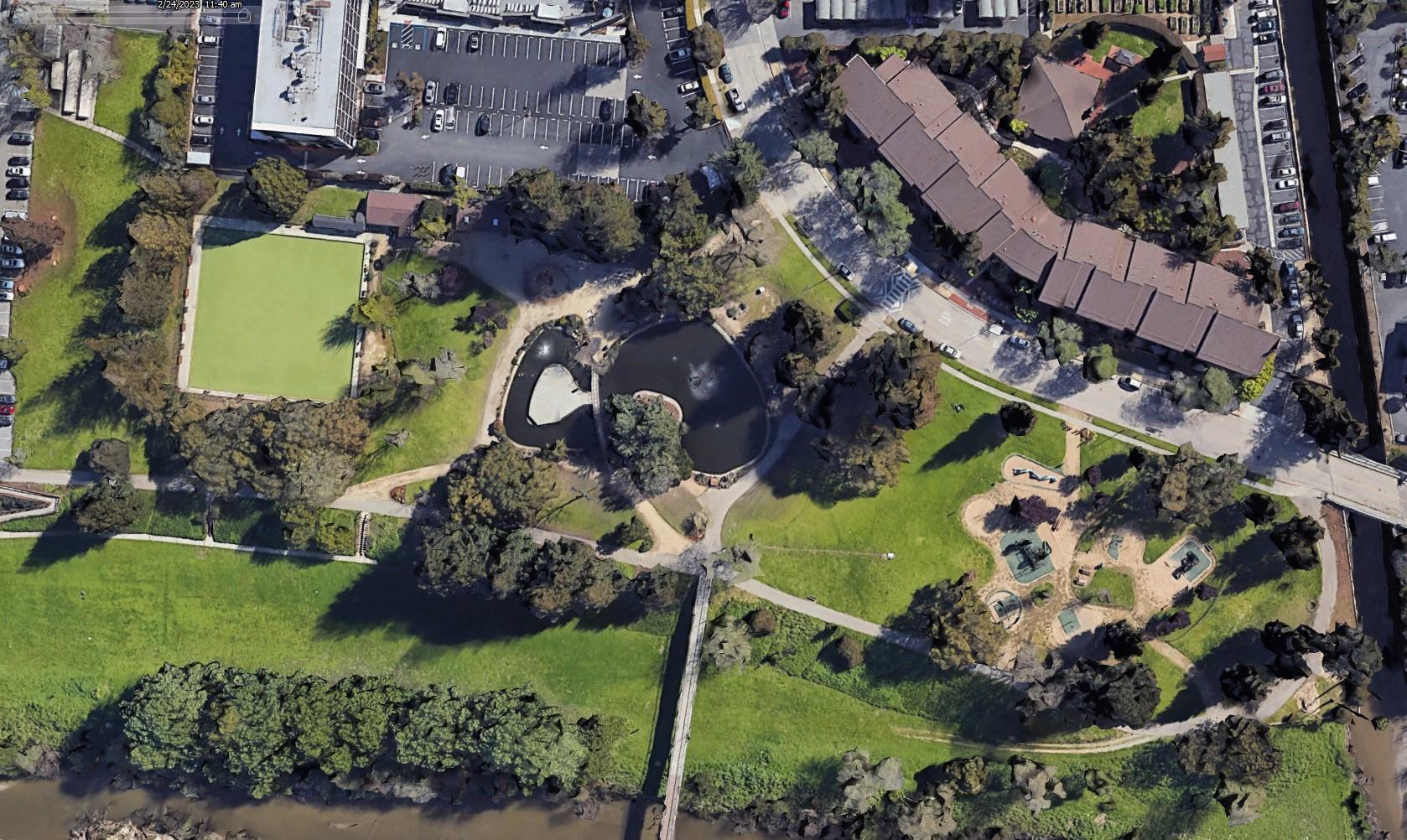
October 27-28
J Escape into a terrifying world of music, art, performers, and thrills. escapehalloween.com
o o t h s P o w e r b y S a n d B a r S o l a r L i v e A r t H e n n a m i n i - Y o s o S p a L a w n B o w l i n g D e m o s L a w n G a m e s P h o t o B o o t h M a s t e r o f C e r e m o n i e s C r e e P o w e l l a n d m o r e !
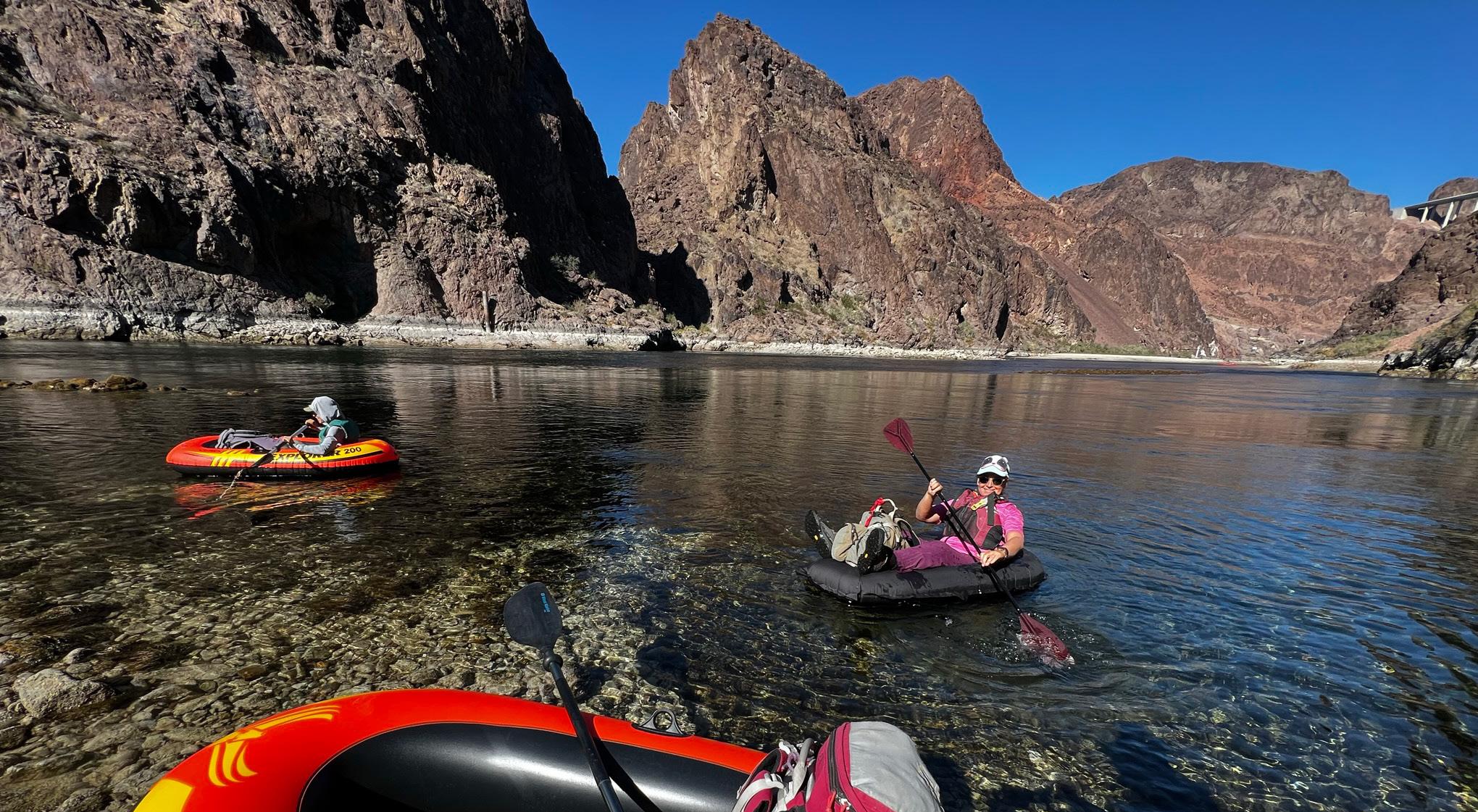 By Leonie Sherman
By Leonie Sherman
I used to avoid Las Vegas, but then I got obsessed with Death Valley canyoneering, and started hanging out with a bunch of badasses who chose to live in Sin City. Turns out Las Vegas is only an hour drive from world class canyoneering, rafting, climbing and hiking. And running Secret Canyon with a packraft lets you sample all of these activities in a casual six-hour day, like a sampler plate of outdoor fun.
The trailhead for Secret Canyon is less than an hour from the strip and the car shuttle takes about 20 minutes. After ducking under a tunnel, we began picking our way down a steep boulder field. Kris is 6’6”, so can easily lower himself down long drops; Abby and I sent him first and used his shoulders, knees and outstretched arms to aid our descent.
After the boulder field we enjoyed a pleasant sandy stroll and the walls began to slot up. The first rappel is over 60 feet of sheer smooth sandstone. The second rappel, which follows pretty quickly, is 20 feet over chunky broken rock. After making anchors out of rock piles and rappelling off slender creosote bushes in Death Valley, rappelling off bolts is downright relaxing, even though you’re still jumping off a cliff backwards. Less than three hours after leaving the car, we we were standing on the shores of the Colorado River inflating our rafts.
Abby brought her $700 packraft that weighs about as much as one of my approach shoes. The paddle looks like a telescoping chopstick with palmsized paddles. I took my inaugural packraft journey in a borrowed $15 eight-pound raft with an oversized PFD and a collapsible kayak paddle. Our exit from Secret Canyon involved about three miles of completely flat water, part of the 30-mile Black Canyon Water Trail, designated in 2014. You could practically float it on a pool toy.
I’d just completed a 70-mile SUP epic on the Green River, whose sluggish manure and mud-choked waters are barely liquid. Here however, thanks to a massive concrete wall and a tiny invasive shellfish, I could watch the rocky river bottom pass below my squeaking raft through the crystal clear emerald waters.
The graceful arc of the Hoover Dam looms 736 feet above the river. Over a thousand feet long and 660 feet wide
at its base, it contains enough concrete to pave a four foot sidewalk around the equator. Vegas wouldn’t exist without it, LA needs it for power and chances are you’ve eaten vegetables grown in the farmland it irrigates.
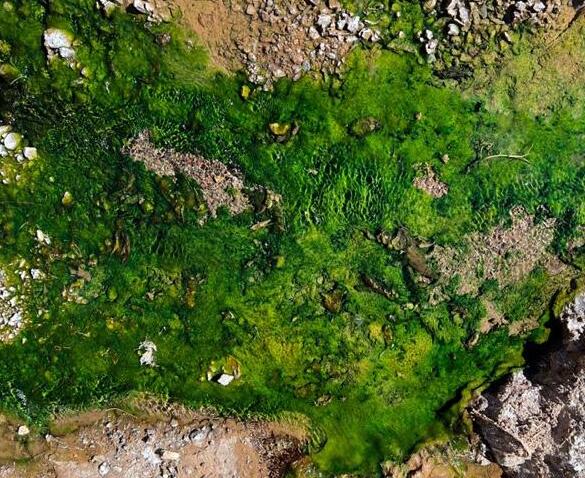
For decades it was the largest dam in the world. The lake it created is still the nation’s largest man made reservoir. Lake Mead’s bleached bathtub ring is a brutal reminder of our epic megadrought; even after historic winter rains the lake level is 180 feet below full. Silt, sediment and salt gather in Lake Mead, creating the clear, cold waters we were rafting on. Before the dam, that organic matter was distributed throughout the river’s lower reaches, creating fertile ground in the flood plain of the meandering river. Now four fish species are on the brink of extinction, the river no longer reaches the ocean, and hundreds of miles of riparian forest along with 1.5 million acres of wetlands are buried in a watery grave.
This page, top to bottom: Packrafting down the Colorado River after the exit from Secret Canyon (Kris Miller); Glowing moss in Boy Scout canyon (Abby Wines). Opposite page, left to right: First rappel in Secret Canyon (Abby Wines); The exit hike from Ringbolt Hot Springs (Leonie Sherman); Warm waterfall in Boy Scout Canyon (Leonie Sherman); A $15 packraft holding 130 more pounds than it’s rated for (Kris Miller).
Secret Canyon meets the Colorado River only a couple of miles downstream from the concrete tourniquet. Abby, Kris and I floated just a mile further before disembarking at the entrance to Boy Scout Canyon. Its upper reaches have a 340-foot rappel, the longest

drop of any Vegas area canyon. That’s a top-down adventure, so we settled for a short exploration, frolicking in the warm creek and waterfalls and gawking at bright green algae slick walls.
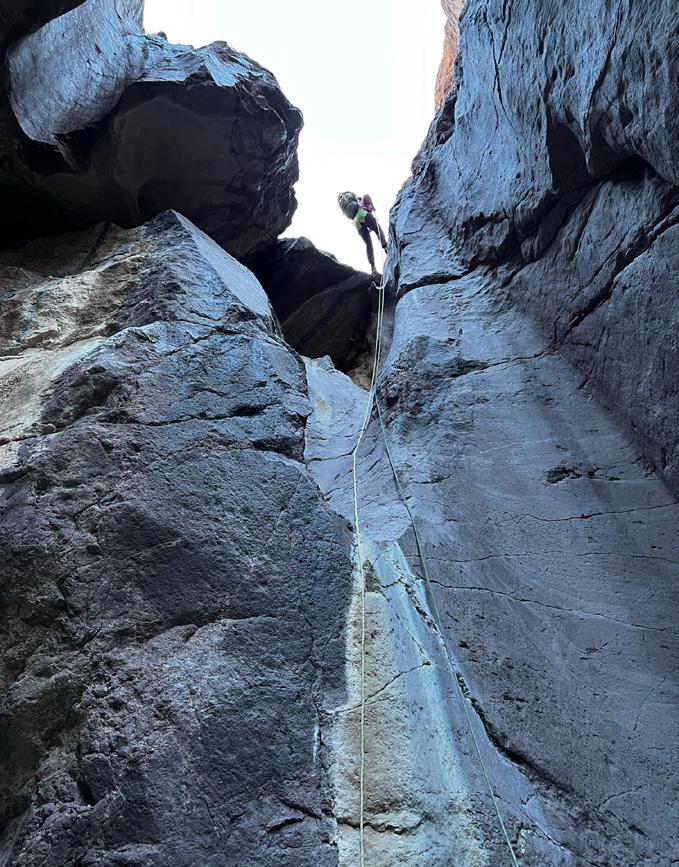
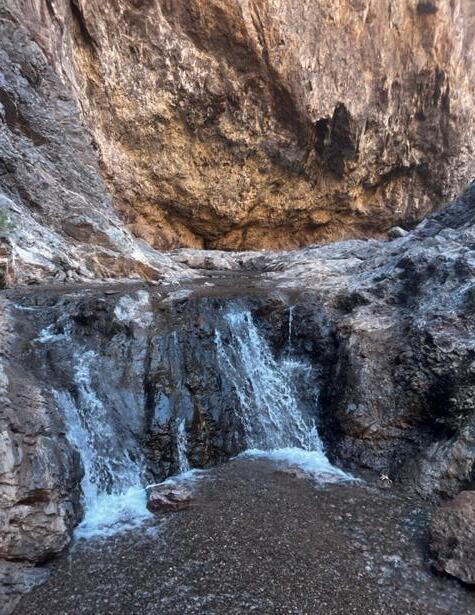
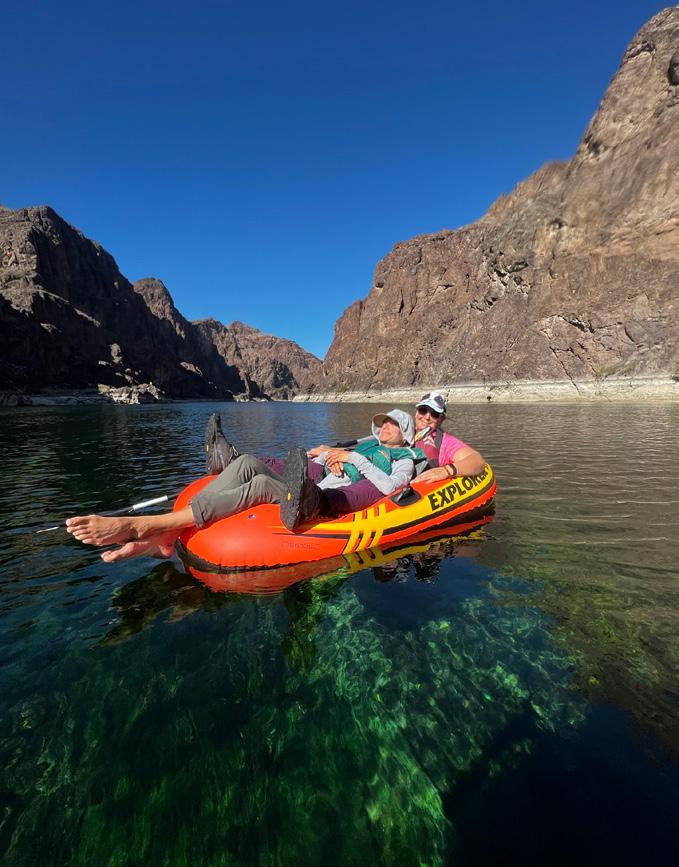
Back at our rafts, Abby maneuvered next to a boulder, trying to stay dry. She lowered herself gently into her packraft and was instantly chest deep in the frigid river. A cluster of razor-sharp thumbnail-sized quagga mussels had torn an 8-inch gash in the delicate fabric of her vessel, leaving it completely useless.
What those invasive mollusks did to Abby’s raft is nothing compared to the damage they’ve caused ecosystems from the Great Lakes to Arizona. Imported accidentally from the Dnieper River in Ukraine, quagga mussels can

survive up to 20 days out of water. Voracious filter feeders, they suck up vast quantities of phytoplankton, removing the base of the food chain. They also concentrate pollutants in their bodies, which can be passed up the food chain, and has contributed to outbreaks of avian botulism, killing tens of thousands of birds. Their waste lowers oxygen levels and the pH of surrounding water and they also clog sewage and water treatment pipes.
After decimating the Great Lakes ecosystem in the early 1990s, the first quagga mussel west of the Rockies was discovered in Lake Mead in 2007. They’ve since spread throughout Arizona, Nevada and Southern California. Once established they are almost impossible to eradicate.
The fate of the ecosystem was beyond our bandwidth at the moment, as we contemplated about 500 pounds of person, 85 pounds of gear and two $15 pack rafts rated to a maximum of 200 pounds each. Kris heaped our packs into his raft and Abby and I climbed into the one he’d lent me. Amazingly, the rafts held, and we mostly let the current carry us the remaining miles.
A short ladder leads to the lowest pool in Ringbolt Hot Springs (also known as Arizona Hot Springs). Proximity to Vegas means you can watch Instagram models pose, chat with grizzled desert rats and hear about someone’s latest ultra trail run while you soak in the soothing waters. Three connected pools offer temperatures from 95-110.
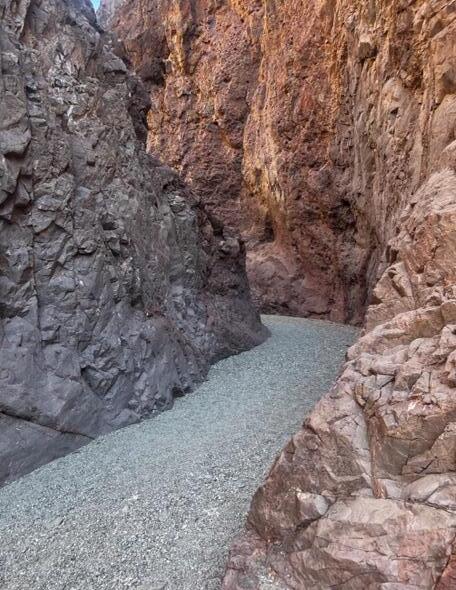
The 2.6-mile hike back to the car is a pleasant cruise through a slot canyon, past some interesting boulder problems, and up a sandy wash. If you’ve indulged in alcoholic celebration at the hot springs, you can easily lose your way in the final stretch and end up in the wrong car park. Abby, Kris and I refrained and happily worked our way back to the car. After picking up the other vehicle, we showered, dressed up and enjoyed a fabulous meal in a Vegas strip mall.
Where else can you canyoneer, packraft, soak in hot springs and hike in a single day that starts in a cozy bed and ends with vegan Thai food? Seriously, if you know of somewhere please tell me.
REACTIVE LIGHTING for optimized burn times.
HYBRID CONCEPT for choosing your power source.
AIRFIT headband for minimal compression on the head.


FULL-TILT lamp bodies for various wearing options.
50:50 BURN-TIME-TO-BRIGHTNESS for reliable performance. THESE ARE THE PETZL DIFFERENCES WORTH JUSTIFYING.
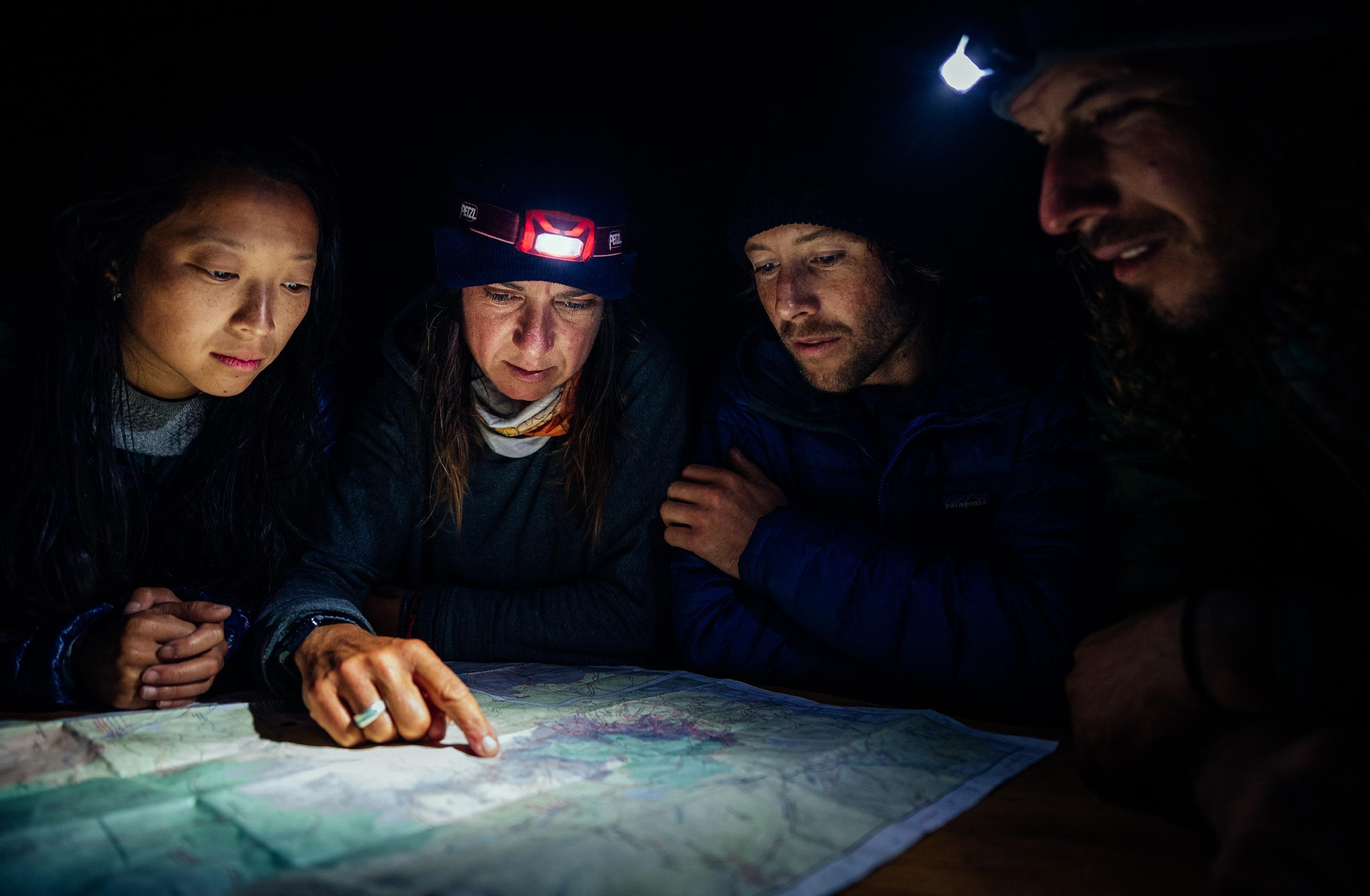
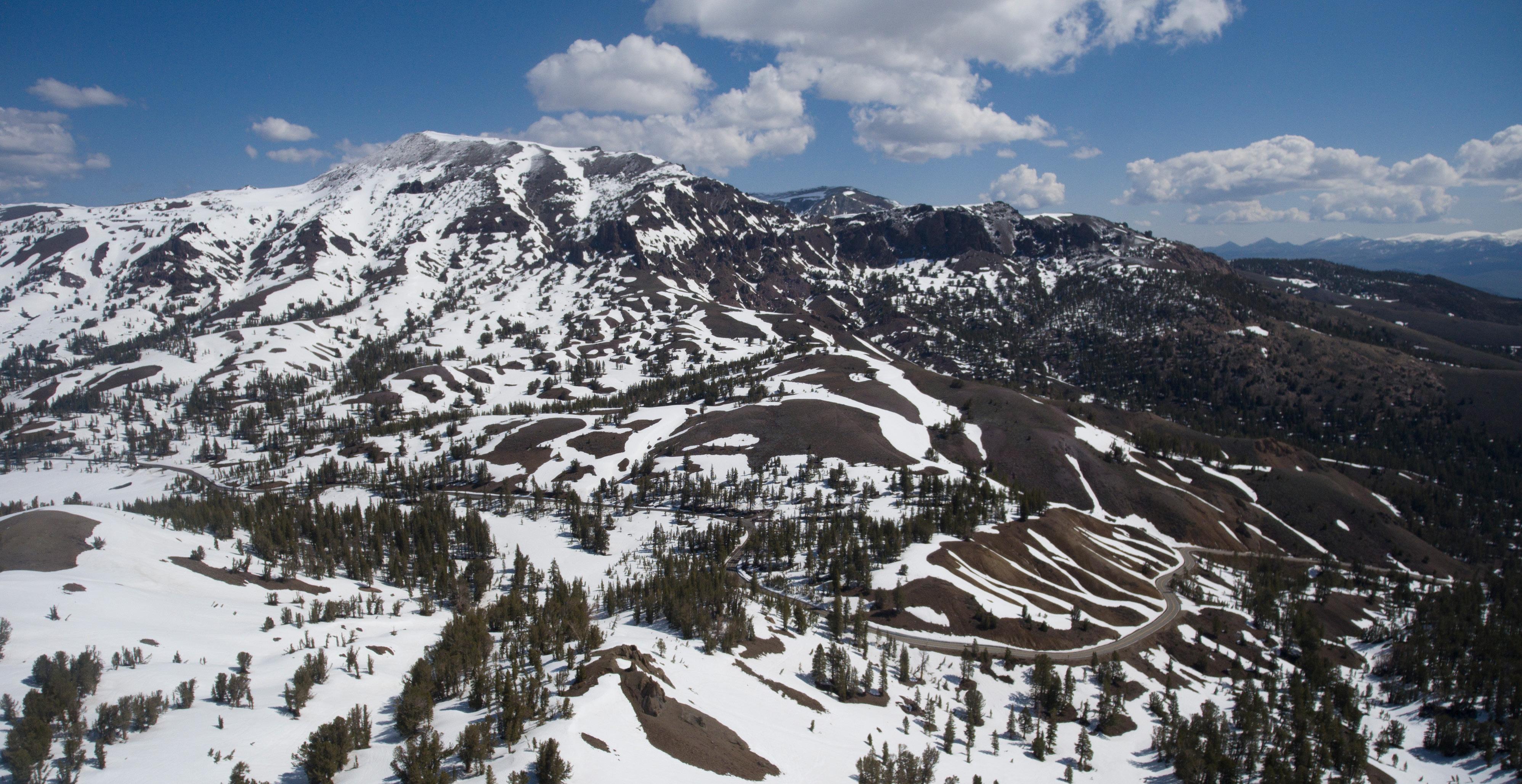 By Matt Johanson
By Matt Johanson
A hike to Canada never occurred to me as I explored snowy slopes and peaks of Sonora Pass. I drove up to the 9,623-foot crest of Highway 108 when it first opened in spring. A late-season tour on my cross country skis made a perfect day and inspired my first-ever outdoors article. Too bad I wasn’t smart enough to respect the High Sierra sun; bright red sunburn advertised my mistake for a week.
That was my first Pacific Crest Trail experience, though I’d never heard of it before. I skied along the PCT for several miles without knowing it until years later.
Most who attempt a PCT “thru-hike,” to cover the 2,650-mile trail in a single year, begin at the Mexican border. A smaller number begin at Canada’s boundary.
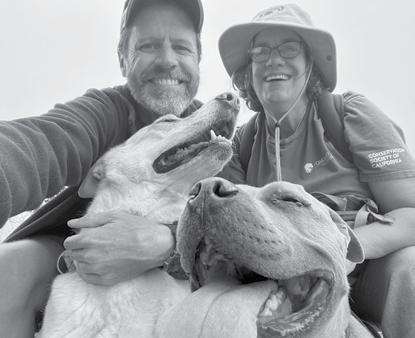
But my route on the PCT has detoured more than most, with early jaunts in Emigrant Wilderness, Devils Postpile National Monument and especially Yosemite National Park.
The trail’s builders completed their labor in 1993, just before I moved from San Francisco to the foothills of Tuolumne County. Long before hearing about it, I walked the trail in bits and pieces as I learned my way around the mountains. I was 24 and felt immortal as I discovered the Sierra Nevada’s abundant splendor. Every experience left me wanting more. There were plenty of other lessons to learn along the way.
A climb up Yosemite’s Cathedral Peak introduced me to rock climbing; my partner and I felt like giants when we achieved its scenic summit. How
beautiful were Eichorn Pinnacle and the Cathedral Lakes in alpenglow. How foolish we were to start and finish so late, forcing a descent in cold darkness. Other climbs ran behind schedule, causing unplanned nights on high, rocky ledges. Start early and prepare for surprises, I learned.
The John Muir Trail summoned me many times, starting with a 50-mile segment from Onion Valley to Mount Whitney. That four-day outing to the highest point in California was a thrilling adventure for me, my Uncle Ted and cousins Peter and Maggie. But in classic Johanson fashion, we underestimated its difficulty. Slow progress on our first two days made our last two days murderous. Mountain miles are more about the mountains than the miles, I discovered.
That was actually my first overnight hike on the PCT, which overlaps with the JMT for 160 miles, though I gave that no thought. Hiking the full 221-mile JMT alone was a big enough objective that took me ten more years. Without cousin Andy, it would have taken far longer.
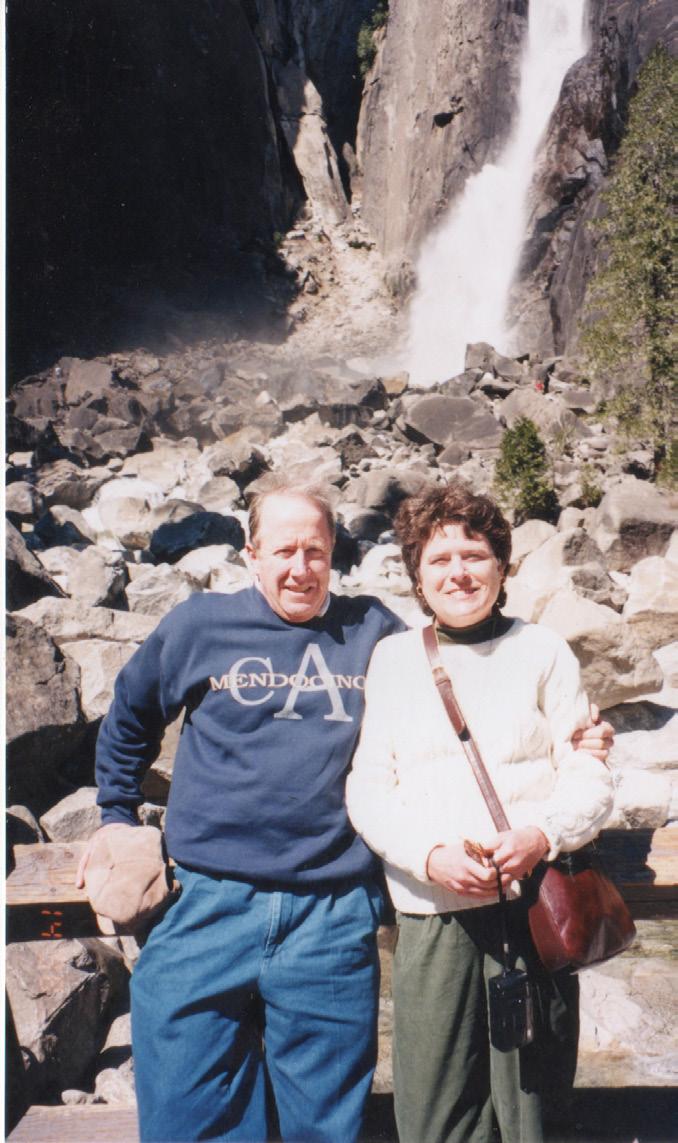
Andy led student groups on the JMT about a dozen times. He was a high
school teacher, and by that time, so was I. With my brother Dan and my dog Gracie, I joined him for segments and eventually the full route. High peaks, green forests and dreamy blue lakes filled many happy days. Everyone loved the challenge and camaraderie. Despite Andy’s great cooking, we all came back famished and thin. Hiking up to 20 miles a day for weeks expends more calories than anyone can carry, I found. Sometimes we got so hungry that the kids begged other hikers for food.
My Dad accompanied me to Shadow Lake when I attempted Mount Ritter, which he climbed as a teen. I was more than twice that age when I tried to follow suit but didn’t come close to summiting. Scaling a 13,149-foot peak takes more time and better gear than I anticipated. I would need to prepare better and try again.
Finally, other PCT sections attracted my attention. Cousin Zach, my dog Sam and I hiked from Tuolumne Meadows to Echo Summit. We met our first trail angels, the heavenly and absurdly generous people who help PCT hikers for free. Four of them camped at Ebbetts Pass for a weekend and revived us with
hot burgers, fresh fruit and cold beer. Meeting people so selfless and kind in my own stomping grounds astonished me.
Other PCT segments I enjoyed included skiing beside Lake Tahoe and through Ansel Adams Wilderness, hiking from Donner Pass to Sierra City, and trekking from Tuolumne Meadows to Devils Postpile in both summer and winter.
Other lessons could fill a book; here are a few that every PCT hiker should know. Always think about water: how much you have, how much you need, and where to get more. Lighten your pack; good gear is worth the money. Get used to hitchhiking; unless you have support lined up along the way, it’s how you’ll get into town for your resupplies.
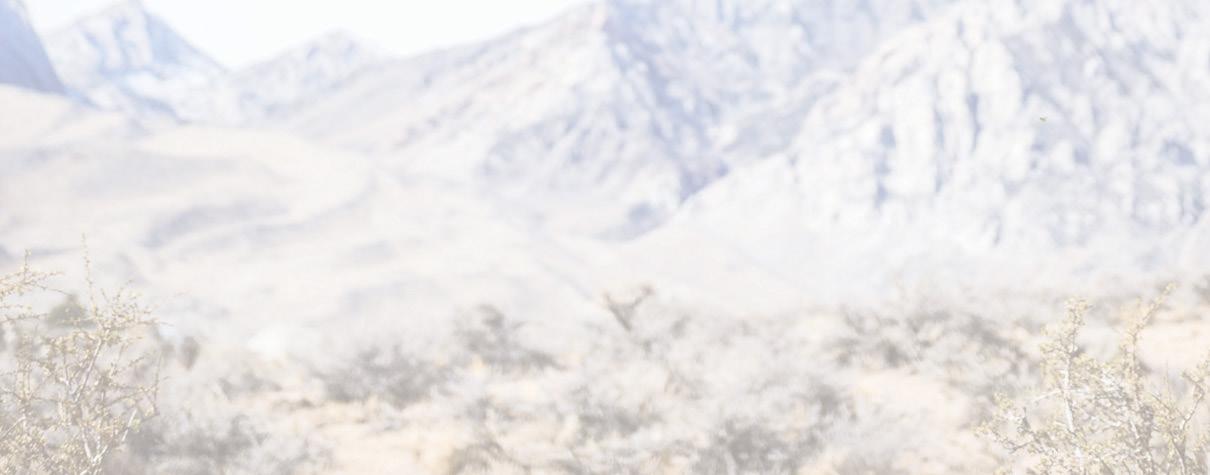
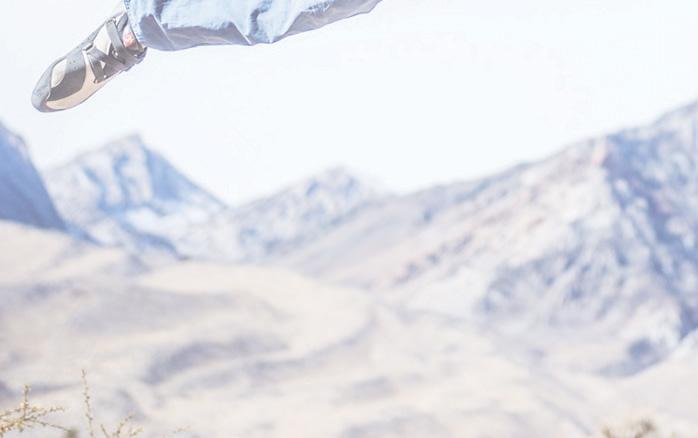
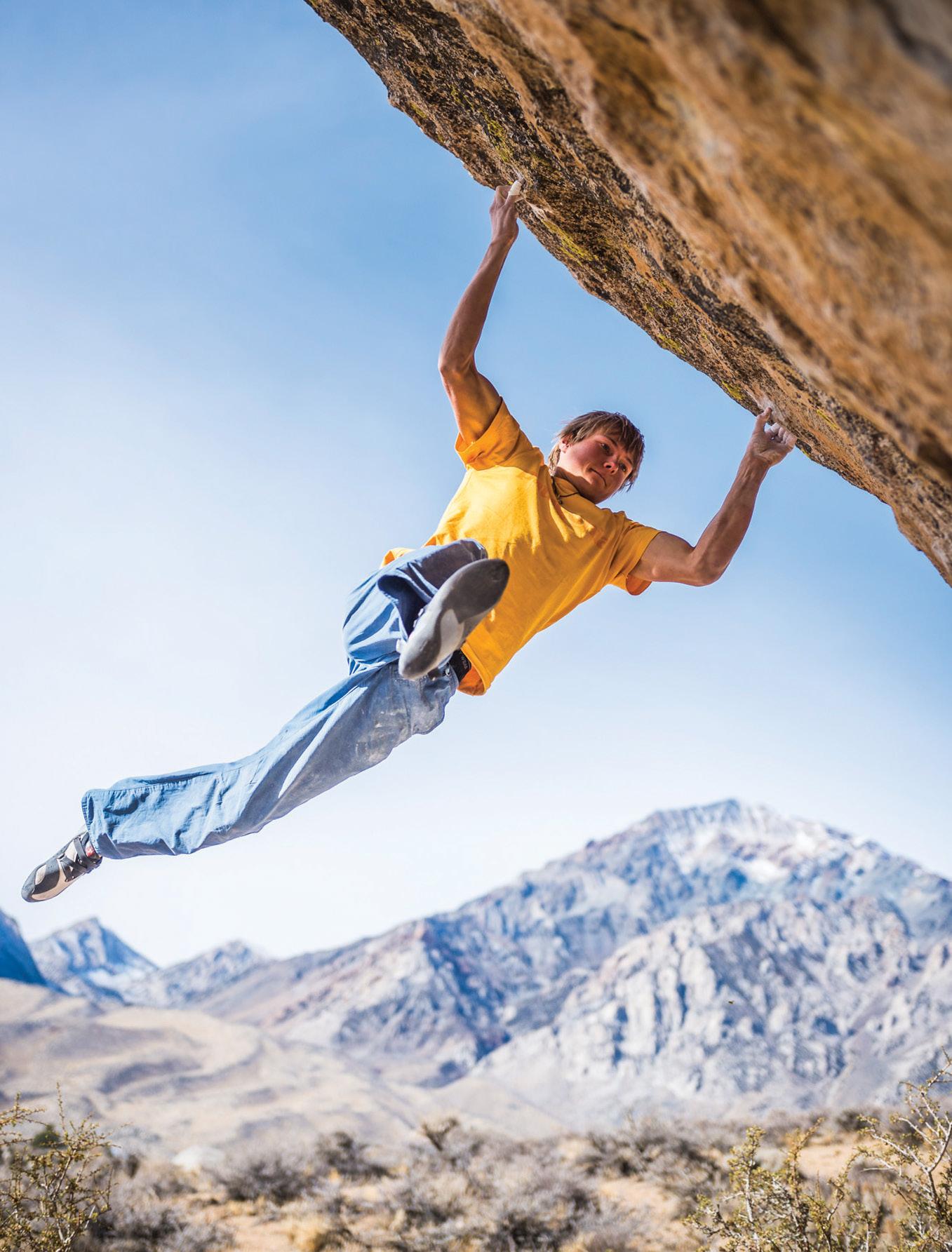


The great Canadian trio Rush is my favorite rock band and I’ve probably annoyed hiking companions by playing their tunes while driving to the trail. One of their songs named “Dreamline” includes these words: “When we are young, wandering the face of the earth, wondering what our dreams might be worth, learning that we’re only immortal for a limited time.”
That sunk in over the years. My Uncle Ted, who taught me to ski, died a year after our Mount Whitney adventure. Gracie Girl the Wolf Dog accompanied me on countless runs, hikes and adventures, and left us after ten joyful years. My parents raised my

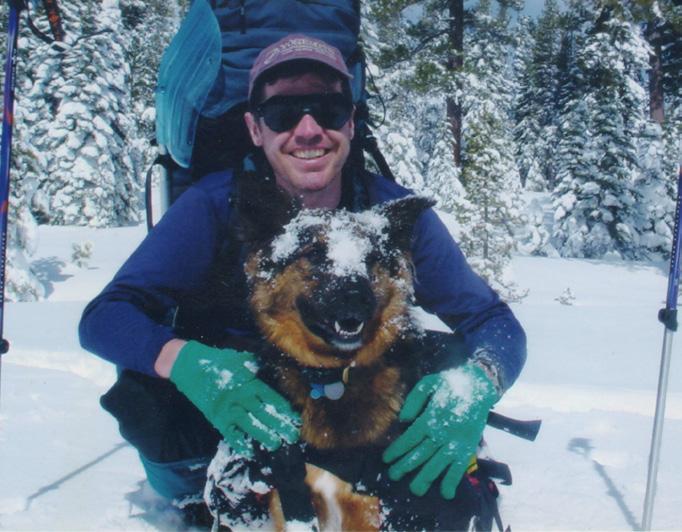
brothers and me with camping trips and unconditional love. Dad died of cancer at age 77. Later that year, Dan and I returned to Mount Ritter and climbed it in his honor. Mom had a special love for Lake Tahoe and took us there for many family vacations. After cancer took her at age 78, Sam and I ascended nearby Waterhouse Peak for her.

Yosemite Sam the Samurai Dog is still with me, though he’s no spring chicken anymore. For that matter, neither am I. Now in my early 50s, I stay fit though arthritis in my knee and hip have reset my limits. I still like “wandering” but I’m no longer “immortal,” just as Rush predicted. My joints don’t like me running like I once did but don’t complain, as much, about hiking long distances. Not yet.
My combined PCT outings covered 400 Sierra miles over a quarter century. If I’m going to hike the remaining 2,250 miles, I need to hurry up. My wife Karen encouraged me to live my dream. I took a one-year leave from teaching at Castro Valley High School.
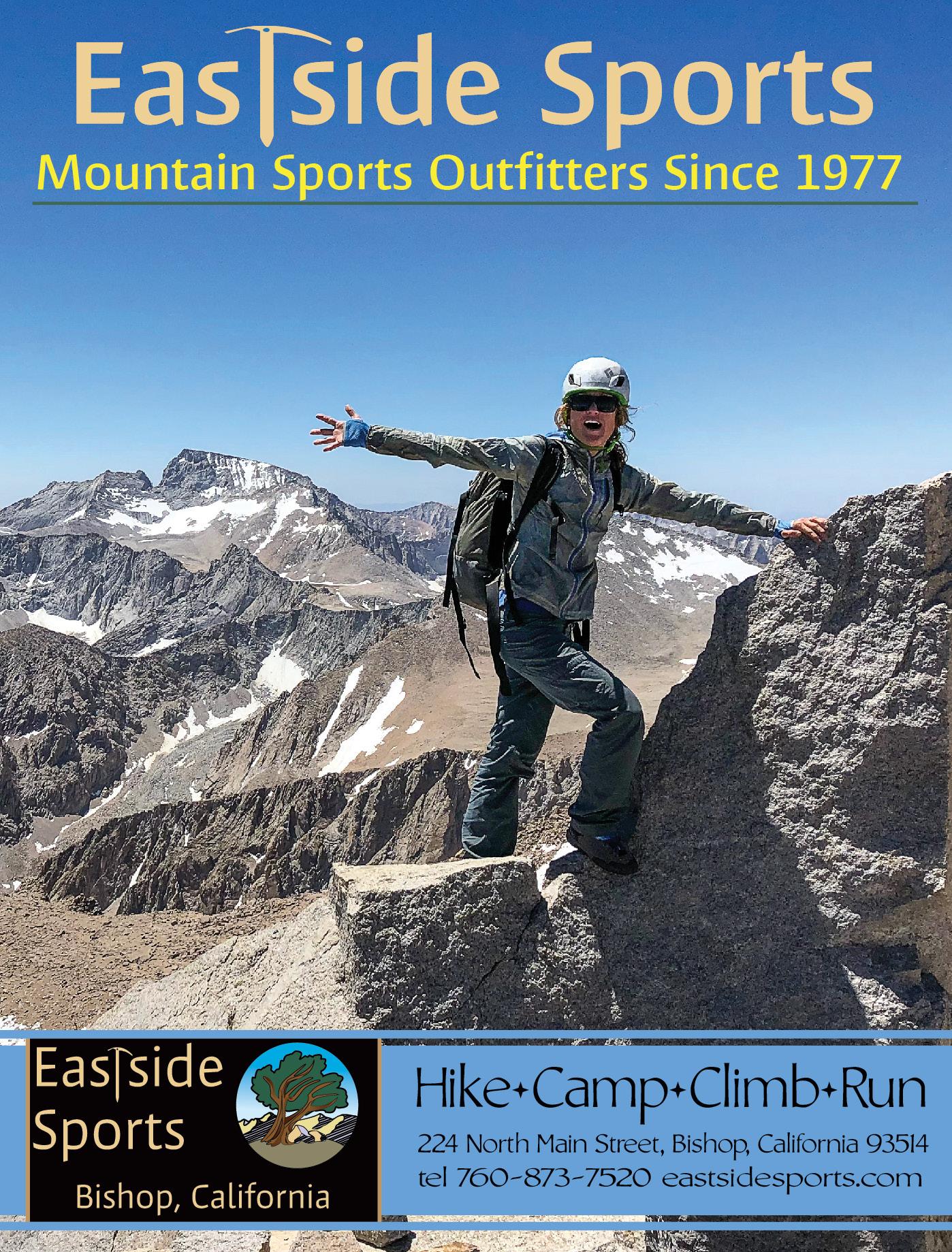
A rare shopping spree equipped me with a lightweight backpack and tent. I sorted my gear and shipped food boxes to key trail towns. Karen and Sam, my trip’s first trail angels, dropped me off at Amtrak where I caught a bus to adventure.
Canada, here I come.

The record melt off will make this a phenomenal year for big water adventuring. But it should also be a time of caution for hikers, backpackers, climbers, mountain bikers, and all others exploring the outdoors. Around the region, first responders are training and organizing to prevent 2023 from also being a year of record drownings. As Ruby Gonzalez, Kern River Manager for the Forest Service, puts it, “This year is going to be different, and people are going to be surprised.”
With that in mind, we asked experts — trainers, guides, outfitters, outdoor advocates, government agencies – for their safety advice as the snow melts this spring and summer. Here are some things to keep in mind.
UNPREDICTABLE WEATHER PATTERNS
Especially in spring, temperatures can range widely in a single day. This is most true in the desert and areas of steep elevation change like the mountains. People often pick gear and clothing based on the temperature at the start of their trip — when conditions are mild. They frequently underestimate springtime storms, and the temperature drop that can happen on a moment’s notice.
Now, combine that with the snowmelt that will be feeding our creeks and rivers at high volume at least until midsummer. It could be deadly if you are unprepared. Even if you plan to stay
dry and on land, wear multiple layers, and include an outer wind barrier. A disposable poncho or trash bag can be used as an emergency waterproof layer too.
The ground will likely remain saturated through spring and for much of the summer. It will keep side creeks flowing, but it will also make it significantly more likely that trees will uproot and fall over, especially in gusts. Rocks and dirt may slide too. Check for road and trail closures. Avoid camping in areas where the ground seems to be soft or to some degree saturated.
Creeks and rivers generally flow higher and faster in the spring than any other time of the year. Snowmelt and spring rain can turn modest creeks into hazardous torrents. A small river can become an impassable barrier.
If you’re walking, running, or biking, look for creeks or rivers on your planned
route and check if it is safe to cross at your desired time. When you arrive, if you are faced with an unsafe crossing, find an alternate route with a better crossing, or retrace your steps and wait for conditions to change. Tread lightly and if you feel force on your ankles or calves, don’t continue.
(See our sidebar for more crossing tips.)
With snowmelt feeding our creeks and rivers at high volume, there will be an unusually high mismatch between air and water temperatures. That raises the risk of the coldwater shock with its immediate gag reflex, panic, and subsequent loss of motor control. Jumping or falling into cold water also raises the risk of hypothermia, and rapid loss of body heat.
So, if you plan to be on the water, be sure you “dress for immersion” — likely at least a wetsuit, a splash jacket, and helmet — even if outside it is hot. If you
plan to enter the water, do so gradually, let the body adjust. Some paddlers and rafters like to splash their face and their necks before they enter a rapid just for this reason. And be prepared to swim. Choose trips and locations you know that you can navigate both on and in the water.
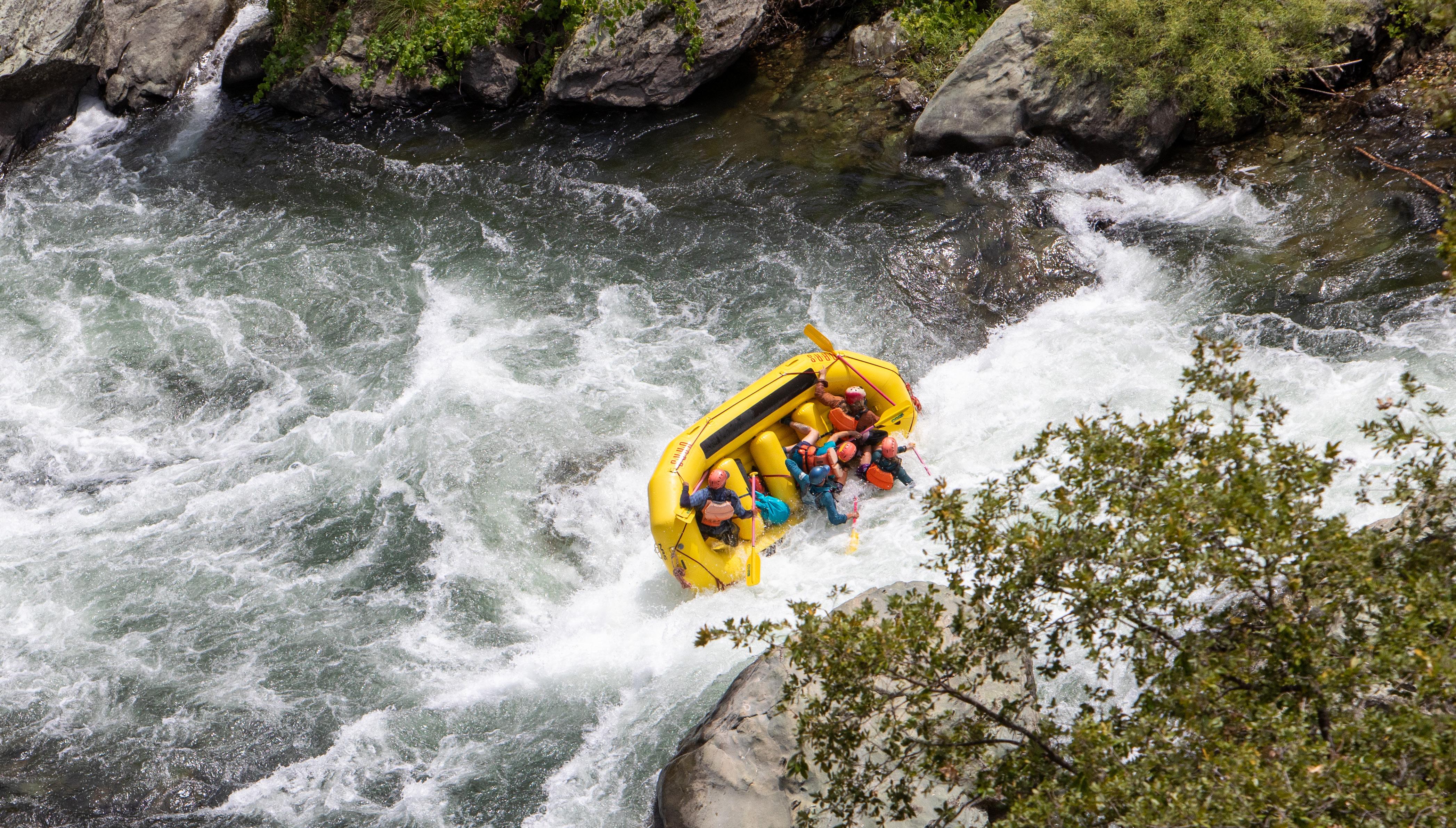
If someone falls in unexpectedly or is swept away, resist the urge to follow, especially if it’s a loved one. Think instead what you might throw them for flotation — a gallon water bottle or cooler, for example. Even if you have swiftwater training, think carefully: do you have the team and equipment you need to keep everyone else safe? This holds true for paddlers and rafters, as well as campers, hikers, backpackers, climbers, and other land-based recreationalists. Take a swiftwater rescue class if you are going to be leading a group in the outback, or even be a part of one.
More fundamentally, don’t go out alone, choose your company wisely, and, of course always wear a life jacket on and near the water – ideally if you are closer than 20 feet, according to one source. Make sure others do so too, especially non-swimmers. Make sure the jacket fits snugly and provides the proper flotation.
If you are used to organizing your own paddling or rafting trips, consider dialing it back this season, or even going with a guide or reputable outfitter. Be flexible as conditions change, as they undoubtedly will. And have a backup plan for whatever activity you choose. Finally, stay sober
on and around moving water. It is not news that most drowning fatalities are tied to drug or alcohol use.
MANY RESOURCES


Federal agencies are working with state and local groups to expand their presence in wilderness areas this season. Know how to get a hold of them before you hit the trail or waterway.
Government and private organizations make a host of online and video materials available about safety on and around the water. These include the: American Canoe Association, American Whitewater, California

State Parks’ Division of Boating and Waterways, the National Safe Boating Council, friends’ groups like the Kern River Conservancy, and even NRS (Northwest River Supply).
Some river outfitters will offer free life jacket rentals this season. Keep an eye out for offers near you and share this information with those who need it. May 19 is the National Safe Boating Council’s “Wear Your Life Jacket at Work Day.” Consider participating as a way to raise awareness in your world.
For careful adventurers, this will be a great year. Warm weather and big water will combine to keep our rivers, creeks and streams running far longer than normal. Rafting outfitters are planning trips well into July and even August on the North Fork of the American, the Yuba, and the Forks of the Kern.

Big water is also opening up multiday trips that might not usually be comfortable or available, like the East Fork of the Carson River.
Meanwhile, dam-fed sections will be bigger than usual to keep reservoirs safe. Just a few of this summer’s hidden treasures: the water managers of the Tuolumne and Lower Kern River are predicting heightened releases until mid-August. And on the South Fork of the American new rapids are likely to appear at flows between 3,000 and 5,000 cfs, giving new life to this old favorite.
The leaders of land-based trips should have training in both “dry land” first aid, as well as drowning rescue. Pay close attention to these warning signs that a body of water may be too dangerous to cross:
• Narrow, rapid rivers are dangerous wider, shallow rivers are safer.
• Crossing at a bend in a river creates more turbulence and danger.
• Is there obvious mud and debris (branches, litter, etc.)?
• Are rocks clacking or rolling with the current?
• Toss a stick into the current. Are you able to walk alongside it and keep up with it?
• Is the water visibly rising?
• If you are by yourself, is the water deeper than your calf?
• If you are with a group, is the water deeper than mid-thigh?
Generally, the morning is the safest time to cross flowing water in the spring. Water levels tend to be lowest in the morning and highest in late afternoon.
For more than 120 years, dams have had a chokehold on one of the most diverse watersheds in the western United States, the Klamath River. Two decades ago, a group of Hoopa Valley High School students organized a community run to bring awareness to the harmful impacts the dams have on the river after tens of thousands of fish perished due to drought, low flows, water diversions and water pollution the year prior.
Poor water management coupled with the dams’ negative influence on river conditions, led to the catastrophic disease outbreak of 2002, which killed upwards of 70,000 adult salmon that were attempting to spawn.
“Nobody in our lifetime had seen something like that happen, where so many fish died before they ever got to spawn,” Dr. Kayla Begay, Assistant Professor of Native American Studies at Cal Poly Humboldt, said.
That following spring, Begay and Tasha James, both citizens of the Hoopa Valley Nation and of Yurok and Karuk descent, joined forces with two other Hoopa Valley High School freshman — Erica Chase and Chelsea Reed. Their common denominator was a shared connection to the water and a love for the fish.
“The connection to the river runs in our blood,” James, TANF (Temporary Assistance for Needy Families) Program Manager for the Yurok Tribe, said. “Look at your hand. Look at your veins. That is
a resemblance to the rivers that we come from. To see something so personal, and something we are so connected to just dying, ultimately, we knew we had to do something.”
Under the supervision of Margo Robbins, then an adviser for the Hoopa High School Water Protectors Club, the group of women sprung into action organizing the inaugural Salmon Run in 2003.

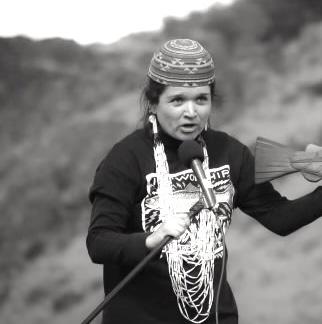
Citizens of the Klamath, Karuk, Hoopa Valley and Yurok Tribes then launched a far-reaching campaign to remove the lower four Klamath River dams in hopes to heal the water and bring the salmon home.
For four days, from May 18-21, the four tribes will celebrate the Salmon Run’s 20th anniversary by making the 340+ mile journey from the mouth of the river at the California coast, maneuvering up to the headwaters in Oregon.
“This year is actually going to be the last official year that all four of the dams are still going to be standing,” said Crispin McAllister, former Karuk Tribal Councilman and avid runner. “One of
the dams is coming down for sure this year and the other three are supposed to come down next year.”
This month, deconstruction preparation work is underway. This work was approved as part of the Klamath Hydroelectric Settlement Agreement, a historic cooperative agreement that included state agencies, Tribal representatives, and PacifiCorp, the company that owns the dams. From these signatories formed the Klamath River Renewel Corporation, the non-profit body that oversees the dam dismantling.
Work on the dams will begin this summer, starting with Copco 2. The Federal Energy Regulatory Commission approved the $450 million dam removal project in November of 2022. The first dam will be removed by September 2023. The other three dams will be removed by the end of 2024, making it the largest dam removal project in the world.
The lower Klamath River will flow free once again, and the salmon will finally come home.
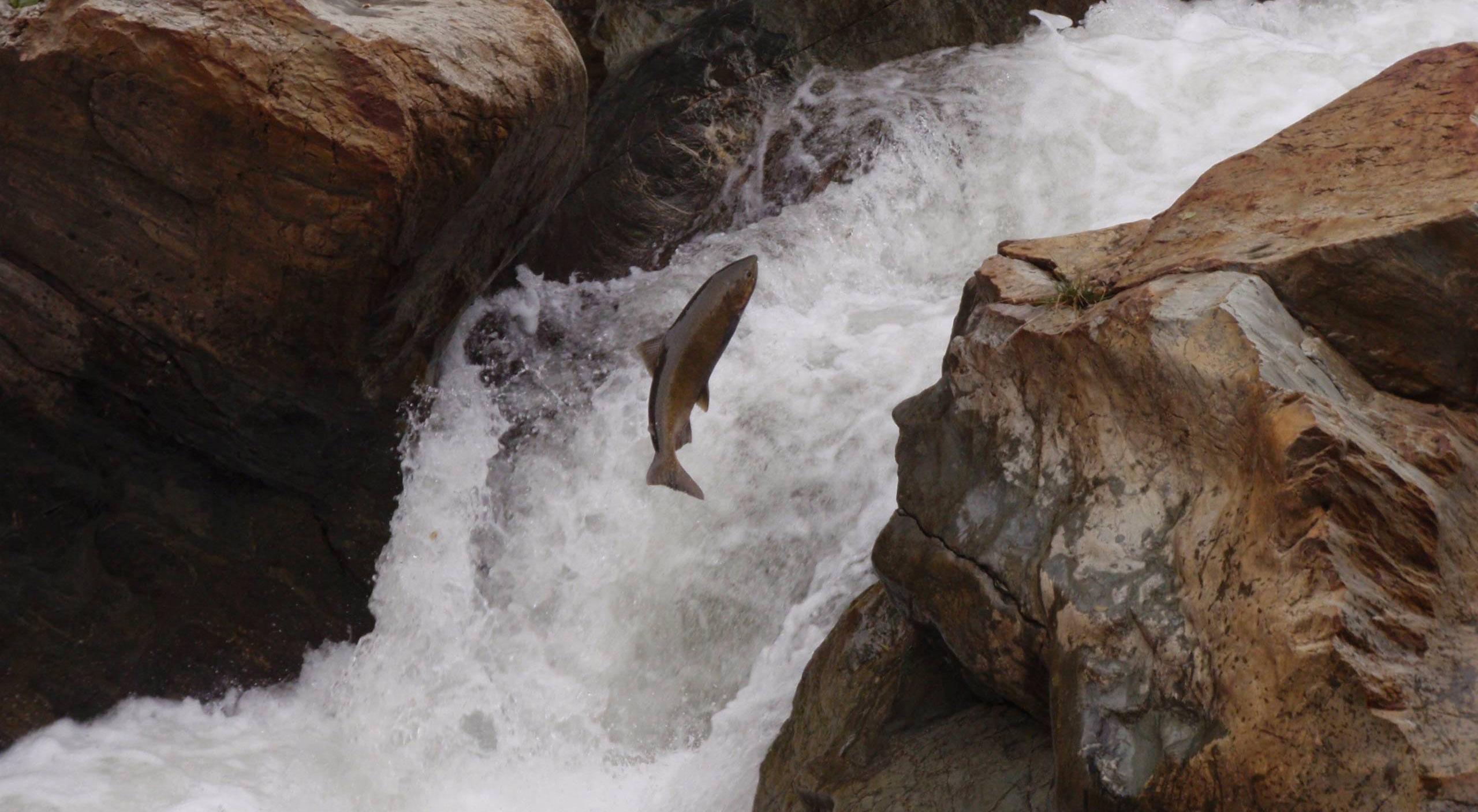
Top to bottom: Without the dams the Klamath River will once again support robust runs of salmon and trout as fish regain access to historic habitat and cold water tributaries above the dams (Charles Wickman / Mid Klamath Watershed Council); Melodie George-Moore, Hoopa Valley Tribe, speaks to a group of runners about saving the salmon (Mo Hollis)
For thousands of years the Klamath, Karuk, Hoopa Valley and Yurok Tribes have inhabited the upstream portion of the Klamath River watershed, relying on salmon as one of their first traditional foods.
Long before European settler contact, salmon runs united Klamath communities up and down the Basin. Today, the four tribal nations unite to save the fish
that have provided for their people for thousands of years.
In recent decades, tribes witnessed the river’s health decline but not without putting up a fight. Tribal citizens of the Klamath Basin have battled in courtrooms and appeared before government agencies to protect the sacred fish, as well as their ways of life.
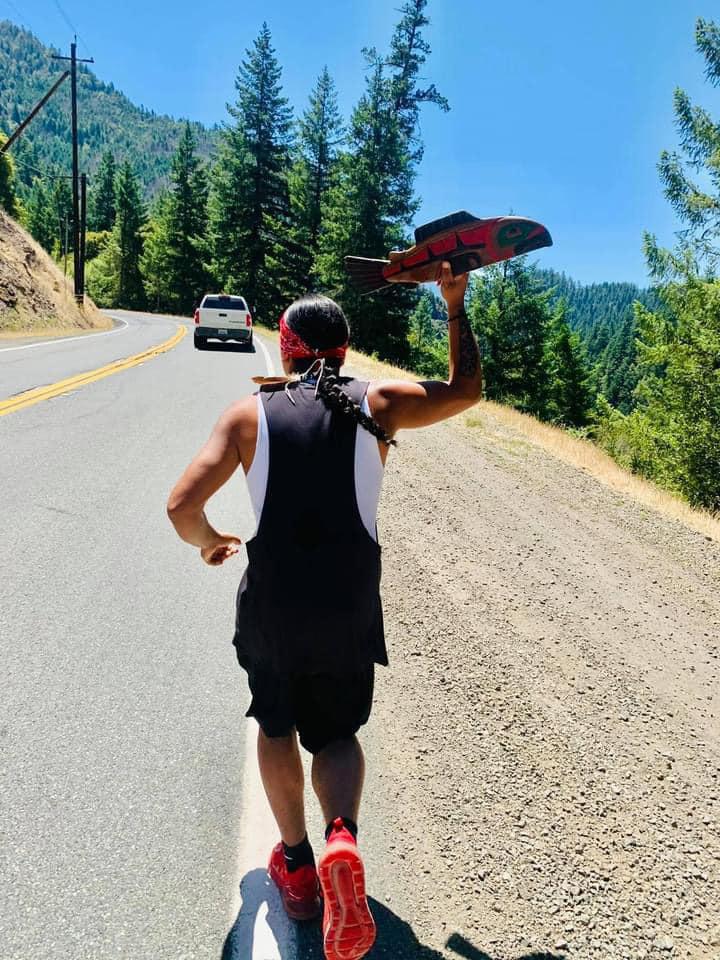

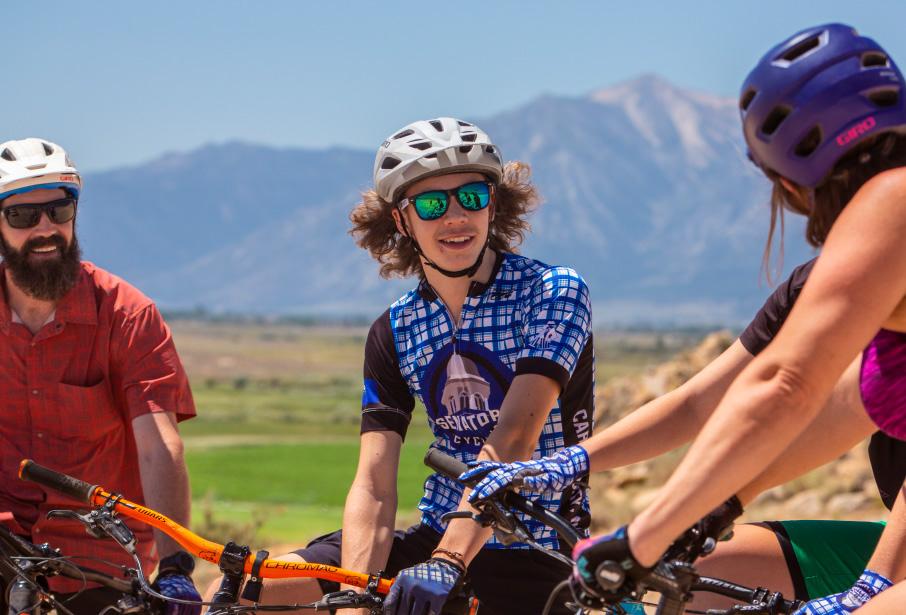
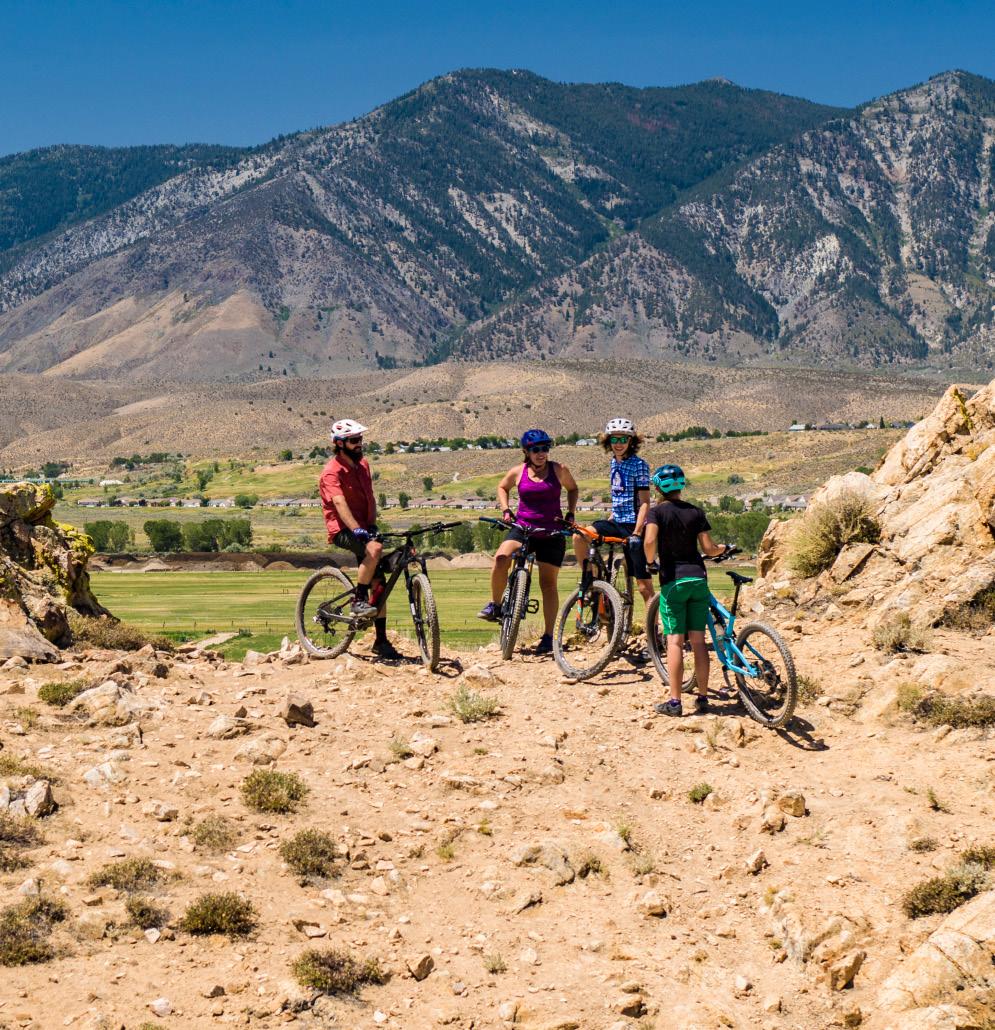
In 2001, the federal government slashed water allotments to farms in an attempt to protect the salmon and other endangered fish species. Months later, in 2002 nearly 70,000 adult salmon died in the catastrophic and traumatic fish kill that was the catalyst of the Salmon Run. This tragic event was a result of drought, low water levels and water diversions to Klamath Basin farmers and ranchers. That combination was a breeding ground for bacteria and other toxins, which affected the fish’s gills, ultimately leading to their untimely death.
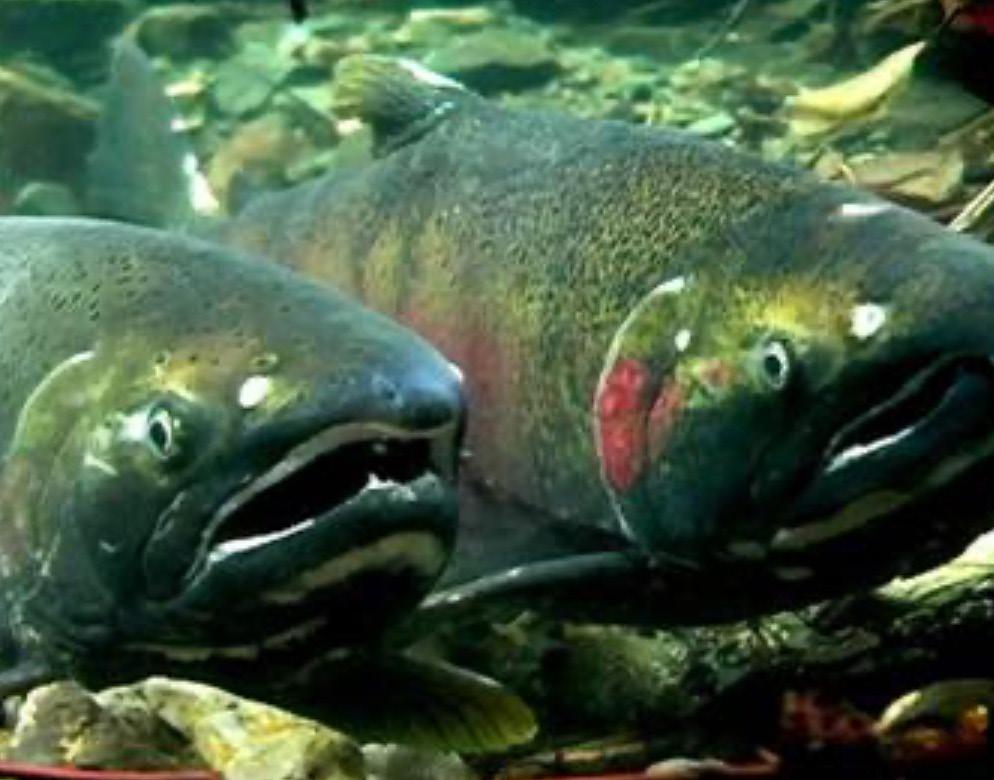
In 2004, PacifiCorp filed an application to relicense the Klamath Project. In response, Tribal members started a grassroots campaign with the valiant goal of removing the lower four Klamath River dams – the largest river restoration effort in US history.
Between 1903 and 1962, PacifiCorp’s Klamath Hydroelectric Project constructed seven dams along the river. The Klamath Hydroelectric Settlement Agreement now calls for the four lower dams: Iron Gate, Copco No. 1, Copco No. 2, and J.C. Boyle, to be decommissioned.


The long awaited decision was a major step in restoring hundreds of miles of salmon spawning habitat that had been blocked by dams on the lower Klamath River for generations. Advocates say it is

“The connection to the river runs in our blood. Look at your hand. Look at your veins. That is a resemblance of the rivers that we come from. To see something so personal, and something we are so connected to just dying, ultimately, we knew we had to do something.”
— Tasha James, TANF Program Manager for the Yurok Tribe
a direct result from people stepping up to speak for those who do not have a voice.
“I’ve always been an advocate for our water, and our fish, and our land,” Annelia Hillman said.
Hillman, a citizen of the Yurok Nation, has done activism work on the river in relation to dam removal and participated in the Salmon Run since its inception. She now serves as a key principal organizer for the annual run and a Food Village Coordinator for Yurok Tribe.
According to Hillman, the decision to raise awareness of the harmful impacts the dams have on the river, fish and people was sparked by the youth created movement all those years ago.
“It was their idea and their vision of what could happen and how to bring awareness to the state of the Klamath River,” Hillman said. “What happened to our salmon called for prayer and action.”
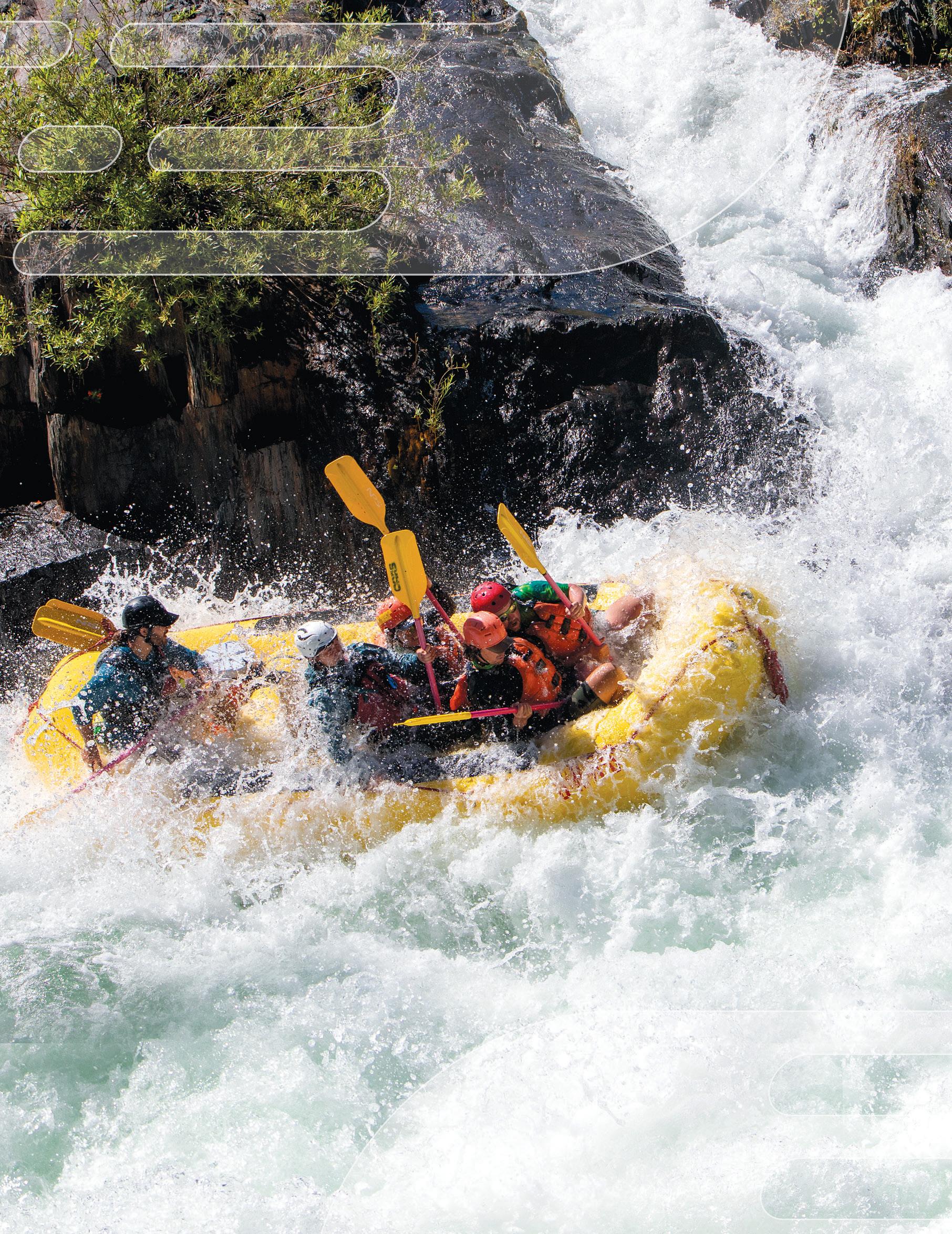
Hillman said the run, centered in prayer, is a celebration of the collective efforts to heal the river and the communities that live along it. The goal is that wild salmon will once again return to the upper Klamath Basin.
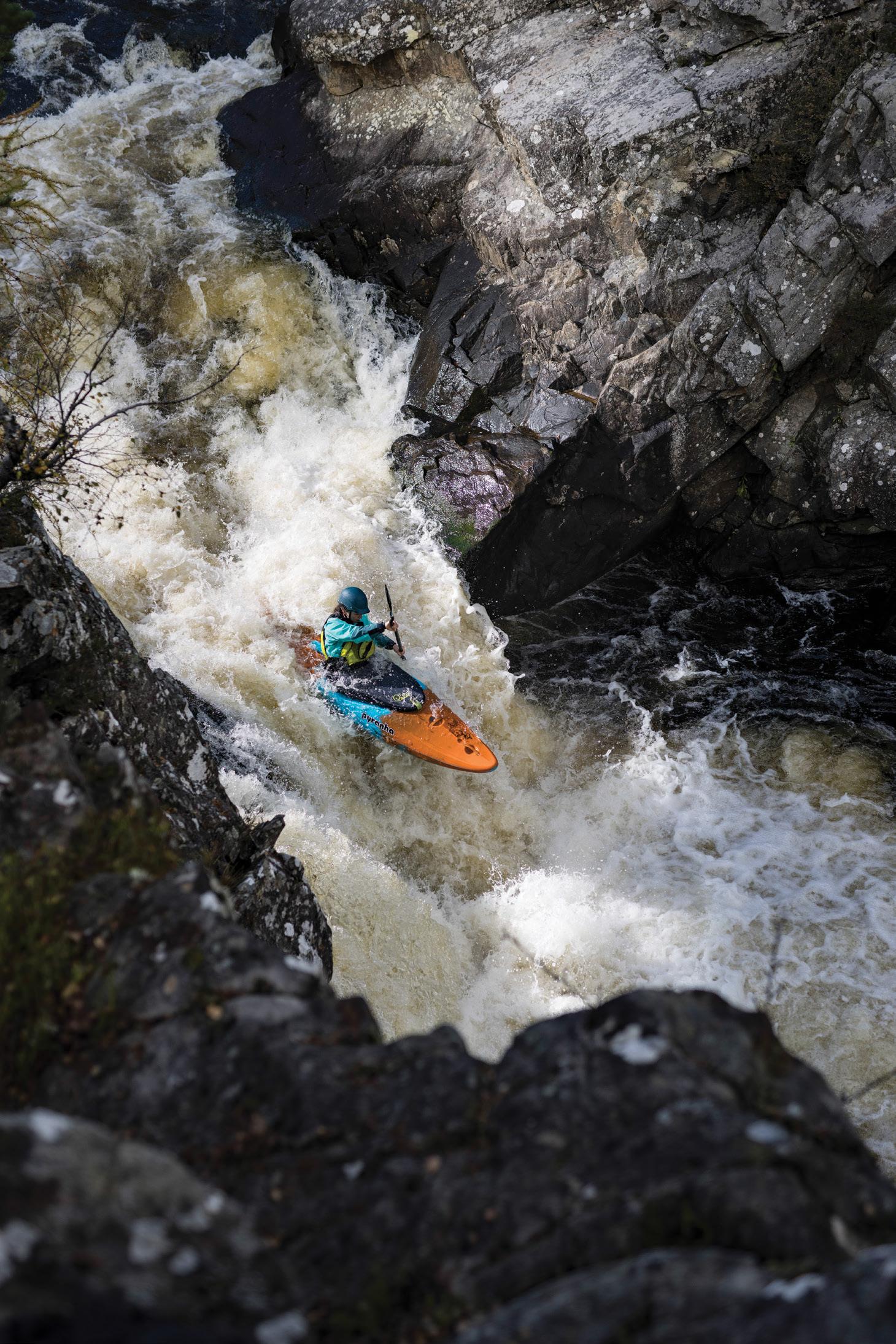
Today, the run has grown from a schoolled activity to a multi-day 340+ mile long run, which is broken up into one mile increments. This allows participants from all ages and abilities to join in on this historic movement.
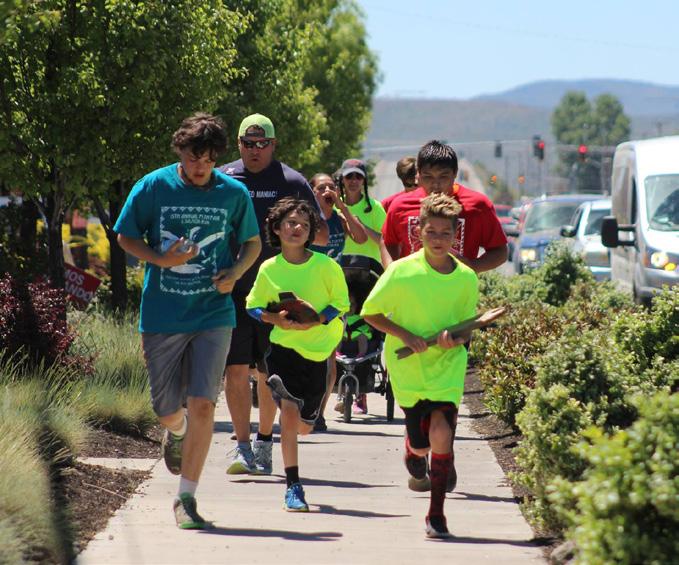
Each community takes turns organizing

their section of the run through their traditional villages, which provides an opportunity for people to represent their distinct tribes.
Normajean Cummings has been helping organize on the logistical side for the past eight years. She says this year is projected to be the largest gathering yet.
“This year we’re planning between 1,000 and 1,200 runners total,” Cummings said. Runners take turns carrying wooden carved fish and praying as they complete their portion of the run, before passing the fish along to the next person. The carved fish batons are a symbol of the long anticipated return of the salmon.
“We’re not just praying for ourselves and for our tribes,” Cummings said. “We’re praying for all of the communities that we run through. And to me, that’s huge.”
The salmon runners are such a strong community and bring much needed energy and excitement back into the communities year after year, she said.
As one of the first to organize the inaugural run twenty years ago, Begay says she finds joy in seeing new generations of youth activists and youth leaders take on these roles to keep the movement alive and is excited to see how the run will evolve.
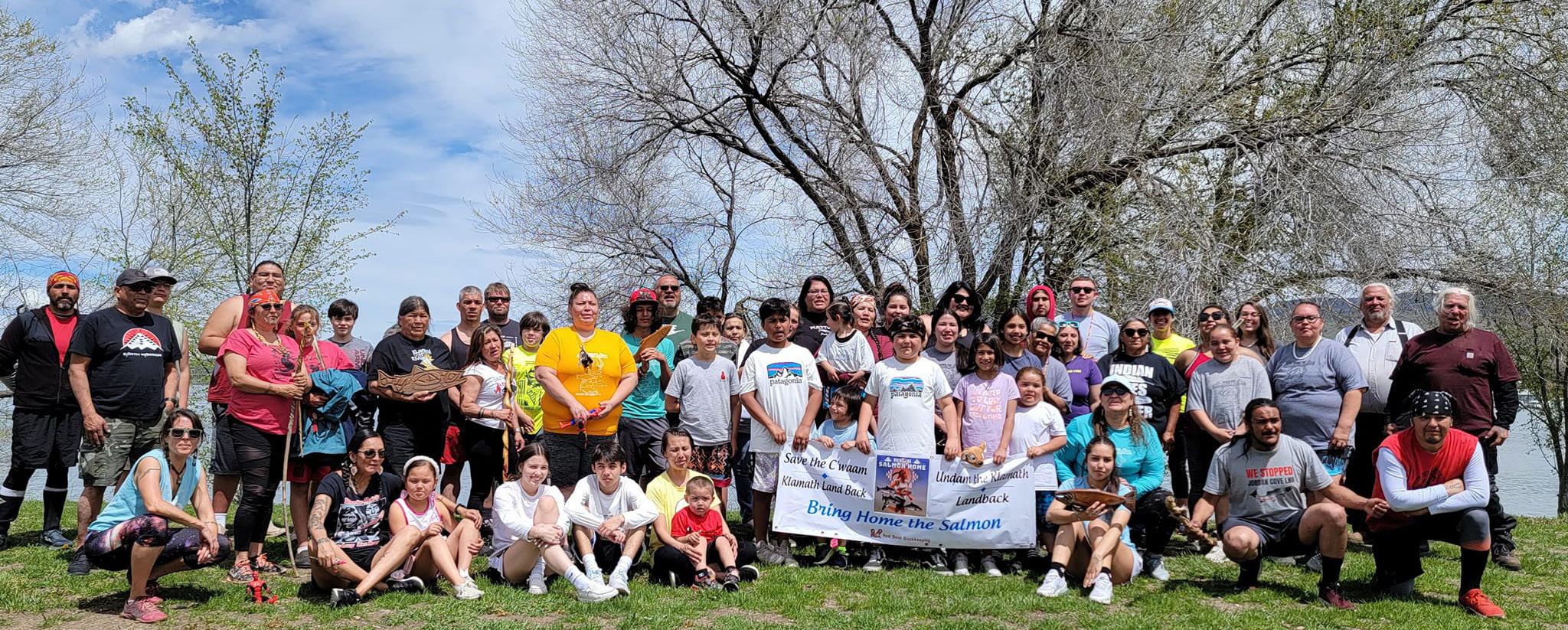
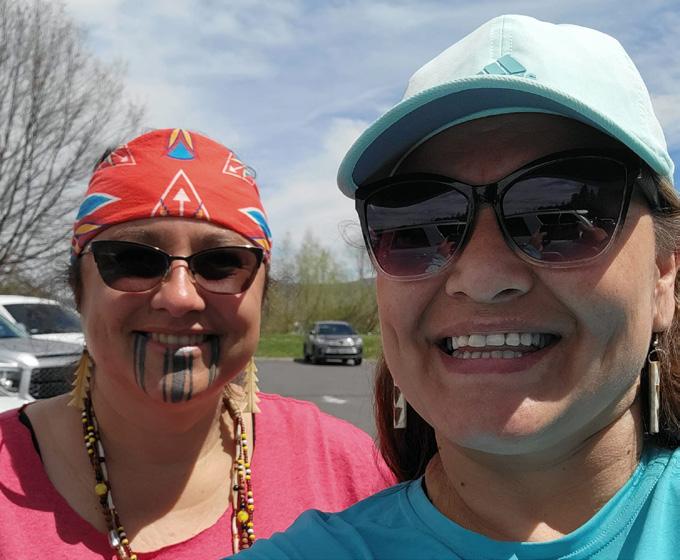
“It has never stopped being tied to youth,” Begay said. “I see young people from our community speaking up and still speaking for salmon and going into protests and using their voice to raise awareness.”
Organizers said that just because this is the last year the dams will be in use, doesn’t mean the run will come to an end.
“We’re not going to stop,” McAllister said. “We’re going to keep doing this and it’s going to turn into something different afterwards, because the salmon are always going to be on our agenda, to see




Riding a mountain bike with one gear, aka singlespeed, is a riot of fun, unless your knees are popping on a long, steep, arduous climb as you stand and try to mash your way to the top. Ha! Seriously, though, with only one gear, it harkens you back to the days of youth when you hopped on your bike and rode off the curb and into the woods, seeking adventure even though you maybe didn’t call it that then.
Around San Diego, there are countless trail systems that are great for singlespeed mountain biking, from Lake Hodges to Peñasquitos Canyon and on up to the Cuyamaca and Laguna Mountains. Keeping the ride
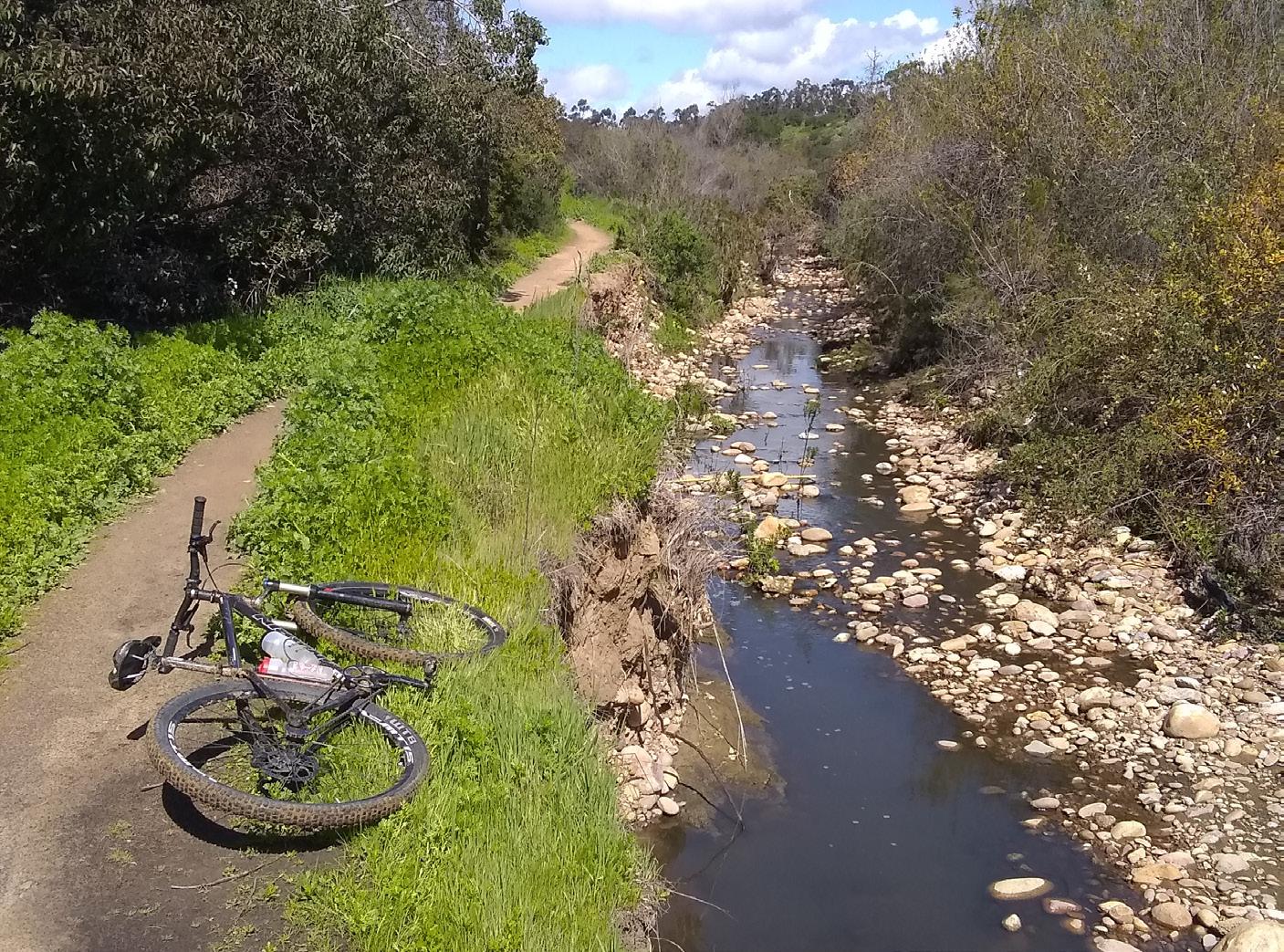
to what is more akin to cross-country trails, meaning undulating along with no serious, straight-up climbs, turning the cranks with only one gear means you simply pedal and don’t have the opportunity to flick the shifter and change gears.
Recently, on back-to-back singlespeed days, I connected trails in San Diego’s Mission Trails Regional Park and then the next day in Florida Canyon in Balboa Park. Mission Trails is a jewel of the city park system with over 8,000 acres of hills and valleys, making it one of the largest urban parks in the US. Lesser known, Florida Canyon offers trails that work their way along both sides of Florida Drive, which cuts through world-renowned Balboa Park’s east side. Both trail systems are open to hikers, bikers, trail runners and the occasional parent pushing a stroller!
San Diego is not in short supply of breweries. This time around, I’m going to feature two based simply on their can art, which depict bikes with one gear.
Groundswell Brewing Company set up shop in the Grantville neighborhood in 2013 and has quietly grown into a very

successful small operation, having expanded locally and picking up major awards (Great American Beer Festival) over the years. When I saw their Low Beams Hazy IPA cans, I had to pick up a 4-pack simply because of the image of what reminded me of one of my bikes when I was a kid. While I’ve had better tasting hazies and other Groundswell beers, I wouldn’t say it wasn’t good. I simply prefer other flavor profiles. groundswellbrew.com
Societe Brewing Company resides in the Kearny Mesa area of San Diego, specifically in the Convoy Asian Cultural District, where foodies flock.
IPA aficionados do, too, Societe being their proverbial watering hole, as well as nearby O’Briens Pub. Societe’s The Roustabout is a Double IPA coming in at 8.5%, a beer you likely want to have when you’re home or at camp and not heading out on the road. It doesn’t disappoint, at all, if a blast of citrus hops to your palate is what you’re looking for. The can art? A trapeze artist on a bike riding a high wire will get the conversation going. societebrewing.com
Around San Diego, there are countless trail systems that are great for single speed mountain biking, from Lake Hodges to Peñasquitos Canyon and on up to the Cuyamaca and Laguna Mountains.Florida Canyon in Balboa Park has great multi-use trails for bikers, hikers, and trail runners.
The Mexican Mine Trail will once again link Downieville and Forest City via singletrack
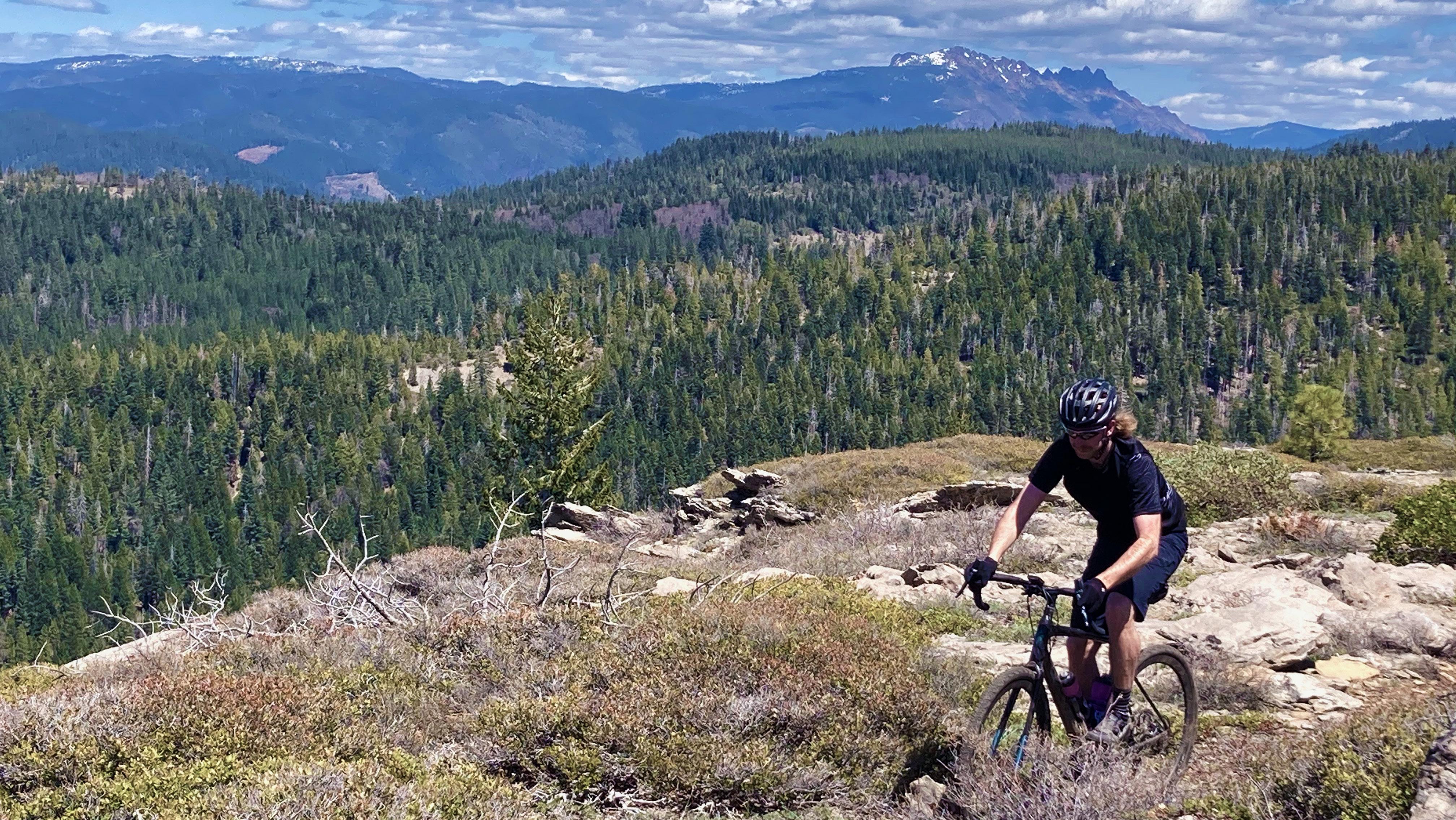 By Kurt Gensheimer
By Kurt Gensheimer
Most mountain bikers are familiar with the historic Gold Rush-era town of Downieville, California, known for its raw, rugged and rowdy trails and more than 5,000 vertical feet of descending. But far fewer people are familiar with an equally historic hamlet called Forest City, or simply just Forest, located less than ten miles to the southwest of Downieville, high up out of the North Yuba River canyon on Pliocene Ridge, only a couple miles from the mining outpost of Alleghany, home to the 16 to 1 Mine, one of the most productive gold mines in the world.
Featuring a network of nonmotorized singletrack in excess of 25 miles, Forest offers a less rowdy and less aggressive riding experience than Downieville, trading jagged sharp rocks and waterfalls for ribbons of loam flowing through beautiful stands of forest with handmade rock bridges and commanding views of Bald Mountain towering above town. If the long travel full suspension trail bike is best suited to Downieville, the lightweight crosscountry hardtail is best suited to Forest. Both communities boomed during the Gold Rush, with Forest boasting a population nearing 1,500 residents in the 1860s, evidenced by hundreds of buildings peppered in the back of a deep canyon along Oregon Creek under the shadow of Bald Mountain. Today there’s multitudes more bear than humans in Forest, counting barely five people and 20 buildings left standing, claiming status as the only townsite in America
owned entirely by the US Forest Service.
Back during the Gold Rush, the communities of Downieville and Forest were connected by a steep, six milelong pack trail running up Slug Canyon to the south of Downieville, gaining the ridge past the City of Six and Ruby Mine; two of several incredibly productive gold mines in the area between the two communities. But in the last 80 years, the trail up Slug Canyon disappeared, severing the singletrack link that served as a main connection between Downieville and Forest.
In the early 1990s, a group of individuals started resurrecting the historic water ditch lines running above Forest, trails like Sandusky, Plum Valley Ditch and Truckee Ditch. Then the Forest Trails Alliance (FTA) expanded on those original trails, adding to the network of fun, flowing cross-country style singletrack circling above town. The same mountain bike enthusiasts also started acquiring land leases from

the Forest Service in order to resurrect the historic homes in town so they could stay and ride, hike and work on the trails. But if you wanted to ride from Downieville to Forest, the only way was either up the impossibly steep Galloway Street south out of Downieville or the long and winding Mountain House Road out of Goodyears Bar.
However, the recent announcement by the Tahoe National Forest of receiving a $422,400 grant from California State Parks funded through the federal Recreational Trails Program (RTP) will once again connect the communities of Downieville and Forest via a singletrack called the Mexican Mine trail. The trail will also connect a third community, Goodyears Bar, five miles downstream from Downieville.
The Mexican Mine trail will run from Forest approximately 17 miles along the majestic Ruby Bluffs with commanding views of Saddleback Mountain to the north and the iconic Sierra Buttes to the
This page, top to bottom: Fred Stamm rides along the Ruby Bluffs near Forest City with commanding views of the Sierra Buttes; Forest City claimed more than 1,000 residents in the late 1800s. Opposite page: Elisabeth Johnson and Jeff Dengel relax post ride in “downtown” Forest City where only a handful of buildings remain.
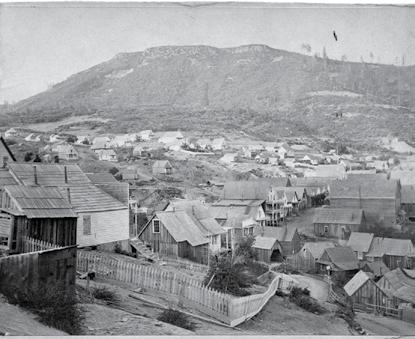
northeast. The trail will drop into the lush, spring-laden Rock Creek drainage, connecting into a section of the North Yuba trail already linking Downieville to Goodyears Bar, creating the ability to tackle a giant day on the bike riding out and back to Forest, or a point-to-point shuttle via driving up Mountain House Road from Goodyears Bar.
The Mexican Mine trail project has been a long time in the making, dating
back to 2007 when a small group of folks, including the Sierra Buttes Trail Stewardship (SBTS), imagined reestablishing the connection between Downieville and Forest. SBTS helped originally fund the NEPA (National Environmental Protection Act) studies required before any trail building could begin, but there were complications with wildlife surveys that delayed the process.
Five years ago the NEPA was completed and the project was considered “shovel ready,” but there was no funding available. So a small group of folks with ties to Forest City volunteered to start building the Mexican Mine connection, completing seven of the 17 total miles of new trail, primarily along the Ruby Bluffs near Henness Pass Road. Considering the final ten miles require some very remote trail work, the expense of walking in a mini-excavator and a trail
crew is too great for volunteer labor. And because there has been little to no funding available for non-motorized trail projects like Mexican Mine, the project stalled out for years.

Thanks to the efforts of the Tahoe National Forest and a recent change in the California State Parks RTP program to fund more non-motorized trail projects, the $422,400 grant application request for Mexican Mine was recently approved, securing enough funding to complete the final ten miles of trail needed to connect the Ruby Bluffs to the North Yuba trail.
According to Paul Hart, the Tahoe National Forest – Yuba River Ranger District trails manager, SBTS will be hired to help complete the work, with a projected starting date of summer 2023, taking two to three summers to finish.
“Out of $43 million in grant requests, only $4.68 million was awarded, and

The Connected Communities Project by SBTS aims to link 15 communities across four rural counties in Northern California through a network of approximately 600 miles of multi-use trail.
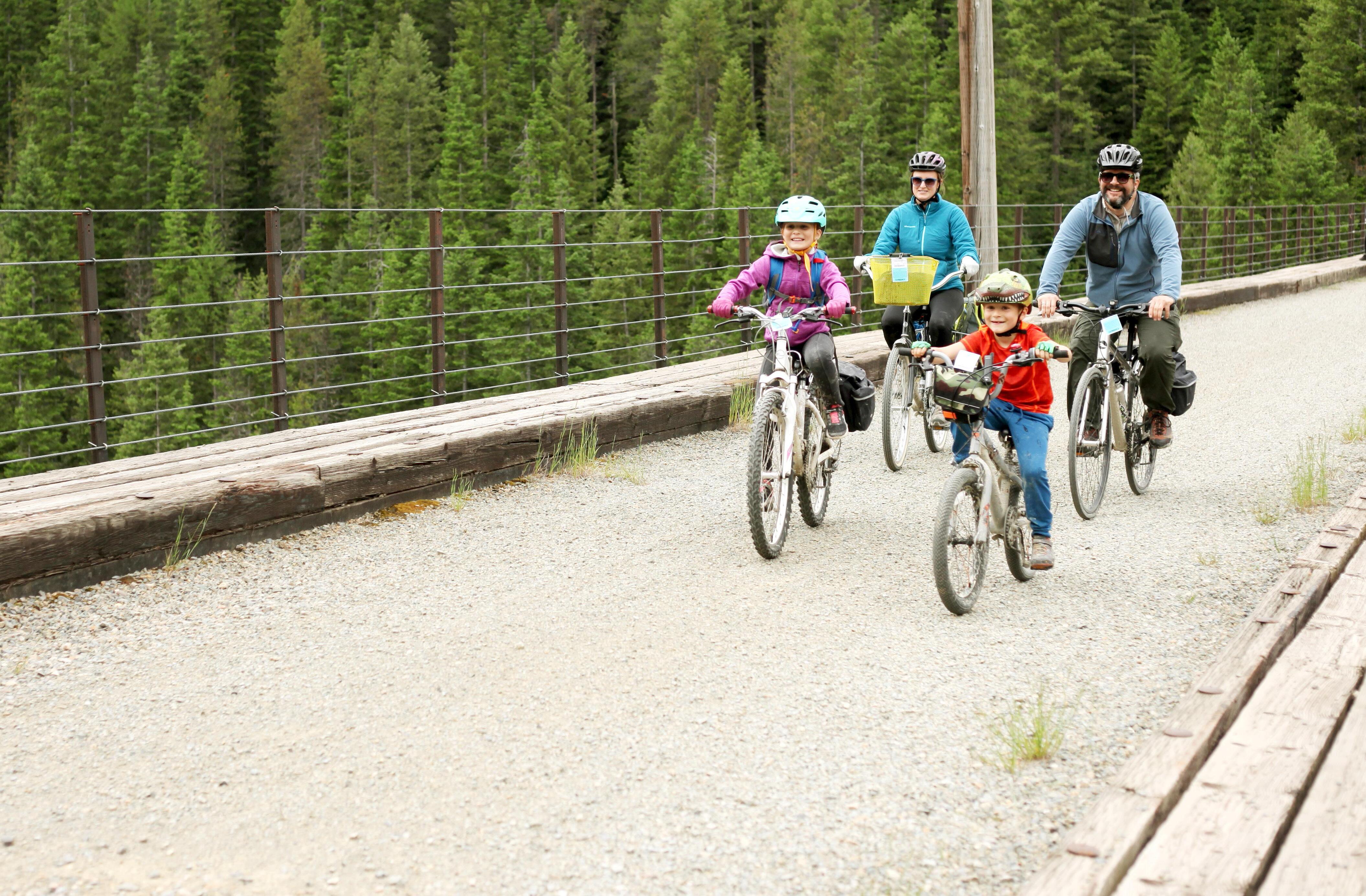
The Mexican Mine trail will be an important link in this legacy trail project, as well as being a viable singletrack route out of Downieville headed south, gaining Pliocene Ridge between the North and Middle forks of the Yuba River.
we feel very fortunate to be one of the seven recipients,” said Hart. “This project has been in the works for 15 years, and the challenge has always been finding non-motorized grant funding for construction. This is the first time in many years that State Parks has awarded non-motorized RTP funding, and we’re grateful to have been selected.”
Not only does this connection reestablish a singletrack link between three historic Gold Rush communities, but it also has bigger meaning as a connection. The Connected Communities Project by SBTS aims to link 15 communities across four rural counties in Northern California through a network of approximately 600 miles of multi-use trail. The Mexican Mine trail will be an important link in this legacy trail project, as well as being a viable singletrack route out of Downieville headed south, gaining Pliocene Ridge between the North and Middle forks of the Yuba River.
The Mexican Mine Trail will also be an important piece of solving the

Orogenesis puzzle, projected to be the longest mountain bike trail in the world, stretching nearly 5,000 miles from Canada to the tip of Baja California. Although much of the route already exists, there are a few hundred miles in the Sierra Nevada that have yet to be connected. One of the gaps in connections is from Downieville south towards Truckee and Lake Tahoe, and the Mexican Mine Trail out of Downieville will help alleviate that gap.
The Mexican Mine project is proof that when it comes to building new trails, patience and perseverance are of the utmost importance in seeing big ideas through. And given the positive track record of collaboration between SBTS and the Tahoe National Forest over the last 20 years, the light at the end of the Mexican Mine trail project is brighter than ever.
To get involved with volunteering for the Mexican Mine project, and to support the Connected Communities legacy trail project, visit sierratrails.org.

An exciting mission-driven future for this classic hilly ride
By Leonie ShermanI’m late to the party. Before I was even born local riders recognized the gem of sparsely populated mountain roads on the Central Coast and started the Santa Cruz County Cycling Club (SCCCC) to promote cycling, friendship, teamwork and fun. In 1978 they incorporated as a non-profit and 20 years later they decided to share the love by starting a group ride called the Santa Cruz Mountains Challenge (SCMC).
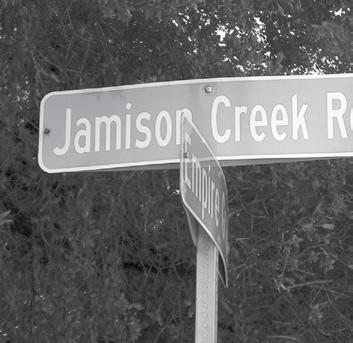
At first, most of the riders were locals, but as word of the fabulous course and friendly vibe spread, the SCMC began to attract riders from the Bay Area and beyond. Pre-pandemic the ride was attracting about 550 riders from around the country each year. Covid’s forced hiatus allowed the group to recharge, reset and refocus. This year’s ride will take place July 29, and they’re taking it to the next level by partnering with Ecology Action to offer family friendly options and build resilience around climate change.
Previously, the ride’s courses were designed for folks who wanted to push themselves hard all day in good company. “The Santa Cruz Mountains Challenge used to be like a local version of a death ride at sea level,”
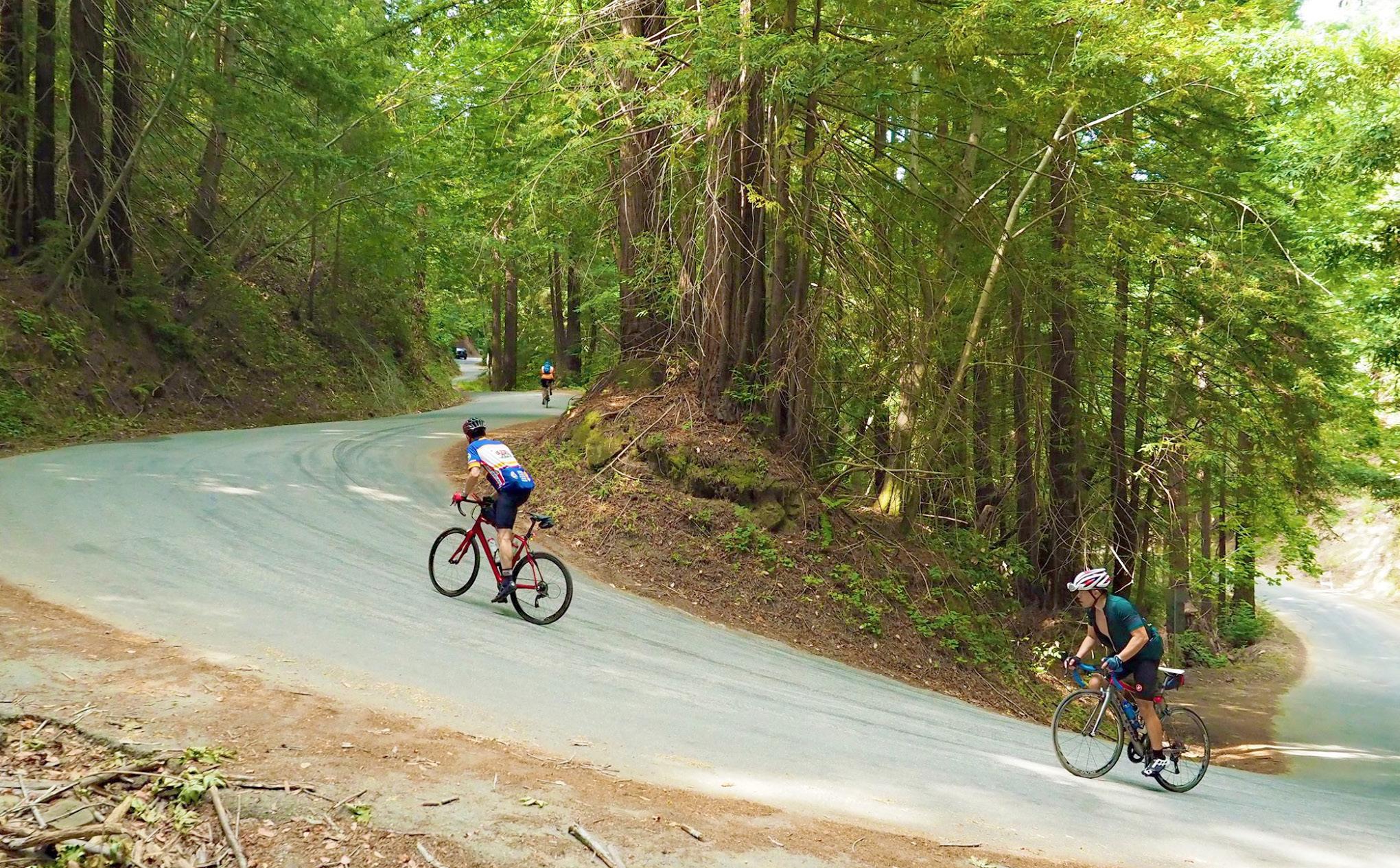
explains former SCCCC President and current SCMC Director Maura Noel. “Folks would do 100-125 miles with 13,000 feet of elevation gain. Even our shortest option had 6,000 feet of gain!”
During decades of involvement, Noel noticed that a lot of partners and families would drop off their riders in the morning and pick them up at the end of the day.
“So we thought, let’s see if we can include those folks and expand our ridership by adding some routes that don’t involve a ton of elevation, that regular folks can ride, like 50 miles to Watsonville,” she explains. “This year we are doing a group ride that will be inclusive and ‘no-drop’, where everyone sticks together or waits for people at designated spots. We’ll have a ride leader and a sweeper to make sure everyone is accounted for.”
After years staging the ride out of north county for easy access to mountain roads, this year the event will start and end at Cabrillo College. There will also be more options than ever, with five different rides for varying abilities and interests. This year’s line up includes a 50-mile ride through agricultural lands in south county, a 50-mile ride to the mountains in
north county, an option to combine the two for a century, a 125-mile option that adds a little bonus kick to the century, plus a family friendly ride from Aptos to downtown that highlights safe travel bike corridors and low-stress two-wheeled commuting options.
Three years ago, when the world went into lockdown, I got on my bike. My mental health starts with physical health, and I needed three to four 20-70 mile rides a week just to soothe my anxiety and sudden unemployment. A silver lining of the pandemic was learning to love road riding in Santa Cruz.
That last ride is courtesy of Ecology Action, a Santa Cruz based non-profit that works to support a thriving low carbon economy and build resilience in the face of climate change. They’ve been recipients of SCMC funds for years, but this year they became partners in the event. In addition to leading two commuter rides, they will sponsor family friendly activities, and lead discussions at monthly SCCCC rides throughout the year.
SCMC has always been an entirely volunteer effort, so all the money they raise goes back into the community. In the past, proceeds went to grant applicants like the UCSC Bike Co-op or Ecology Actions Youth Safety and Education program. This year SCMC decided to donate a chunk of the proceeds upfront. “We realized we wanted to donate to an organization that was doing work around climate change and sustainability, and then it was
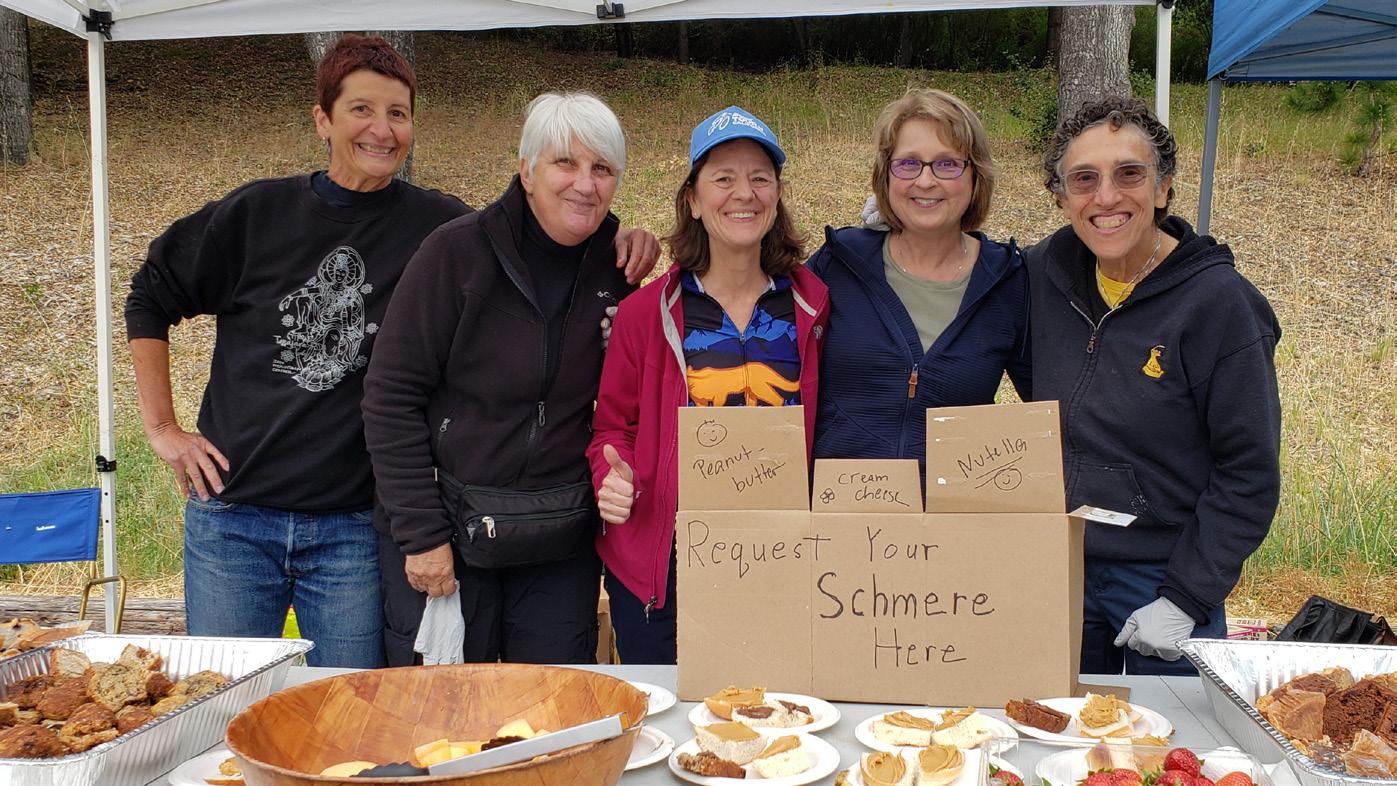

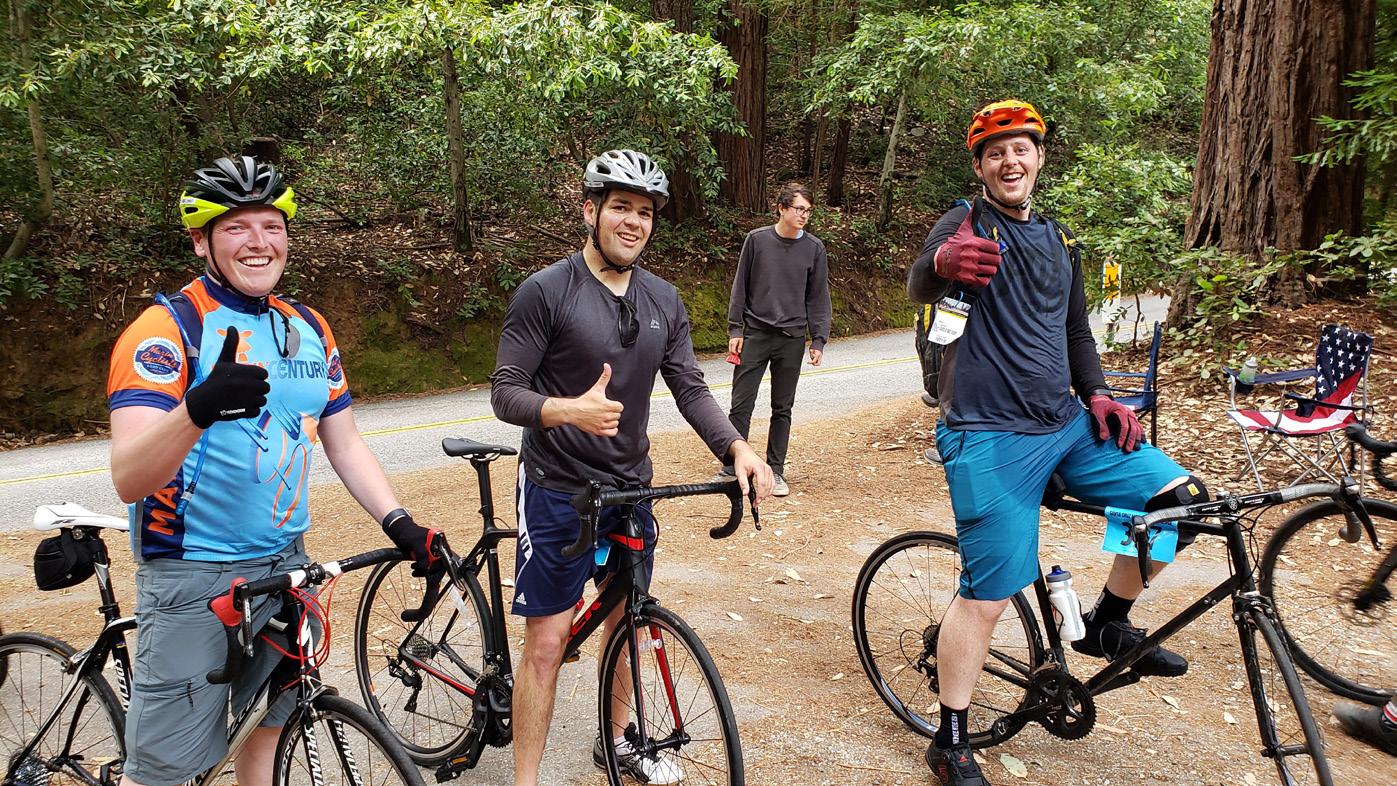


POWERED BY

obvious, of course, that would be Ecology Action,” explains Noel.
“It’s such a good fit!” exclaims Kirsten Liske, Ecology Action’s Vice President of Community Programs. “The ride is going to go through some of the deep burn areas and past massive slide repairs. It’s almost like a tour of the impacts of climate change, a reminder of what’s already happening and will get worse if we don’t all get serious.“
Liske believes endurance athletes make excellent climate warriors. “Think about it! What does it take to be an endurance athlete?” she asked me over the phone. “They have determination, the ability to set their sites on a long term goal, work hard, work with others, sacrifice and try new things to achieve their goals. Endurance athletes can stay focused and engaged when their mind is telling them it’s impossible or they don’t want to or when they have to overcome an injury. Those are all traits that we need to respond to the climate crisis. They are exactly who we need joining in this fight.”
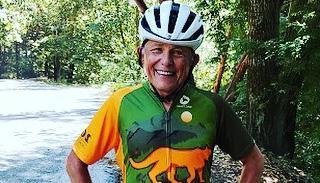
The SCMC showcases all those traits and adds the element of working together. “People who do the Santa Cruz Mountains Challenge know that being in community with others, whether you train with them or Strava or whatever, that is what keeps you going,” explains Liske. Perhaps no effort on the planet requires more cooperation than tackling climate change. Which means it’s got to be fun. To paraphrase Toni Cade Bambara, real progress on climate change hinges on making climate change irresistible. This year, the SCMC won’t be just a ride, it will be a climate festival. Ecology Action will offer a bike safety rodeo, a bike obstacle course, and an Electric Vehicles For Everyone exhibit that provides education and assistance on rebates and how to make an EV affordable.
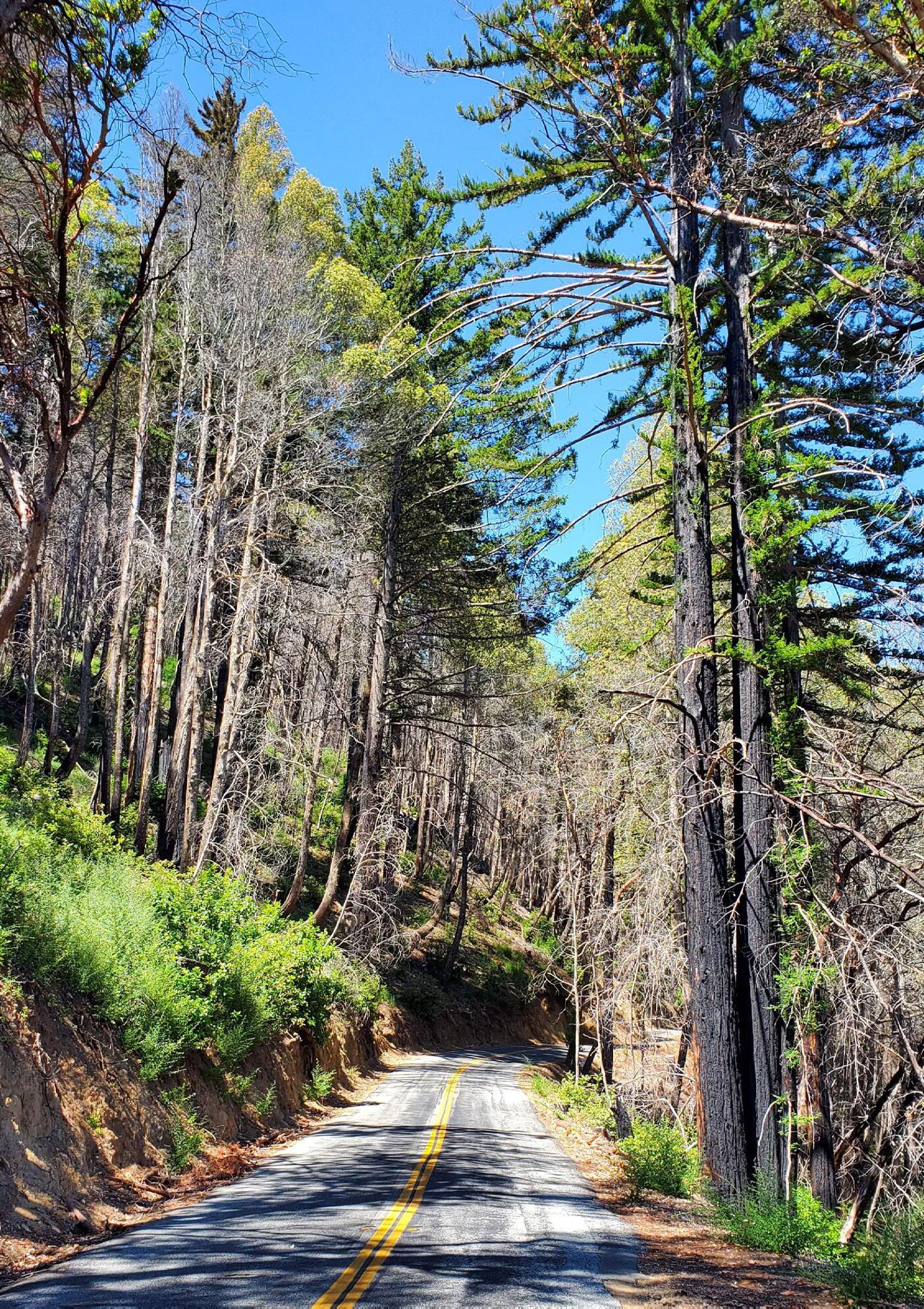
“60% of our emissions in the county come from transportation, especially personal transportation,” explains Liske. “A lot of folks will throw their bike on a vehicle to go mountain biking or road riding, and they’re driving to get to work or school or go grocery shopping.”

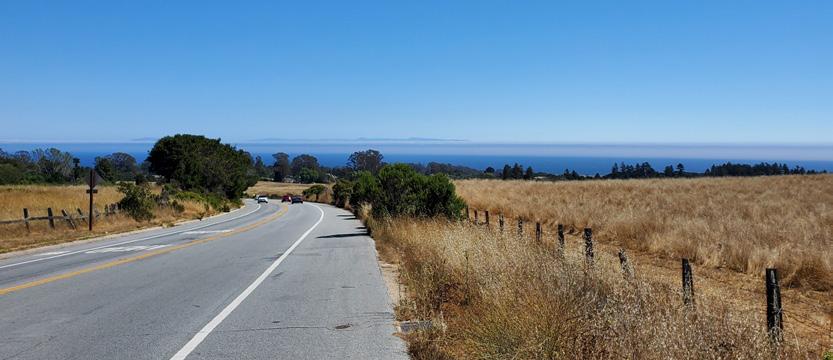
Ecology Action hopes their involvement in this event can inspire riders to reduce their carbon footprint by using their beloved two-legged steeds for transportation as well as recreation.

“Every bit of emissions we can reduce sooner will have exponential impacts later,” explains Liske. “The longer we wait to make changes, the less opportunity we have to do so, and more intense impacts we will face. We are already facing un-fun impacts, like wildfires, droughts, extreme storm events, countries that are two thirds underwater. This is accelerating at a rapid rate, so we need to fast track and front load our efforts now.”
Events like the SCMC, and partnerships like the one they are forming with Ecology Action offer a way to build resilience while having fun. “We need everybody to challenge their endurance athlete,” explains Liske. “This is not a crisis we are going to solve in our lifetimes, but the efforts we make right now are going to be crucial for avoiding some of the worst impacts further down the line.”


The bike industry was seeing a surge in popularity as more people saw bikes as beneficial to healthy lifestyles and a path towards energy independence. It was also the beginning of mountain biking in Santa Cruz and Bicycle Trip was there through it all. Fast forward to 2023 and things on Soquel Avenue in Santa Cruz have seen a lot of change. Only a cherished few businesses remain the same: the Rio Theater, The Crepe Place, Shopper’s Corner and Bicycle Trip. To endure for 50 years in anything — a marriage, a job, a business — means you’ve gotten the recipe right. Now, co-owned since 2014 by Aaron & Rachel Jacobs (Bicycle Trip 25-year employees), along with Berri Michel (owner since 1987), Bicycle Trip has remained a community staple because they got the bicycle recipe right. They have a passion for all things bikes. I dare you to walk into Bicycle Trip and not feel it. The passion oozes from the
walls here. Perhaps, it’s the undeniable history of Bicycle Trip, which has seen its share of bike innovators within its walls over the past 50 years, including Ross Shafer, John Caletti, Paul Sadoff, and Rick Hunter, to name a few. Perhaps, it’s the history of bikes that have made their way through the showroom. From the very first Stumpjumper, to the latest lightweight Cannondale eMTB, Bicycle Trip has supported it all.
“We love bikes, all bikes. My goal in life is to get as many butts on bikes as possible,” says Jacobs. Which means whether you’re a roadie, gravel, dirt, downhill, jump, electric, cruiser, or firsttime youth rider, Bicycle Trip has got you covered.
Michel’s 35-year belief in “bikes as part of the solution,” has led to various bicycle safety and educational programs. Her efforts include physical


bike lanes in Santa Cruz (it took her 10 years), and Project Bike Tech, a nonprofit whose programs offer a Bike Tech CTE (Career and Technical Education) high school class that prepares students for job opportunities in the bike industry, or any industry. “When kids take the class they become advocates for bikes, bike safety and see bikes as transportation. It can be a lifechanging class,” says Michel. Project Bike Tech is now in 31 high schools nationwide and growing.
Michel also started the Bike Safety Rodeo, which evolved into Bike Safe, a youth bike safety program by Ecology Action that partners with schools across Santa Cruz, Monterey, San Mateo, and Santa Clara counties. Since 2004, a total of 23,462 kids have participated in Bike Safe.
Michel credits the shop to “giving her a meaningful life,” and refers to Aaron as


her adopted son, and his wife Rachel as her best friend. Jacobs believes that the shop’s essence of passion keeps it alive, inspiring future sparks. He smiles as he says “change or die” is the motto for a bike shop, as all things will evolve. This thinking spurred their 2021 remodel that showcases the shop’s passion for bicycles and the undeniable pride of ownership. There is ample parking, and a space for women’s specific bikes and apparel. In addition, they will service all your mechanical needs in-house, regardless of bike make or where you bought it. Now, that is service with a smile, earning them the title “friendliest bike shop in town.”
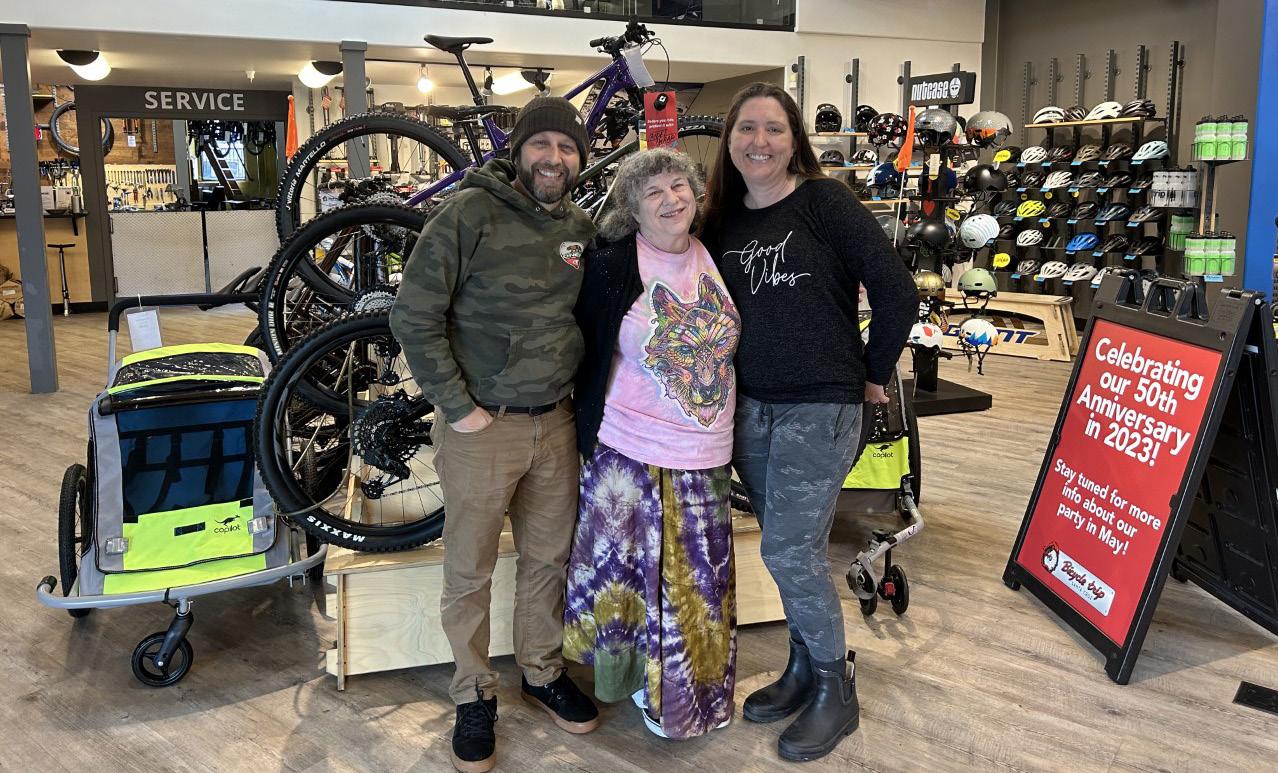
“It’s not all about your education, or how much money you make,” says Jacobs “it’s about how you carry yourself, and how you honor your relationships. We are a family here; I love coming to work.”

Come celebrate Bicycle Trip’s 50th anniversary on May 20th with live music, food, kids’ activities, a scavenger hunt, and raffle giveaways.
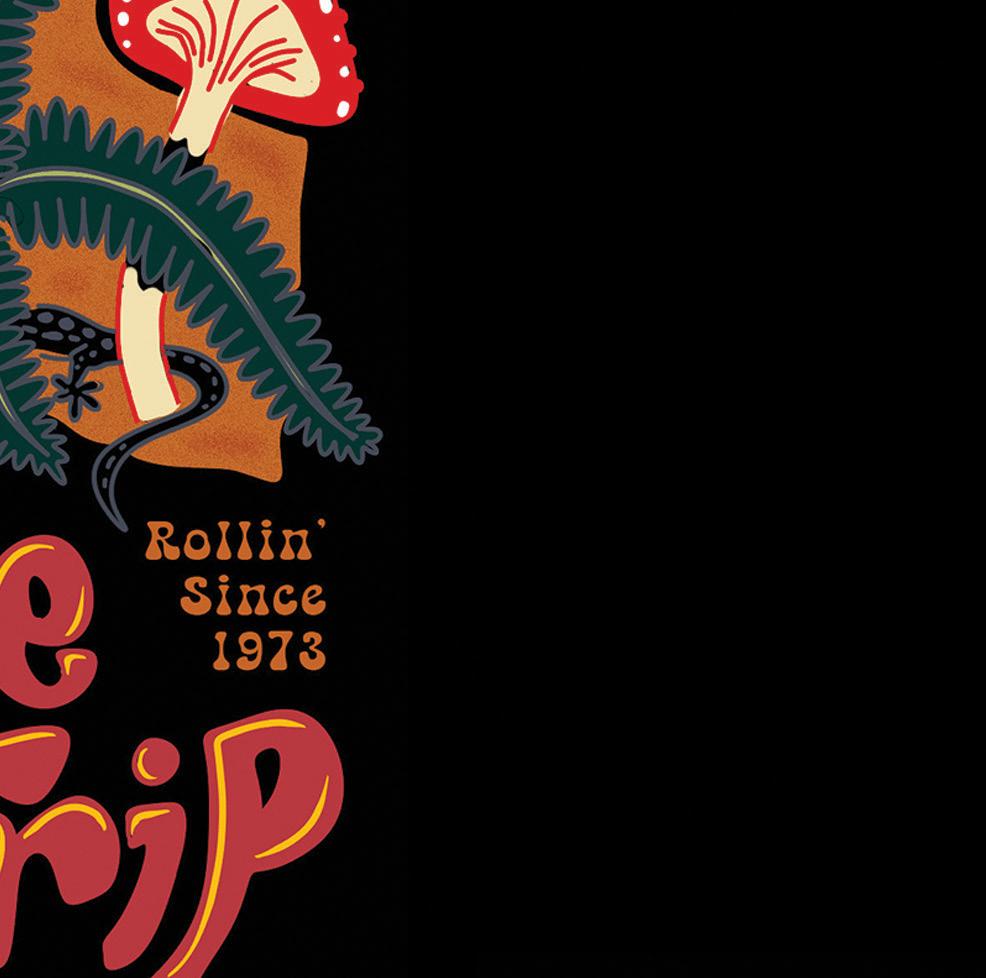
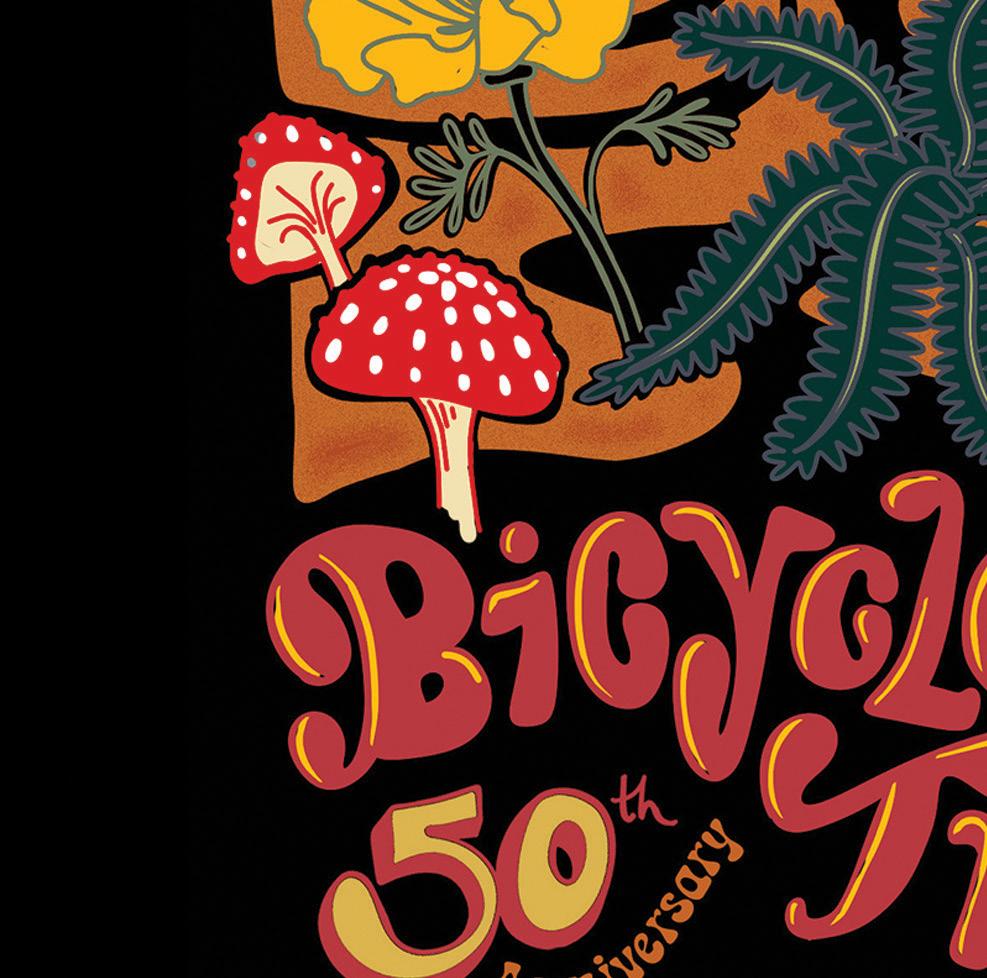
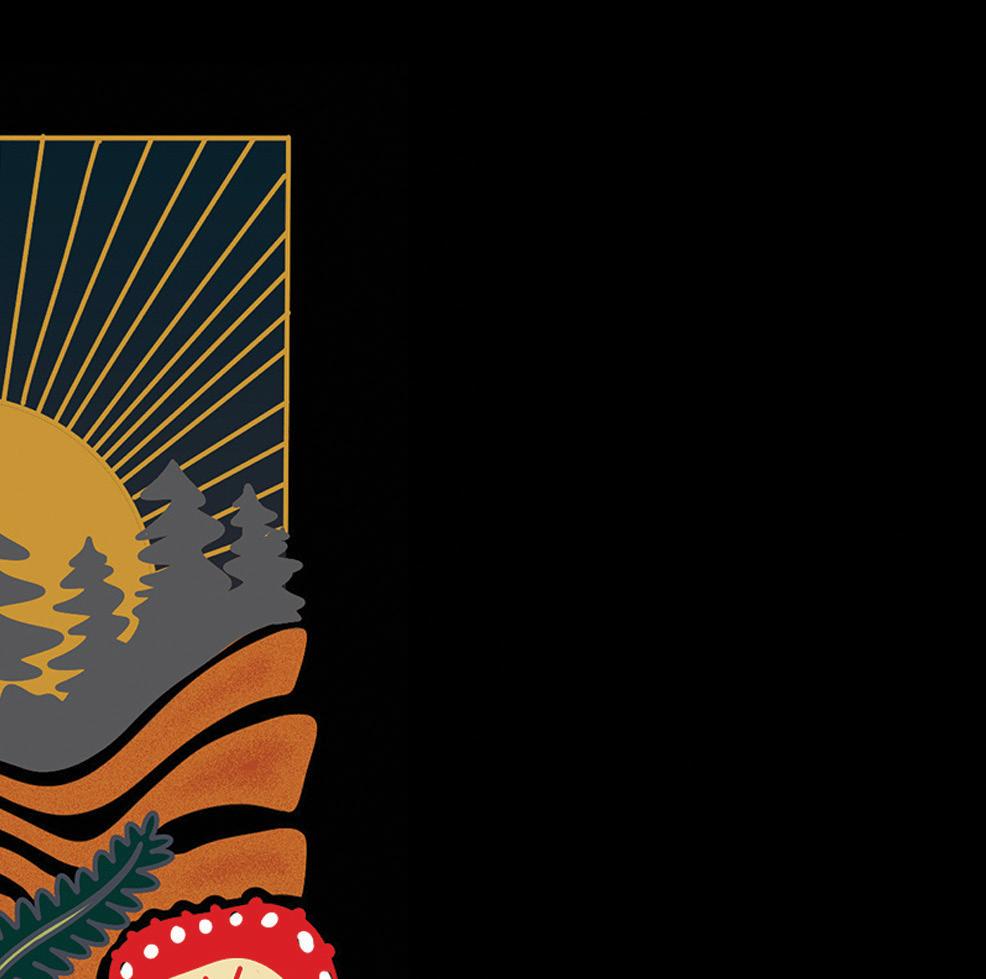

Fifty years ago, Pat Heitkam and wife Nancy opened the first bicycle shop in Santa Cruz. They named it Bicycle Trip and besides selling bikes, they also sold goat cheese and eggs from their farm just up the road. The year was 1973 and the hippie vibe was in full swing.

1 — Fish Rock / Boonville / BikeMonkey.net
1 — Marinduro / Fairfax / Marinduro.com



8 — Mulholland Challenge & Double Century / Agoura Hills / PlanetUltra.com



15 — Lake Sonoma / Lake Sonoma / GrasshopperAdventureSeries.com
15 — Bike Around the Buttes / Sutter / BikeAroundTheButtes.com
15 — Cinderella Classic & Challenge / Livermore / ValleySpokesmen.org/ CinderellaClassic
16 — Belgian Waffle Ride California / San Marcos / BelgianWaffleRide.bike
22 — Levi’s GranFondo / Windsor / BikeMonkey.net

22 — Tierra Bella Bicycle Tour / Southern Santa Clara County / TierraBella.org
23 — The Campagnolo Gran Fondo San Diego / San Diego / sdgranfondo.com
23 — Primavera Century / Fremont / Ffbc.org/Primavera
27 — Quick n’ Dirty Summer Series, #1 / Escondido / QuicknDirtyMTB.com
29 — Six Sigma Hopper / Lower Lake / GrasshopperAdventureSeries.com
29 — The Boob Ride / Orange County and San Diego / TheBoobRide.org
29 — Ridge to Bridge / Marin / RidgeTrail.org/events
29 - 30 — Chico Velo Wildflower Century / Chico / WildflowerCentury.org
4 — Quick n’ Dirty Summer Series, #2 / Escondido / QuicknDirtyMTB.com
6 — Ales and Trails / San Rafael / MTB Festival / AlesAndTrails.com

6 — Delta Century / Lodi / StocktonBikeClub.org/deltacentury
6 — Wine Country Century / Santa Rosa / winecountrycentury.com
7 — Grizzly Peak Century / Moraga / Grizz.org/century
7 — Mammoth Bar Enduro / Auburn / TotalBodyFitness.com
11 — Quick n’ Dirty Summer Series, #3 / Escondido / QuicknDirtyMTB.com
13 — I Care Classic Bike Tour / San Jose / ICareClassic.org
13 — Chain Smoker / Las Vegas, NV / QuicknDirtyMTB.com
18 — Quick n’ Dirty Summer Series, #4 / Escondido / QuicknDirtyMTB.com
20 — Georgetown Enduro / Georgetown / CaliforniaEnduroSeries.com
20 — Stetina’s Paydirt / Carson City, NV / StetinasPaydirt.com


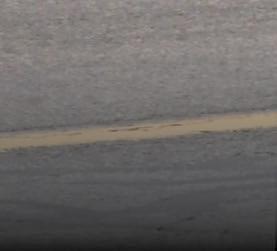
27 — Heartbreak Hundred / Los Padres National Forest / PlanetUltra.com

28 — The Art of Survival Century / Dorris / SurvivalCentury.com
1 — Quick n’ Dirty Summer Series, #5 / Escondido / QuicknDirtyMTB.com
3 — Ojai Valley Century / Ojai / OjaiValleyCentury.org
3 — Wente / Willits / RaceWente.com


3 — Eastern Sierra Double Century / Bishop / PlanetUltra.com
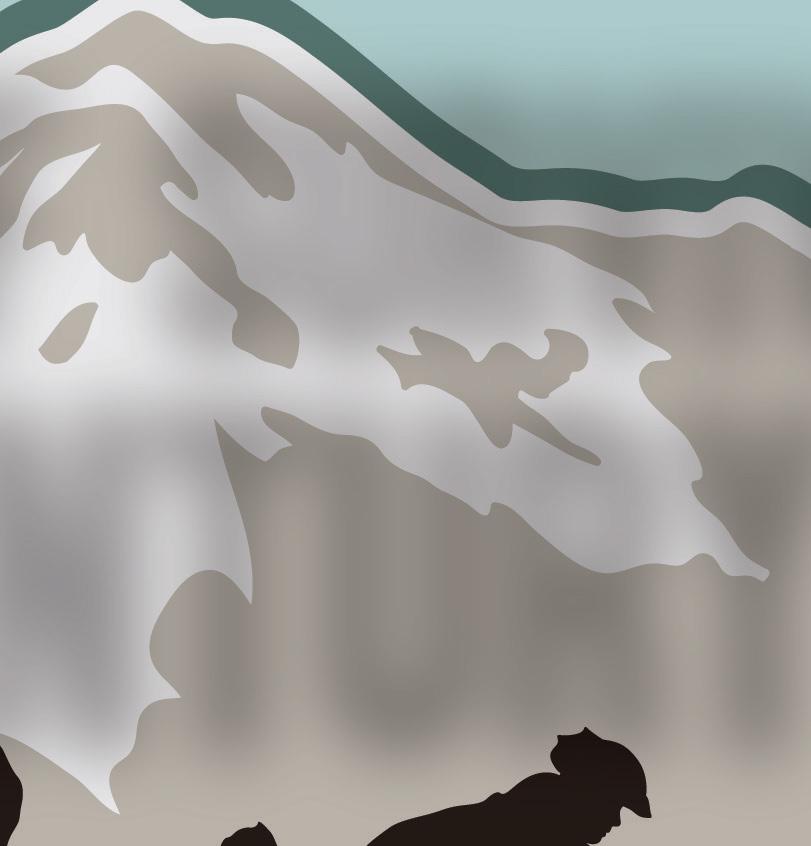
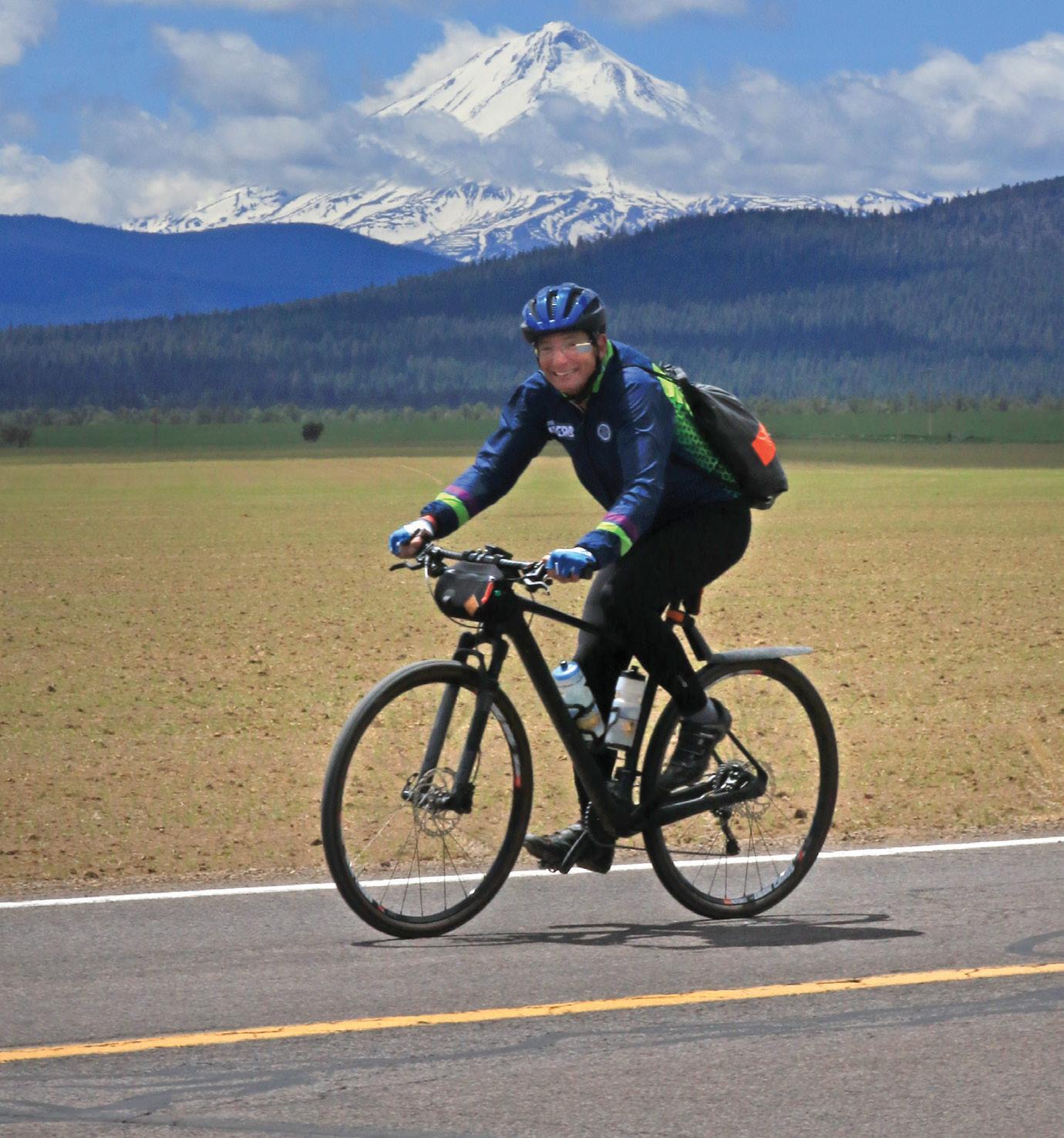
3 — Gold Country Cycling Challenge Road & Gravel Ride / Nevada City / RotaryGoldCountryChallenge.com
3 — LaGrange Classic / Weaverville / TrinityTrailAlliance.com
3 - 4 — Lost and Found Gravel Grinder/Festival / Portola / SierraTrails.org/events
4 — The Sequoia / Los Altos Hills / WesternWheelersBicycleClub. wildapricot.org/Sequoia
4 — America’s Most Beautiful Bike Ride / Lake Tahoe / TeamInTraining.org
17 - 24 — Sierra to the Sea Bicycle Tour / Tahoe to SF / SierraToTheSea.org
4 — Regalado Road Race / Oakdale / VeloPromo.com
4 - 10 — AIDS LifeCycle / Santa Monica / AIDSLifeCycle.org
8 — Quick n’ Dirty Summer Series, #6 / Escondido / QuicknDirtyMTB.com
10 — Giro di San Diego / Escondido / GiroDiSanDiego.com
10 — Truckee Tahoe Gravel / Truckee / BikeMonkey.net
10 — Fears, Tears, & Beers / Ely, NV / ElyNevada.net/fears-tears-and-beers
15 — Quick n’ Dirty Summer Series, #7 / Escondido / QuicknDirtyMTB.com
17 — Climb to Kaiser / Clovis / FresnoCycling.com/Climb-to-Kaiser
17 — Lake Tahoe MTB Race / Tahoe / AdventureSportsWeekTahoe.com
22 — Quick n’ Dirty Summer Series, #8 / Escondido / QuicknDirtyMTB.com
24 — Ruby Roubaix: Gravel Fondo / Lamoille, NV / RubyRoubaix.com
24 — Giro Bello / Sebastopol / GiroBello.com
24 — Groveland Grind / Groveland / New Date / Fundraiser for MTB trails / GrovelandTrailHeads.org
24-25 — Bike MS: LA Coastal Challenge / Santa Monica / BikeMS.org
13-16 — Downieville Classic / Downieville / 25 Year Anniversary / DownievilleClassic.com
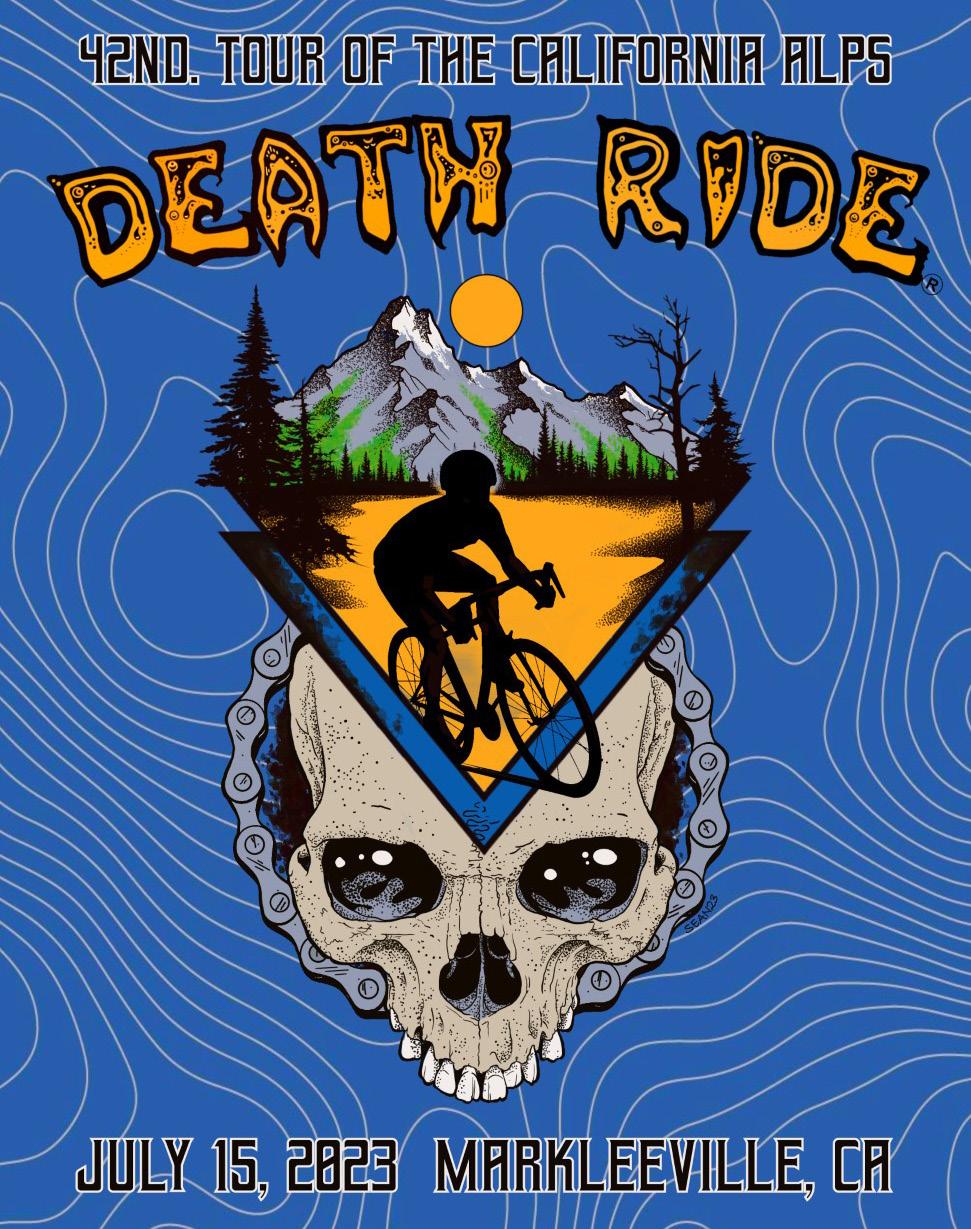
15 — Tour of the California Alps / Markleeville / World class cycling / You pick the challenge / DeathRide.com
15 — Mt Shasta Enduro / McCloud / CaliforniaEnduroSeries.com
29 — Santa Cruz Mountains Challenge / Santa Cruz / SantaCruzMountainsChallenge.com
5 — Tour de Big Bear / Big Bear Lake / BigBearCycling.com
19 — Cool Breeze Century / Ventura / CoolBreezeCentury.com
19 – 20 — Northstar Enduro / Truckee / CaliforniaEnduroSeries.com
2 — Tour de Fuzz / Santa Rosa / TourDeFuzz.org
2 — China Peak Enduro / Lakeshore / CaliforniaEnduroSeries.com
9 — Mammoth Gran Fondo / Mammoth Lakes / MammothGranFondo.com
9 — Race the Rails / Ely, NV / ElyNevada.net/Race-The-Rails
9 & 16— Ride the Rim / Crater Lake National Park / 25 miles and 3,500 feet of climbing / RideTheRimOregon.com
9 — Lassen Gravel Adventure / Susanville / BizzRunningCompany.com
11 — Rock Cobbler & Pebble Cobbler / Bakersfield / RockCobbler.com
16 — Tour of the Unknown Coast / Ferndale / TUCcycle.org
17 — Eroica California / Cambria / Eroica.cc
22 - 24 — Silver State 508 / Reno, NV / the508.net
24 - 30 — Oatbran / Bike Across Nevada / America’s Loneliest Bike Tour / BikeTheWest.com
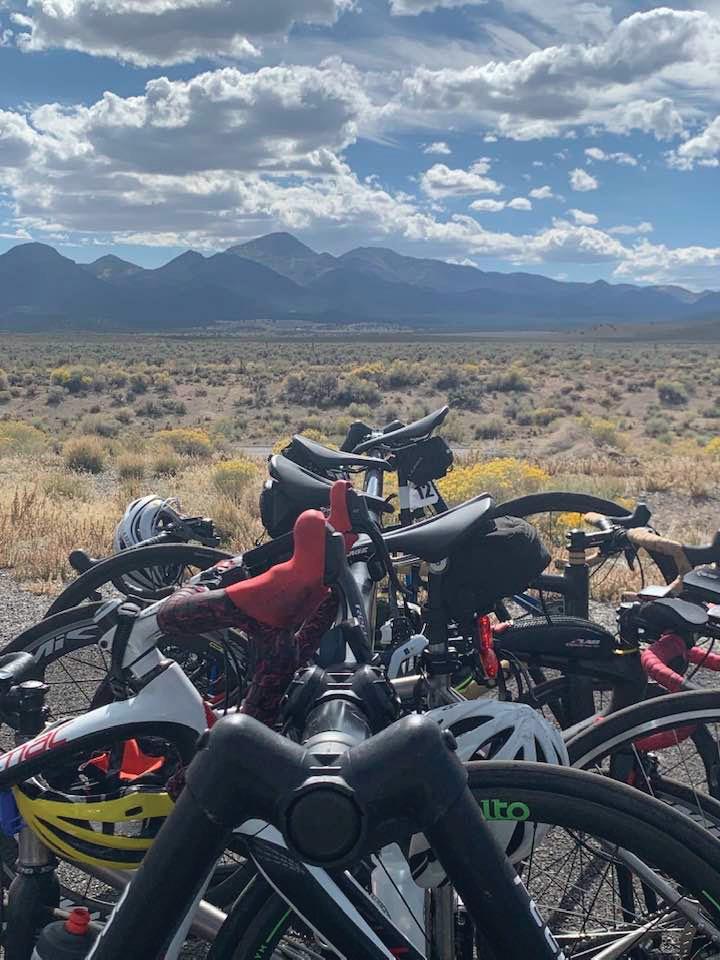
23 — Coyote Classic XC Series #1 / Boulder City, NV / BootlegCanyonRacing.com
30 — Ashland Mountain Challenge / Ashland, OR / CaliforniaEnduroSeries.com
30 — Sacramento Century / Sacramento / SacramentoCentury.com
APRIL
15 — Mt. Tam Wild Boar Half Marathon & 10K / Mt. Tamalpais State Park / Envirosports.com
29 — Ridge to Bridge / Marin / RidgeTrail.org/events
29 — American River Parkway Half / Carmichael / ParkwayHalf.com
29 - 30 — Badwater Salton Sea / Borrego Springs / Badwater.com
MAY


6 — Miwok 100K / Stinson Beach / Miwok100K.com
7 — Fair Oaks Sun Run / Fair Oaks / FairOaksSunRun.com
13 — Paiute Meadows Trail Run / Susanville / BizzRunningCompany.com
13 — Dirty Secret Trail Run / Cool / DirtySecretTrailRun.com
13 — Quicksilver Endurance Runs - 100K & 50K / San Jose / QuicksilverRunning.com

20 - 21 — Bishop High Sierra Ultras / Bishop / BishopUltras.com
21 — Surfer’s Path Half Marathon / Santa Cruz & Capitola / RunSurfersPath.com
28 — Siren Run and Walk / Minden / RideresAgainstRacism.com
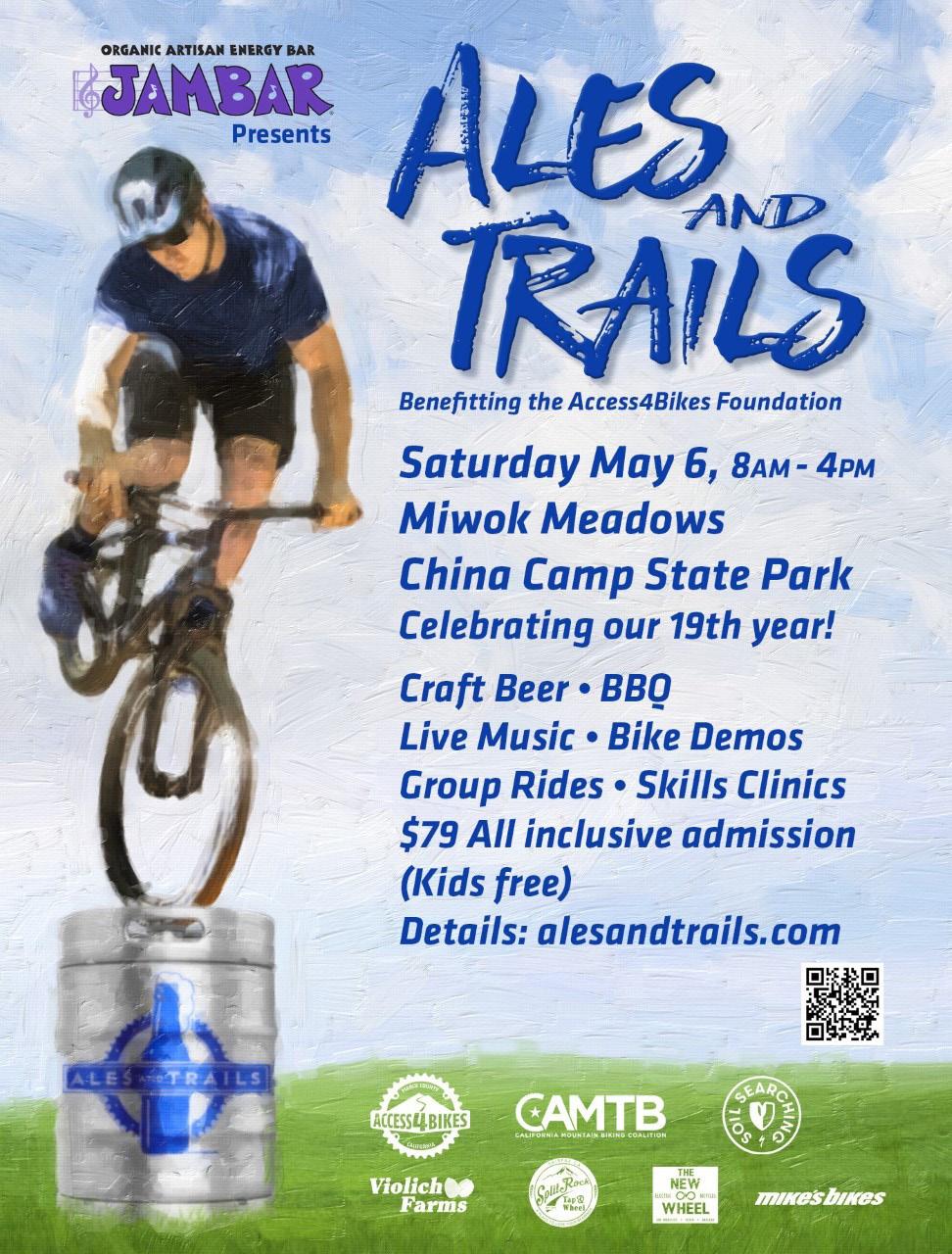
JUNE
4 — Women’s Fitness Festival / Sacramento / WomensFitnessFestival.com
10 — Olympic Valley Half and 8 Miler / Olympic Valley / OlympicValleyHalf.com
17 — Rock Tahoe Half Marathon / Lake Tahoe, NV / EpicTahoe.com
18 — Burton Creek Trail Runs / Tahoe City / 6K, 12K, Half Marathon / TahoeTrailRunning.com
24 - 25 — Western States 100 / Olympic Valley / wser.org
JULY
4 — Run to the Beach LakeTahoe 5K & 10K / Tahoe Vista / TahoeTrailRunning.com
4 - 6 — Badwater 135 / Furnace Creek & Lone Pine / Badwater.com
16 — Big Chief 50K / Tahoe / BigBlueAdventure.com
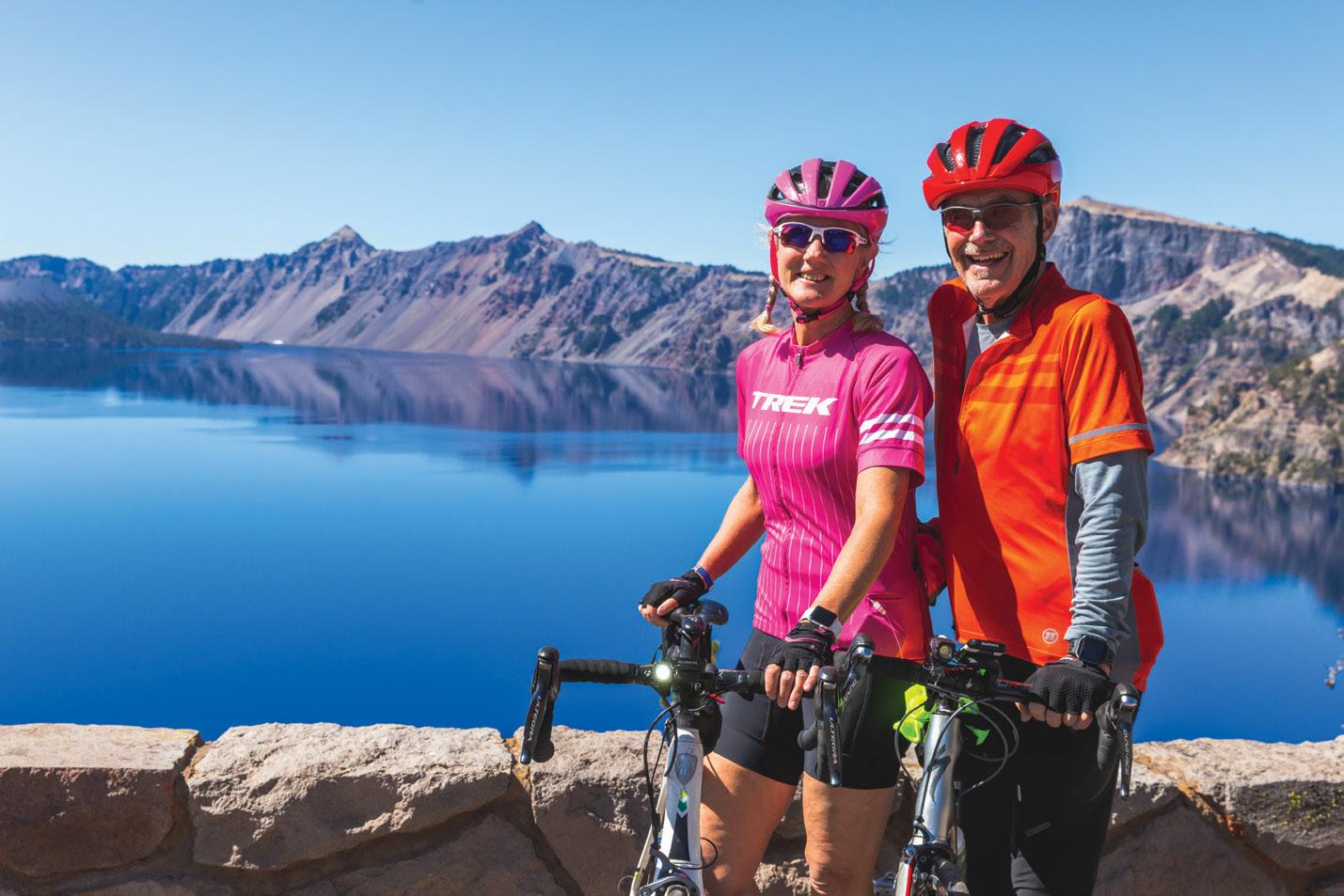
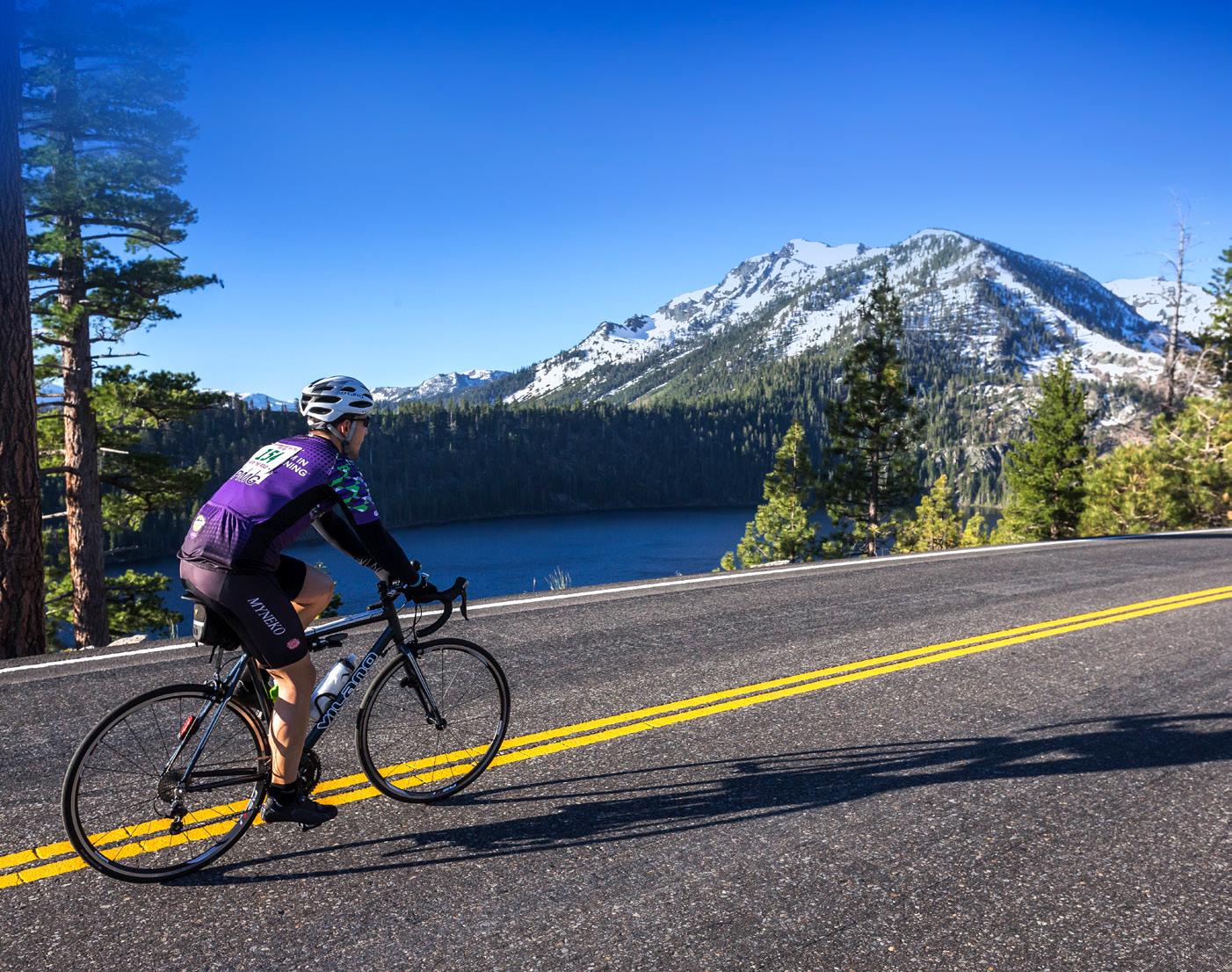
22 - 23 — San Francisco Marathon / SF / TheSFMarathon.com
29 — Truckee Half Marathon & 5K / Truckee / BigBlueAdventure.com
AUGUST
5 — Ward Mountain Trail Run / Ely, NV / ElyNevada.net
Go to the EVENTS page on our website for more information and direct links to events.
DATES AND DETAILS SUBJECT TO CHANGE. CHECK WITH EVENT PRODUCERS.
RUNNING, cont.
11 – 13 — Remembrance Run / Yerington to Carson City / A prayerful journey from Yerington Paiute Tribe to Stewart Indian School Cultural Center & Museum / Find “2023 Remembrance Run” group on Facebook


13 — Marlette 50K & 10 Miler / Spooner Lake, Tahoe / BigBlueAdventure.com
27 — Good Dog - Dirty Dog 5K/10K / Folsom SRA / TotalBodyFitness.com
SEPTEMBER
2 — She Rocks the Trails / Auburn / NorCalUltras.com
10 — Buffalo Stampede / Sacramento / BuffaloStampedeRun.com
16 — Emerald Bay Trail Run / Lake Tahoe / BigBlueAdventure.com
17 — XTERRA Lake Tahoe 5K and 10K / Incline Village, NV / TahoeTrailRunning.com
23 — Mermaid Run San Francisco / Golden Gate Bridge / 5K, 10K, Sirena 10 Mile, Virtual / MermaidSeries.com
23 — Gold Rush Growler 10 Mile & 5K Trail Runs / Granite Beach / TotalBodyFitness.com
30 — Great Trail Race / Tahoe City to Truckee / 30K / GreatTrailRace.com
30 - Oct 1 — United Airlines

Rock ‘n’ Roll San Jose / San Jose / RunRocknRoll.com/san-jose
APRIL
15-16 — 50th Annual Bjornloppet / Bear Valley / BVadventures.com


JUNE
24 — Tahoe City Swim / Tahoe City / TahoeSwimming.com

JULY
23 — Alpine Fresh Water Swim / Truckee Donner Lake / TahoeSwimming.com
AUGUST
13 — Tahoe Sharkfest Swim / Incline Village, NV / SharkFestSwim.com
28 — Lake Tahoe Open Water Swim / Tahoe / TahoeSwimming.com
APRIL
30 — Orange County Tri Series / Lake Mission Viejo / OCTriSeries.com
MAY
13 — Folsom Lake International Triathlon / Folsom Lake / TotalBodyFitness.com
21 — Morgan Hill Sprint Triathlon / UVAS Reservoir / USAPevents.com
JUNE
10 — TRI for REAL #1 / Rancho Seco Park, Herald / TotalBodyFitness.com
24 — Tahoe Off-Road Triathlon / Tahoe City / AdventureSportsWeekTahoe.com
JULY
8 — TRI for REAL Triathlon #2 / Herald / TotalBodyFitness.com
9 — TRI for FUN Triathlon #2 / Herald / TotalBodyFitness.com
15 — Great American Triathlon / Sacramento / GreatAmericanTriathlon.com
22 - 23 — Donner Lake Triathlon / Truckee / DonnerLakeTri.com
AUGUST
6 — Tri Santa Cruz / Santa Cruz / FinishLineProduction.com
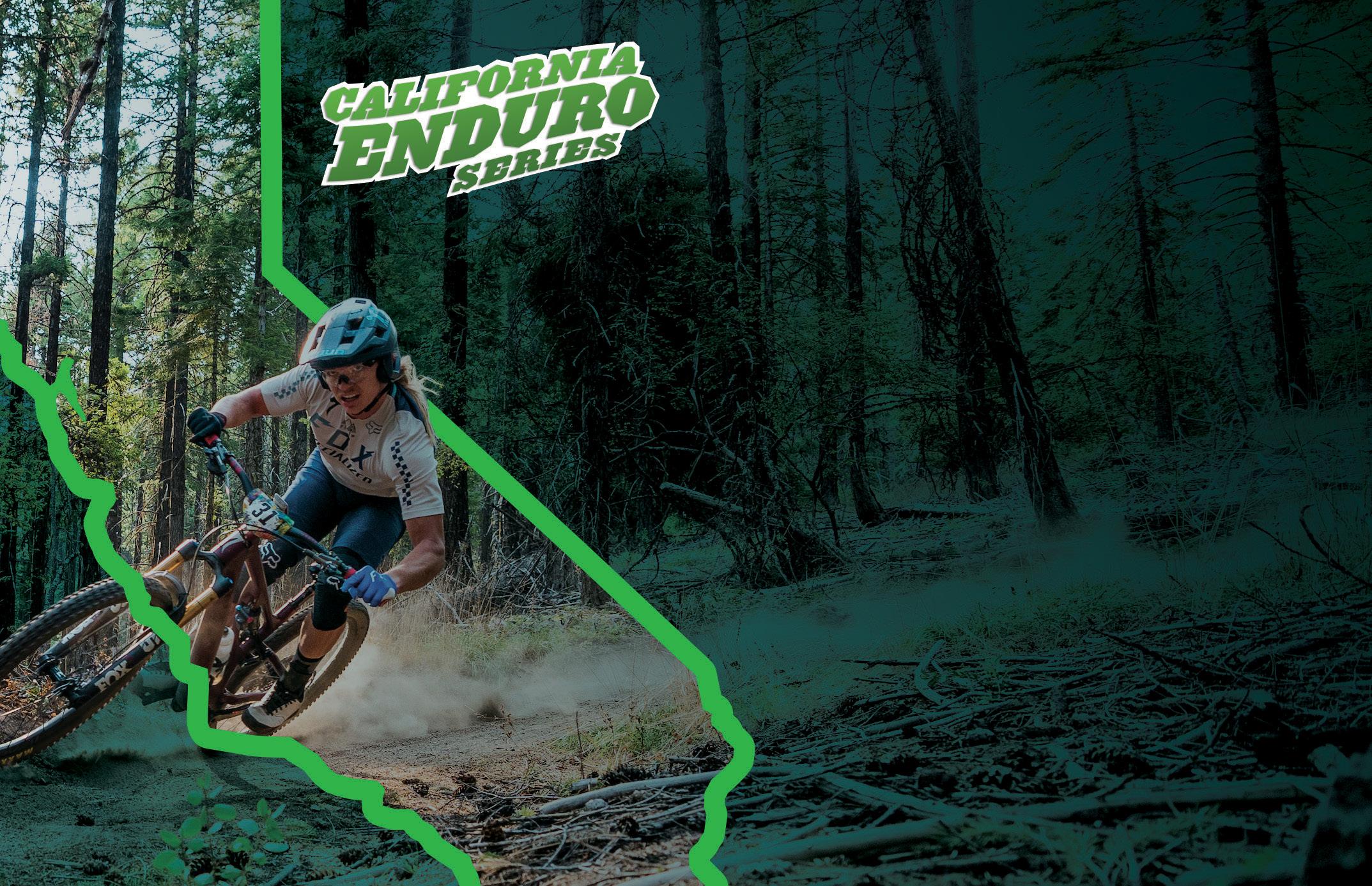
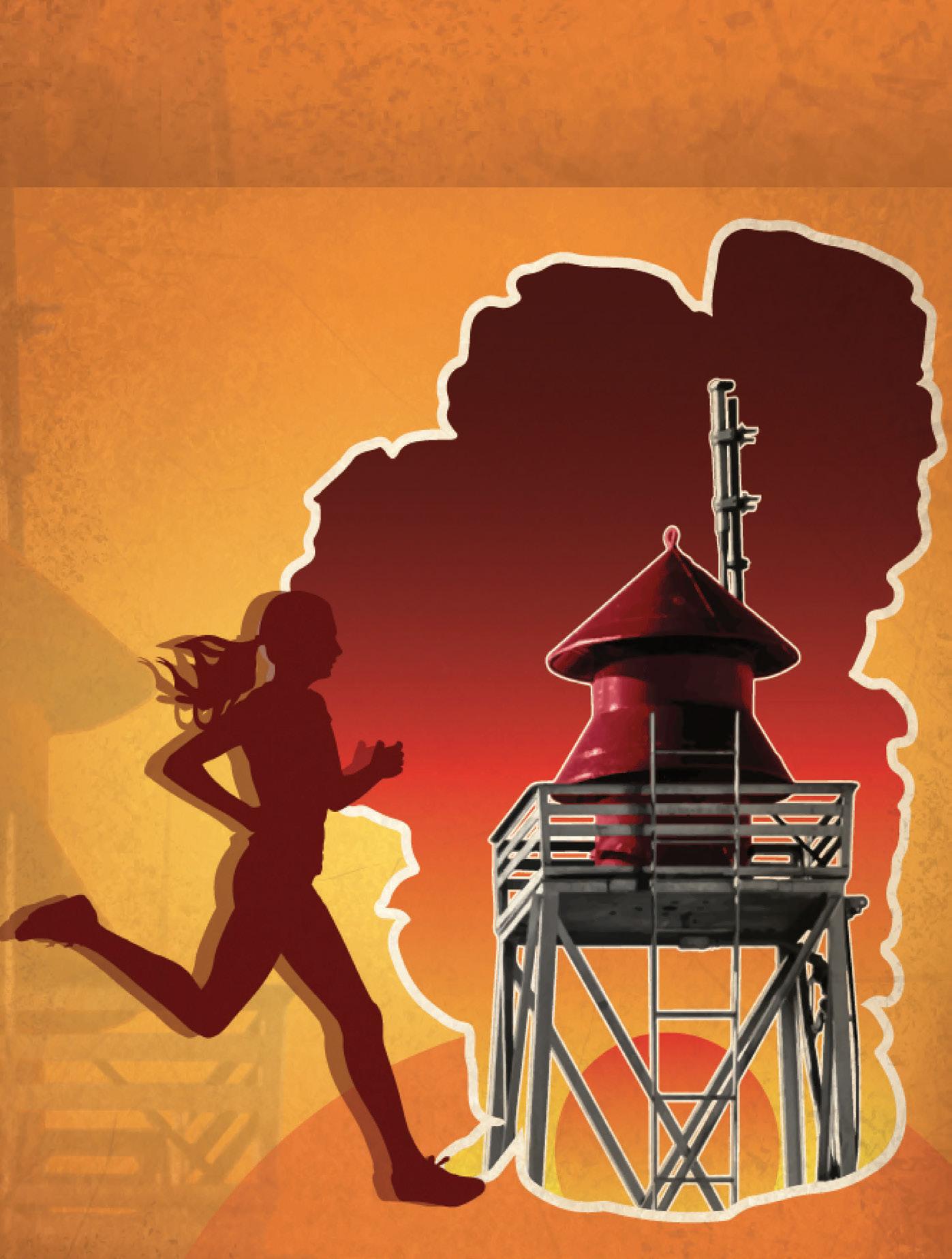
If you’re a mountain runner, the Veil 6L Lightweight Running Vest from Rab might just become your new best friend. New for spring/summer ‘23, the Veil boasts multiple storage options, water bladder compatibility, and a fabulous fit. The multi-directional Mono Mesh Chassis, with stretch side panels, and engineered with Ripstop construction, creates enhanced support, reduced bounce, and a supportive fit. Weighing in at only 11 ounces (with the two included 500mL soft flasks), the Veil is fully adjustable and has a customizable sternum fit system for full freedom of movement.
This vest also maintains impressive storage capacity starting with the internal back panel sleeve which can hold a 2L hydration bladder. Upper back and dual access lower stretch stash pockets, plus two upper flat stretch pockets and two lower vest front stretch stash pockets keep multiple items secure while giving you easy access. We also love the rear bungee pole holder for easy on-the-go storage.
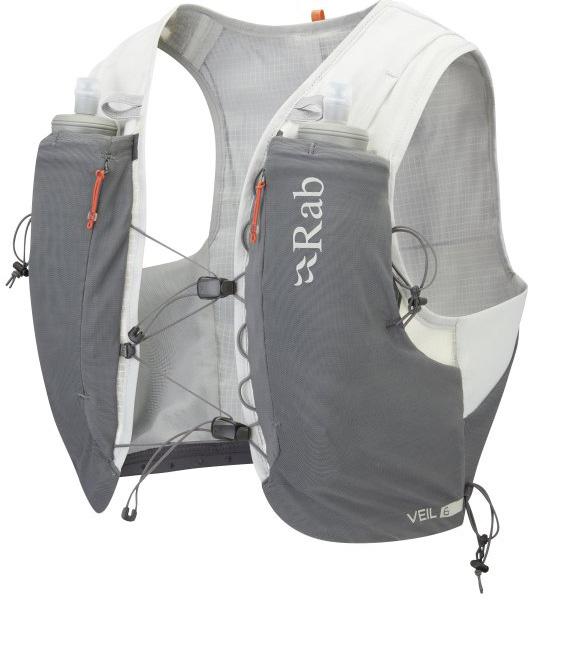
Go ahead and give it a try on your toughest runs in the rockiest terrains — you’ll see Rab has thought of just about everything. Bonus: the Veil is a fluorocarbon-free product, from a socially and environmentally conscious and certified Climate Neutral Company.
MSRP: $150.00 • rab.equipment/us
2
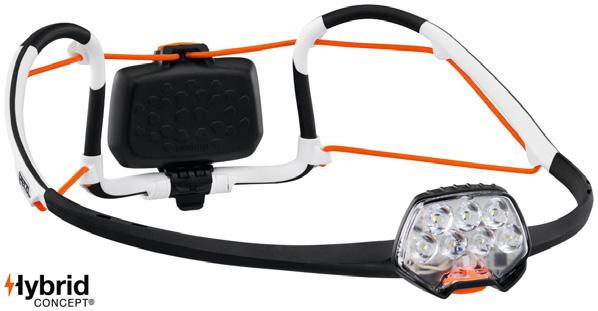
Petzl has introduced a whole new level of innovation in its IKO® CORE rechargeable headlamp and we couldn’t be more excited about its unique design and versatile functionality.
The most obvious distinction from a traditional headlamp is the IKO® CORE’s all-new super-light AIRFIT® headband which uses significantly less contact area than the usual strap. In other words, you barely feel it on your head – and it doesn’t absorb rain or sweat, either. Bliss, right?
But the cool stuff doesn’t stop there. This versatile headlamp easily transforms into a freestanding lantern. Slip the included light diffuser over the lamp to give a soft glow in camp.
The Petzl IKO® CORE’s slender lamp body offers optimum light positioning and comes with Petzl’s CORE rechargeable battery (which delivers 500 lumens of brightness) but also allows for standard AAAs to
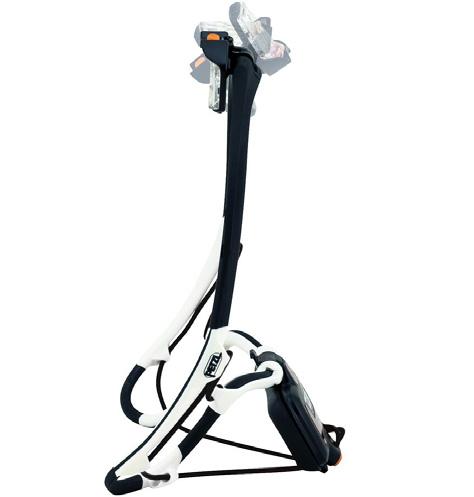
be used (350 lumens).
As a final sweet touch, this nifty gadget folds up neatly and compactly into its lightweight storage pouch, small enough to tuck into your pocket.
The IKO® CORE headlamp weighs in at a mere 79 grams, and is compatible with all Petzl helmets.
MSRP: $99.95 • petzl.com
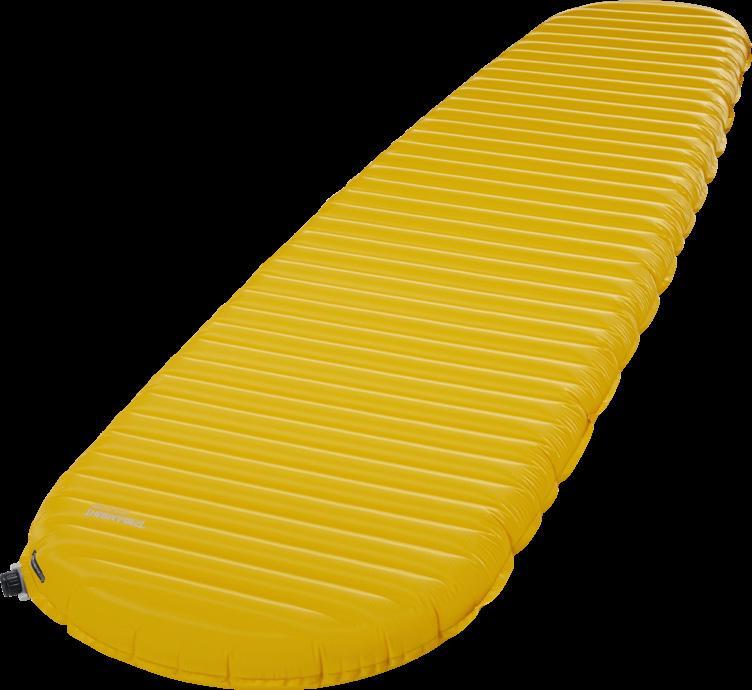
Therm-a-Rest has boosted its bestselling NeoAir XLite™ sleeping pad with a serious upgrade this season, dialing up the comfort and down the noise.
NeoAir XLite™ NXT improves on its predecessor – already renowned for being an exceptional all-season ultralight air sleeping pad – by refining the way its innovative design (Triangular Core Matrix™) integrates with its warmth-generating technology (ThermaCapture™) to drop the crinkly noise (also
something it was well known for) down by a whopping 83%.
The NeoAir XLite™ NXT is easy to inflate and deflate using the innovative WingLock™ Valve. This valve also makes it easy to let out air as needed to make those comfortcritical micro-adjustments when you’re laying down on the pad.
This latest model also boasts a comfier profile, adding half an inch to now measure in at three inches (7.6 cm) thick, but at no cost to weight (12.5 ounces/354 grams for the regular size). A solid 4.5 R-value is ideal for year-round temps and it packs down to the size of a one-liter bottle. Think of all the solid sleep you’ll be getting in the wilds with that extra quiet and comfort!
Four size options available (regular short, regular, regular wide, and large). Pump sack, stuff sack and field repair kit included.
MSRP: $199.95 - $239.95 • thermarest.com

The Maya 20 is the perfect pack choice for any day hike, whether short or epic, and all year ‘round.
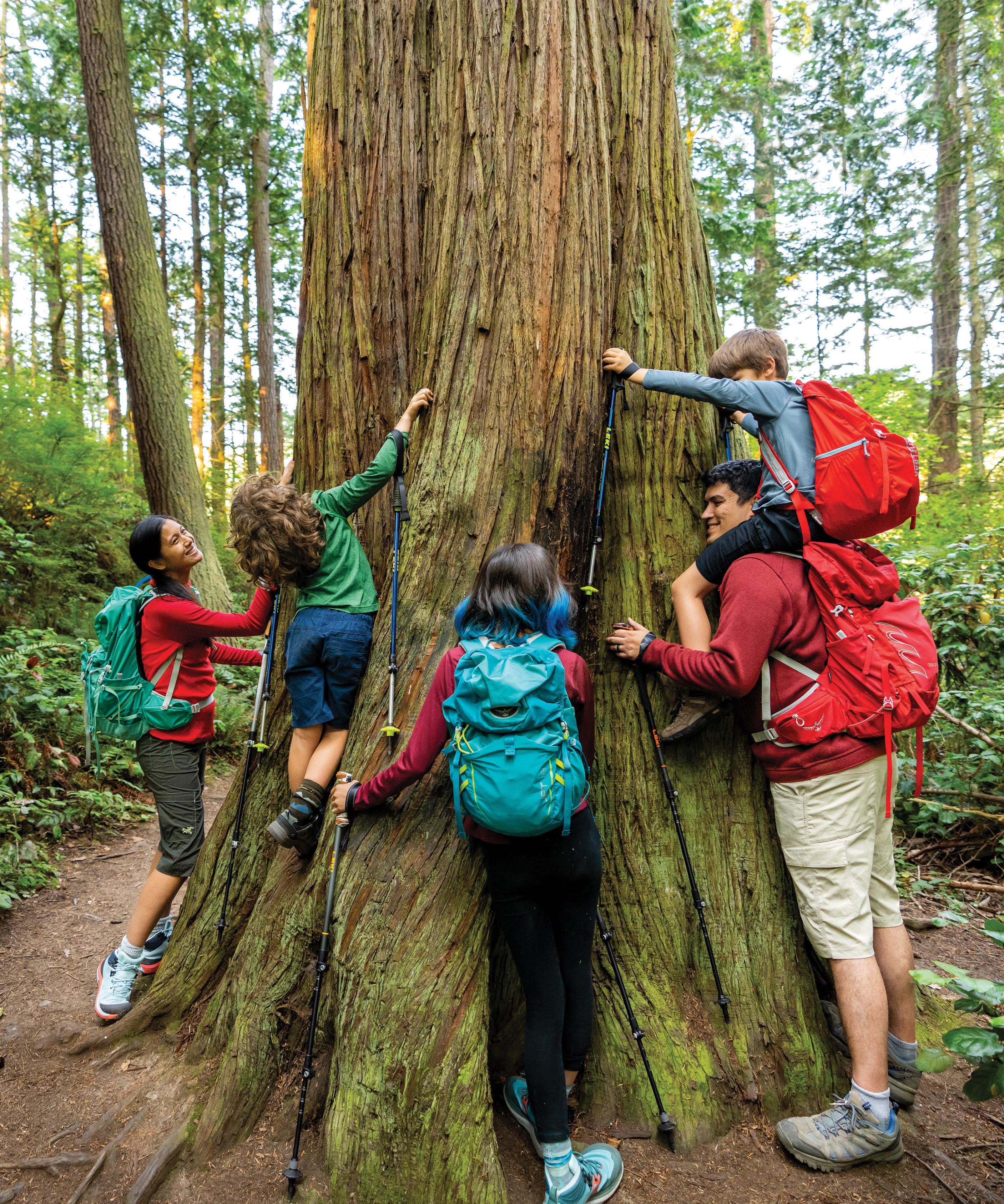
Its new BioSync suspension system features an elasticized shoulder harness and hip belt that offer a unique body-hugging feel. These crucial pack parts stretch and flex as you move, making for a dynamic and comfortable carry.
Moreover, the contour foam backpanel is easily adjustable, offering 3.5 inches of flexibility so you can dial in your ideal fit. Its cool contour foam design also allows for plenty of breathability, as does the perforated foam that makes up the shoulder harness.
Convenient features include zippered pockets on the hipbelt large enough for your phone, roomy mesh
side pockets, and an independent zippered pocket and SpeedClip hanger for your hydration reservoir.
We’re especially glad to note that by using recycled materials and a “data driven life cycle analysis tool,” Gregory has reduced the Maya 20’s carbon footprint by 26%.
Choose from a range of colors and sizes, including a plus size, which speaks to Gregory’s commitment to inclusivity in the outdoors. A men’s version – the Miko – is also available.
MSRP: $129.95 • gregorypacks.com
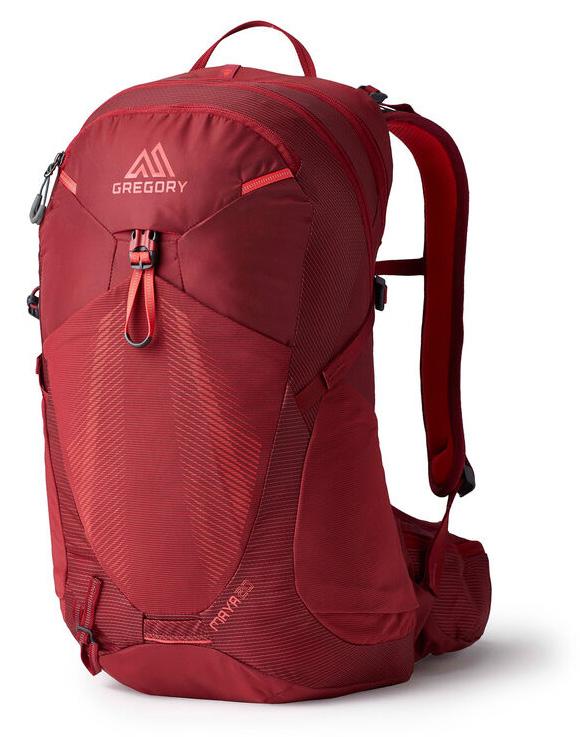
Outdoor Research hit the sweet spot jackpot with its Helium Men’s Down Jacket, which offers up the perfect balance of durability and lightness. Coming in at just 12.6 ounces (358 grams), this airy performance jacket nevertheless stands up to all the adventure you can throw at it.
Notably, this down jacket’s 41% recycled wind and water resistant shell features Diamond Fuse technology by Pertex which improves abrasion resistance and stability even over extensive wear and washing.

We love how its 800+ fill down insulation – which complies with the Responsible Down Standard (RDS) – stays protected within the shell due to this revolutionary technology. No nicks or tears = no down sneaking out!
Convenient extras include an interior stash pocket (great for gloves, sunglasses, and more); a hidden key clip in hand pocket; and an adjustable drawcord hem for a snug fit. The jacket compresses nicely for easy packing.
Choose from a variety of colors. Also available in women’s version.
MSRP: $229.00
• outdoorresearch.com

The perfect foundation for remote wild camps and nights under the stars. Our new range of sleep mats is designed to insulate you from the chill and support you on all terrain, providing all the retreat you need from bitter conditions and plummeting temperatures Packable warmth and comfort, so you can explore further
